
Donald Trump
Donald John Trump is an American politician, media personality, and businessman who served as the 45th president of the United States from 2017 to 2021.
Rioters supporting President Donald Trump attacked the U.S. Capitol, disrupting the certification of the presidential election and forcing Congress to evacuate.

Donald John Trump is an American politician, media personality, and businessman who served as the 45th president of the United States from 2017 to 2021.

On January 6, 2021, following the defeat of then-U.S. President Donald Trump in the 2020 presidential election, a mob of his supporters attacked the United States Capitol Building in Washington, D.C. The mob was seeking to keep Trump in power by preventing a joint session of Congress from counting the electoral college votes to formalize the victory of President-elect Joe Biden. According to the House select committee investigating the incident, the attack was the culmination of a seven-part plan by Trump to overturn the election. Five people died either shortly before, during, or following the event: one was shot by Capitol Police, another died of a drug overdose, and three died of natural causes. Many people were injured, including 138 police officers. Four officers who responded to the attack killed themselves within seven months. As of July 7, 2022, monetary damages caused by attackers exceed $2.7 million.

The United States Capitol, often called The Capitol or the Capitol Building, is the seat of the legislative branch of the United States federal government, which is formally known as the United States Congress. It is located on Capitol Hill at the eastern end of the National Mall in Washington, D.C. Though no longer at the geographic center of the federal district, the Capitol forms the origin point for the street-numbering system of the district as well as its four quadrants.

The count of the Electoral College ballots during a joint session of the 117th United States Congress, pursuant to the Electoral Count Act, on January 6–7, 2021, was the final step to confirm President-elect Joe Biden's victory in the 2020 presidential election over President Donald Trump.

The 2020 United States presidential election was the 59th quadrennial presidential election, held on Tuesday, November 3, 2020. The Democratic ticket of former vice president Joe Biden and the junior U.S. senator from California Kamala Harris defeated the incumbent Republican president Donald Trump and incumbent vice president Mike Pence. The election took place against the backdrop of the global COVID-19 pandemic and related recession. It was the first election since 1992 in which the incumbent president failed to win a second term. The election saw the highest voter turnout by percentage since 1900, with each of the two main tickets receiving more than 74 million votes, surpassing Barack Obama's record of 69.5 million votes from 2008. Biden received more than 81 million votes, the most votes ever cast for a candidate in a U.S. presidential election.

The United States Congress is the legislature of the federal government of the United States. It is bicameral, composed of a lower body, the House of Representatives, and an upper body, the Senate. It meets in the United States Capitol in Washington, D.C. Senators and representatives are chosen through direct election, though vacancies in the Senate may be filled by a governor's appointment. Congress has 535 voting members: 100 senators and 435 representatives. The vice president of the United States has a vote in the Senate only when senators are evenly divided. The House of Representatives has six non-voting members.
Supporters of U.S. President Donald Trump attack the United States Capitol to disrupt certification of the 2020 presidential election, resulting in five deaths and evacuation of the U.S. Congress.

Donald John Trump is an American politician, media personality, and businessman who served as the 45th president of the United States from 2017 to 2021.

On January 6, 2021, following the defeat of then-U.S. President Donald Trump in the 2020 presidential election, a mob of his supporters attacked the United States Capitol Building in Washington, D.C. The mob was seeking to keep Trump in power by preventing a joint session of Congress from counting the electoral college votes to formalize the victory of President-elect Joe Biden. According to the House select committee investigating the incident, the attack was the culmination of a seven-part plan by Trump to overturn the election. Five people died either shortly before, during, or following the event: one was shot by Capitol Police, another died of a drug overdose, and three died of natural causes. Many people were injured, including 138 police officers. Four officers who responded to the attack killed themselves within seven months. As of July 7, 2022, monetary damages caused by attackers exceed $2.7 million.

After Joe Biden won the 2020 United States presidential election, then-incumbent Donald Trump pursued an unprecedented effort to overturn the election, with support and assistance from his campaign, proxies, political allies, and many of his supporters. These efforts culminated in the January 6, 2021 United States Capitol attack by Trump supporters, which was widely described as an attempted coup d'état. One week later, Trump was impeached for incitement of insurrection but was acquitted by the Senate. In June 2022, the House Select Committee on the January 6 Attack said it has enough evidence to recommend that the U.S. Department of Justice indict Trump.

The count of the Electoral College ballots during a joint session of the 117th United States Congress, pursuant to the Electoral Count Act, on January 6–7, 2021, was the final step to confirm President-elect Joe Biden's victory in the 2020 presidential election over President Donald Trump.

The 2020 United States presidential election was the 59th quadrennial presidential election, held on Tuesday, November 3, 2020. The Democratic ticket of former vice president Joe Biden and the junior U.S. senator from California Kamala Harris defeated the incumbent Republican president Donald Trump and incumbent vice president Mike Pence. The election took place against the backdrop of the global COVID-19 pandemic and related recession. It was the first election since 1992 in which the incumbent president failed to win a second term. The election saw the highest voter turnout by percentage since 1900, with each of the two main tickets receiving more than 74 million votes, surpassing Barack Obama's record of 69.5 million votes from 2008. Biden received more than 81 million votes, the most votes ever cast for a candidate in a U.S. presidential election.

The United States Congress is the legislature of the federal government of the United States. It is bicameral, composed of a lower body, the House of Representatives, and an upper body, the Senate. It meets in the United States Capitol in Washington, D.C. Senators and representatives are chosen through direct election, though vacancies in the Senate may be filled by a governor's appointment. Congress has 535 voting members: 100 senators and 435 representatives. The vice president of the United States has a vote in the Senate only when senators are evenly divided. The House of Representatives has six non-voting members.
Forty people are killed in a gold mine collapse in Badakhshan province, in northern Afghanistan.

Mining in Afghanistan was controlled by the Ministry of Mines and Petroleum, prior to the August 15th takeover by the Taliban. It is headquartered in Kabul with regional offices in other parts of the country. Afghanistan has over 1,400 mineral fields, containing barite, chromite, coal, copper, gold, iron ore, lead, natural gas, petroleum, precious and semi-precious stones, salt, sulfur, lithium, talc, and zinc, among many other minerals. Gemstones include high-quality emerald, lapis lazuli, red garnet and ruby. According to a joint study by The Pentagon and the United States Geological Survey, Afghanistan has an estimated US$1 trillion of untapped minerals.

Badakhshan Province is one of the 34 provinces of Afghanistan, located in the northeastern part of the country. It is bordered by Tajikistan's Gorno-Badakhshan in the north and the Pakistani regions of Lower and Upper Chitral and Gilgit-Baltistan in the southeast. It also has a 91-kilometer (57-mile) border with China in the east.
Muhammad V of Kelantan resigns as the Yang di-Pertuan Agong of Malaysia, becoming the first monarch to do so.
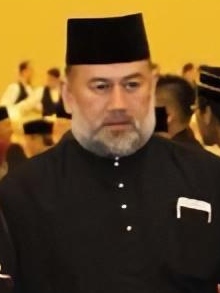
Sultan Muhammad V has reigned as the 29th Sultan of Kelantan since September 2010 and served as the 15th Yang di-Pertuan Agong of Malaysia from December 2016 to his abdication in January 2019. He was proclaimed Sultan of Kelantan on 13 September 2010, succeeding his father, Sultan Ismail Petra, who was deemed incapacitated by illness. He was proclaimed Yang di-Pertuan Agong on 13 December 2016. Sultan Muhammad V became the first Yang di-Pertuan Agong to abdicate from the federal throne, effective 6 January 2019.

The Yang di-Pertuan Agong, also known as the Supreme Head of the Federation, the Paramount Ruler or simply as the Agong, and unofficially as the King of Malaysia, is the constitutional monarch and head of state of Malaysia. The office was established in 1957, when the Federation of Malaya gained independence from the United Kingdom. The Yang di-Pertuan Agong is elected by the Conference of Rulers, comprising the nine rulers of the Malay states, with the office de facto rotated between them, making Malaysia one of the world's few elective monarchies.
Five people are killed and six others injured in a mass shooting at Fort Lauderdale–Hollywood International Airport in Broward County, Florida.
On January 6, 2017, a mass shooting occurred at Fort Lauderdale–Hollywood International Airport in Broward County, Florida, United States, near the baggage claim in Terminal 2. Five people were killed while six others were injured in the shooting. About 36 people sustained injuries in the ensuing panic. Esteban Santiago-Ruiz, who committed the shooting, was taken into custody within several minutes after he started shooting, surrendering to responding sheriff's deputies. The shooting from start to finish lasted 70–80 seconds. Santiago was later diagnosed with schizophrenia and pleaded guilty to avoid possible execution.

Fort Lauderdale–Hollywood International Airport is a major public airport in Broward County, Florida, United States. It is one of three airports serving the Miami metropolitan area. The airport is off Interstate 595, Interstate 95, U.S. Route 1, Florida State Road A1A, and Florida State Road 5 bounded by the cities Fort Lauderdale, Hollywood, and Dania Beach, 3 miles (5 km) southwest of downtown Fort Lauderdale and 21 miles (34 km) north of Miami.

Broward County is a county in the U.S. state of Florida, located in the Miami metropolitan area. It is Florida's second-most populous county after Miami-Dade County and the 17th-most populous in the United States, with over 1.94 million residents as of the 2020 census. Its county seat and largest city is Fort Lauderdale, which had a population of 182,760 as of 2020.
Twenty-six people are killed and 63 wounded when a suicide bomber blows himself up at a police station in Damascus.
On 6 January 2012, a bomb exploded in the Al-Midan district of Damascus, Syria. According to the Syrian government, a suicide bomber attacked buses carrying riot police shortly before an anti-government protest was to begin. It said that 26 people were killed and over 60 were injured. Most of the victims were civilians, though the Syrian government showed footage of what it claimed to be the funeral of 11 police officers killed in the attack.

Damascus is the capital of Syria, the oldest capital in the world and, according to some, the fourth holiest city in Islam. Colloquially known in Syria as aš-Šām and titled the "City of Jasmine", Damascus is a major cultural center of the Levant and the Arab world. The city had an estimated population of 2,503,000 in 2022.
American Civil Rights Movement: Edgar Ray Killen is indicted for the 1964 murders of Chaney, Goodman, and Schwerner.

The civil rights movement was a political movement and campaign from 1954 to 1968 in the United States to abolish institutional racial segregation, discrimination, and disenfranchisement throughout the United States. The movement had its origins in the Reconstruction era during the late 19th century, although it made its largest legislative gains in the 1960s after years of direct actions and grassroots protests. The social movement's major nonviolent resistance and civil disobedience campaigns eventually secured new protections in federal law for the civil rights of all Americans.

Edgar Ray Killen was an American Ku Klux Klan organizer who planned and directed the murders of James Chaney, Andrew Goodman, and Michael Schwerner, three civil rights activists participating in the Freedom Summer of 1964. He was found guilty in state court of three counts of manslaughter on June 21, 2005, the forty-first anniversary of the crime, and sentenced to 60 years in prison. He appealed the verdict, but the sentence was upheld on April 12, 2007, by the Supreme Court of Mississippi. He died in prison on January 11, 2018, six days before his 93rd birthday.

The murders of Chaney, Goodman, and Schwerner, also known as the Freedom Summer murders, the Mississippi civil rights workers' murders, or the Mississippi Burning murders, refers to events in which three activists were abducted and murdered in the city of Philadelphia, Mississippi, in June 1964 during the Civil Rights Movement. The victims were James Chaney from Meridian, Mississippi, and Andrew Goodman and Michael Schwerner from New York City. All three were associated with the Council of Federated Organizations (COFO) and its member organization, the Congress of Racial Equality (CORE). They had been working with the Freedom Summer campaign by attempting to register African Americans in Mississippi to vote. Since 1890 and through the turn of the century, southern states had systematically disenfranchised most black voters by discrimination in voter registration and voting.
A train collision in Graniteville, South Carolina, United States, releases about 60 tons of chlorine gas.

The Graniteville train crash was an American rail disaster that occurred on January 6, 2005, in Graniteville, South Carolina. At roughly 2:40 am EST, two Norfolk Southern trains collided near the Avondale Mills plant in Graniteville. Nine people were killed and over 250 people were treated for toxic chlorine exposure. The accident was determined to be caused by a misaligned railroad switch.

Graniteville is a census-designated place (CDP) in Aiken County, South Carolina, United States. The population was 2,614 at the 2010 census. It lies along U.S. Route 1, five miles (8.0 km) west of Aiken in Horse Creek Valley, which originates in the nearby town of Vaucluse.

Chlorine is a chemical element with the symbol Cl and atomic number 17. The second-lightest of the halogens, it appears between fluorine and bromine in the periodic table and its properties are mostly intermediate between them. Chlorine is a yellow-green gas at room temperature. It is an extremely reactive element and a strong oxidising agent: among the elements, it has the highest electron affinity and the third-highest electronegativity on the revised Pauling scale, behind only oxygen and fluorine.
The last natural Pyrenean ibex, Celia, is killed by a falling tree, thus making the species extinct.
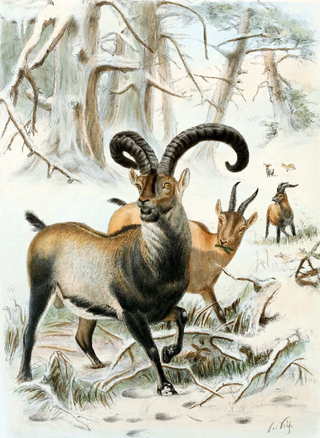
The Pyrenean ibex, Aragonese and Spanish common name bucardo, Basque common name bukardo, Catalan common name herc and French common name bouquetin, was one of the four subspecies of the Iberian ibex or Iberian wild goat, a species endemic to the Pyrenees. Pyrenean ibex were most common in the Cantabrian Mountains, Southern France, and the northern Pyrenees. This species was common during the Holocene and Upper Pleistocene, during which their morphology, primarily some skulls, of the Pyrenean ibex was found to be larger than other Capra subspecies in southwestern Europe from the same time.
A chemical fire in an apartment complex in Manila, Philippines, leads to the discovery of plans for Project Bojinka, a mass-terrorist attack.

Manila, known officially as the City of Manila, is the capital of the Philippines, and its second-most populous city. It is highly urbanized and as of 2019 was the world's most densely populated city proper. Manila is considered to be a global city and rated as an Alpha – City by Globalization and World Cities Research Network (GaWC). It was the first chartered city in the country, designated as such by the Philippine Commission Act 183 of July 31, 1901. It became autonomous with the passage of Republic Act No. 409, "The Revised Charter of the City of Manila", on June 18, 1949. Manila is considered to be part of the world's original set of global cities because its commercial networks were the first to extend across the Pacific Ocean and connect Asia with the Spanish Americas through the galleon trade; when this was accomplished, it marked the first time in world history that an uninterrupted chain of trade routes circling the planet had been established. It is among the most populous and fastest growing cities in Southeast Asia.
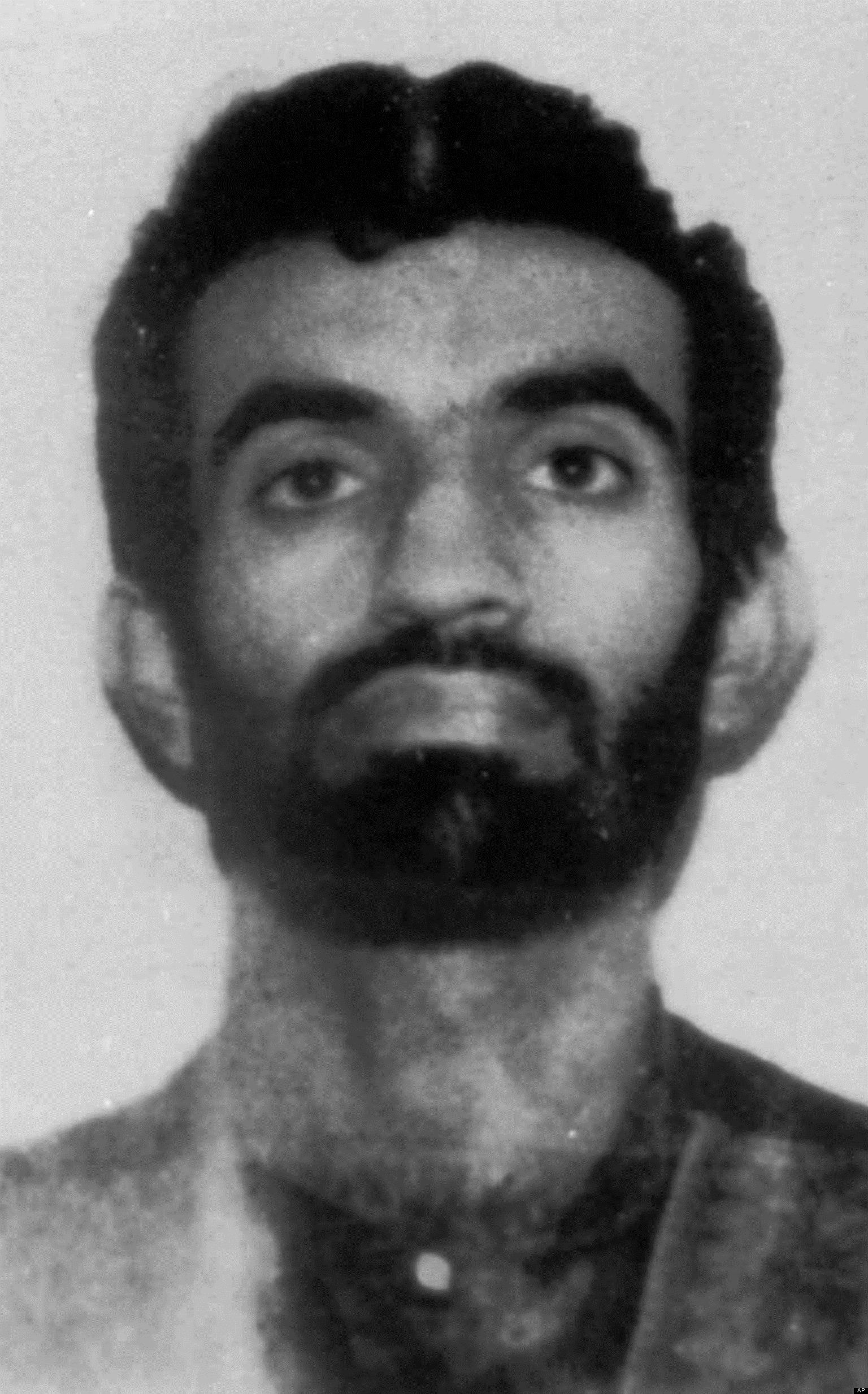
The Bojinka plot was a large-scale, three-phase terrorist attack planned by Ramzi Yousef and Khalid Sheikh Mohammed for January 1995. They planned to assassinate Pope John Paul II; blow up 11 airliners in flight from Asia to the United States with the goal of killing approximately 4,000 passengers and shutting down air travel around the world; and crash a plane into the headquarters of the United States Central Intelligence Agency (CIA) in Fairfax County, Virginia.
Two-time American Olympic figure-skating medalist Nancy Kerrigan was hit on the leg with a police baton by an assailant hired by the ex-husband of her rival Tonya Harding.

Figure skating is a sport in which individuals, pairs, or groups perform on figure skates on ice. It was the first winter sport to be included in the Olympic Games, when contested at the 1908 Olympics in London. The Olympic disciplines are men's singles, women's singles, pair skating, and ice dance; the four individual disciplines are also combined into a team event, first included in the Winter Olympics in 2014. The non-Olympic disciplines include synchronized skating, Theater on Ice, and four skating. From intermediate through senior-level competition, skaters generally perform two programs, which, depending on the discipline, may include spins, jumps, moves in the field, lifts, throw jumps, death spirals, and other elements or moves.

Nancy Ann Kerrigan is an American figure skater and actress. She won bronze medals at the 1991 World Championships and the 1992 Winter Olympics, silver medals at the 1992 World Championships and the 1994 Winter Olympics, as well as the 1993 US National Figure Skating Championship. Kerrigan was inducted into the United States Figure Skating Hall of Fame in 2004.
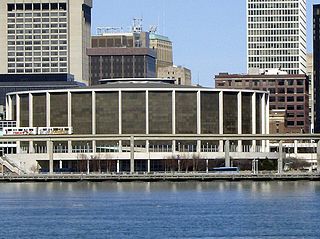
On January 6, 1994, Nancy Kerrigan, an American figure skater, was struck on the lower right thigh with a telescopic baton by assailant Shane Stant as she walked down a corridor in Cobo Arena in Detroit, Michigan. Kerrigan had been practicing skating on an ice rink in the arena shortly beforehand.

Tonya Maxene Price is an American former figure skater, retired boxer and a reality television personality. Born in Portland, Oregon, Harding was raised primarily by her mother, who enrolled her in ice skating lessons beginning at three years old. Harding spent much of her early life training, eventually dropping out of high school to devote her time to the sport. After climbing the ranks in the U.S. Figure Skating Championships between 1986 and 1989, Harding won the 1989 Skate America competition. She became the 1991 and 1994 U.S. champion before being stripped of her 1994 title, and 1991 World silver medalist. In 1991, she became the first American woman and the second woman in history to successfully land a triple Axel in competition. Harding is a two-time Olympian and a two-time Skate America Champion.
American figure skater Nancy Kerrigan is attacked and injured by an assailant hired by her rival Tonya Harding's ex-husband during the U.S. Figure Skating Championships.

Nancy Ann Kerrigan is an American figure skater and actress. She won bronze medals at the 1991 World Championships and the 1992 Winter Olympics, silver medals at the 1992 World Championships and the 1994 Winter Olympics, as well as the 1993 US National Figure Skating Championship. Kerrigan was inducted into the United States Figure Skating Hall of Fame in 2004.

On January 6, 1994, Nancy Kerrigan, an American figure skater, was struck on the lower right thigh with a telescopic baton by assailant Shane Stant as she walked down a corridor in Cobo Arena in Detroit, Michigan. Kerrigan had been practicing skating on an ice rink in the arena shortly beforehand.

Tonya Maxene Price is an American former figure skater, retired boxer and a reality television personality. Born in Portland, Oregon, Harding was raised primarily by her mother, who enrolled her in ice skating lessons beginning at three years old. Harding spent much of her early life training, eventually dropping out of high school to devote her time to the sport. After climbing the ranks in the U.S. Figure Skating Championships between 1986 and 1989, Harding won the 1989 Skate America competition. She became the 1991 and 1994 U.S. champion before being stripped of her 1994 title, and 1991 World silver medalist. In 1991, she became the first American woman and the second woman in history to successfully land a triple Axel in competition. Harding is a two-time Olympian and a two-time Skate America Champion.
The 1994 U.S. Figure Skating Championships were held at the Joe Louis Arena in Detroit, Michigan. Medals were awarded in four colors: gold (first), silver (second), bronze (third), and pewter (fourth) in four disciplines – men's singles, ladies' singles, pair skating, and ice dancing – across three levels: senior, junior, and novice. The event was used to determine the U.S. teams for the 1994 Winter Olympics and the 1994 World Championships.
Indian Border Security Force units kill 55 Kashmiri civilians in Sopore, Jammu and Kashmir, in revenge after militants ambushed a BSF patrol.

The Border Security Force (BSF) is India's border guarding organisation on its border with Pakistan and Bangladesh. It is one of the seven Central Armed Police Forces (CAPF) of India, and was raised in the wake of the 1965 war on 1 December 1965, "for ensuring the security of the borders of India and for matters connected there with".
The Sopore massacre refers to the killing of at least 43 civilians by the Indian Border Security Force (BSF) who were travelling on a bus from Bandipur to Sopore in Kashmir on 6 January 1993.
Sopore, known as Suyyapur in antiquity, is a city in the Baramulla district of Jammu and Kashmir, India. It is 45 km (28 mi) north-west of Srinagar, and 16 km (10 mi) north-east from the city of Baramulla.

Jammu and Kashmir was a region formerly administered by India as a state from 1952 to 2019, constituting the southern and southeastern portion of the larger Kashmir region, which has been the subject of a dispute between India, Pakistan and China since the mid-20th century. The underlying region of this state were parts of the former princely state of Jammu and Kashmir, whose western districts, now known as Azad Kashmir, and northern territories, now known as Gilgit-Baltistan, are administered by Pakistan. The Aksai Chin region in the east, bordering Tibet, has been under Chinese control since 1962.
Four people are killed when Lufthansa CityLine Flight 5634 crashes on approach to Charles de Gaulle Airport in Roissy-en-France, France.

On 6 January 1993, Lufthansa CityLine Flight 5634 departed Bremen Airport for Paris-Charles de Gaulle Airport at 17:30. Operating the flight was a Dash 8-300, registered D-BEAT with 23 passengers and crew.

Paris Charles de Gaulle Airport or Roissy Airport, is the principal airport serving the French capital, Paris, and the largest international airport in France. Opened in 1974, it is in Roissy-en-France, 23 km (14 mi) northeast of Paris and is named after statesperson Charles de Gaulle (1890–1970).

Roissy-en-France is a commune in the northeastern suburbs of Paris, France, in the Val-d'Oise department. It is located 20.7 km (12.9 mi) from the centre of Paris. In 2017, it had a population of 2,883.

France, officially the French Republic, is a transcontinental country predominantly located in Western Europe and spanning overseas regions and territories in the Americas and the Atlantic, Pacific and Indian Oceans. Its metropolitan area extends from the Rhine to the Atlantic Ocean and from the Mediterranean Sea to the English Channel and the North Sea; overseas territories include French Guiana in South America, Saint Pierre and Miquelon in the North Atlantic, the French West Indies, and many islands in Oceania and the Indian Ocean. Due to its several coastal territories, France has the largest exclusive economic zone in the world. France borders Belgium, Luxembourg, Germany, Switzerland, Monaco, Italy, Andorra, and Spain in continental Europe, as well as the Netherlands, Suriname, and Brazil in the Americas via its overseas territories in French Guiana and Saint Martin. Its eighteen integral regions span a combined area of 643,801 km2 (248,573 sq mi) and contain close to 68 million people. France is a unitary semi-presidential republic with its capital in Paris, the country's largest city and main cultural and commercial centre; other major urban areas include Marseille, Lyon, Toulouse, Lille, Bordeaux, and Nice.
President of Georgia Zviad Gamsakhurdia flees the country as a result of the military coup.

The president of Georgia is the ceremonial head of state of Georgia as well as the commander-in-chief of the Defense Forces. The constitution defines the presidential office as "the guarantor of the country’s unity and national independence."

Zviad Konstantines dze Gamsakhurdia was a Georgian politician, dissident, scholar, and writer who became the first democratically elected President of Georgia in the post-Soviet era.

The 1991–1992 Georgian coup d'état, also known as the Tbilisi War, or the Putsch of 1991–1992, was an internal military conflict that took place in the newly independent Republic of Georgia following the fall of the Soviet Union, from 22 December 1991 to 6 January 1992. The coup, which triggered the Georgian Civil War, pitted factions of the National Guard loyal to President Zviad Gamsakhurdia against several paramilitary organizations unified at the end of 1991 under the leadership of warlords Tengiz Kitovani, Jaba Ioseliani and Tengiz Sigua.
Satwant Singh and Kehar Singh are sentenced to death for conspiracy in the assassination of Prime Minister Indira Gandhi; the two men are executed the same day.
Satwant Singh was one of the bodyguards, along with Beant Singh, who assassinated the Prime Minister of India, Indira Gandhi, at her New Delhi residence on 31 October 1984.
Kehar Singh was an Assistant in the erstwhile Directorate General of Supply and Disposal, New Delhi, and was tried and executed for conspiracy in the plot of the Indira Gandhi assassination, carried out by Satwant Singh and Beant Singh. He was hanged in Tihar Jail on 6 January 1989. Beant Singh was the nephew of Kehar Singh. The assassination was "motivated" by Operation Blue Star.

Indian Prime Minister Indira Gandhi was assassinated at 9:30 a.m. on 31 October 1984 at her residence in Safdarjung Road, New Delhi. She was killed by her bodyguards Satwant Singh and Beant Singh in the aftermath of Operation Blue Star, an Indian military action carried out between 1 and 8 June 1984 ordered by Indira Gandhi to remove Jarnail Singh Bhindranwale and his followers from the Golden Temple of Harmandir Sahib in Amritsar, Punjab. The collateral damage included the death of many pilgrims, as well as damage to the Akal Takht. The military action on the sacred temple was criticized both inside and outside India.
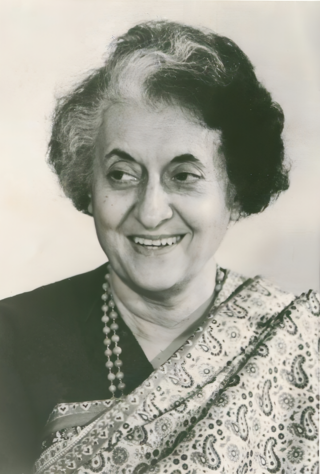
Indira Priyadarshini Gandhi was an Indian politician and a central figure of the Indian National Congress. She was elected as third prime minister of India in 1966 and was also the first and, to date, only female prime minister of India. Gandhi was the daughter of Jawaharlal Nehru, the first prime minister of India. She served as prime minister from January 1966 to March 1977 and again from January 1980 until her assassination in October 1984, making her the second longest-serving Indian prime minister after her father.
In response to the 1973 oil crisis, daylight saving time commences nearly four months early in the United States.

The 1973 oil crisis or first oil crisis began in October 1973 when the members of the Organization of Arab Petroleum Exporting Countries (OAPEC), led by Saudi Arabia, proclaimed an oil embargo. The embargo was targeted at nations that had supported Israel during the Yom Kippur War. The initial nations targeted were Canada, Japan, the Netherlands, the United Kingdom and the United States, though the embargo also later extended to Portugal, Rhodesia and South Africa. By the end of the embargo in March 1974, the price of oil had risen nearly 300%, from US$3 per barrel ($19/m3) to nearly $12 per barrel ($75/m3) globally; US prices were significantly higher. The embargo caused an oil crisis, or "shock", with many short- and long-term effects on global politics and the global economy. It was later called the "first oil shock", followed by the 1979 oil crisis, termed the "second oil shock".
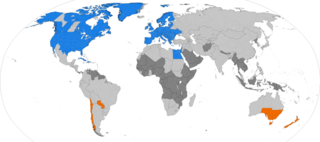
Daylight saving time (DST), also referred to as daylight savings time or simply daylight time, and summer time, is the practice of advancing clocks during warmer months so that darkness falls at a later clock time. The typical implementation of DST is to set clocks forward by one hour in the spring, and to set clocks back by one hour in the fall to return to standard time. As a result, there is one 23-hour day in late winter or early spring and one 25-hour day in autumn.
Vietnam War: United States Marine Corps and ARVN troops launch "Operation Deckhouse Five" in the Mekong River delta.

The Vietnam War was a conflict in Vietnam, Laos, and Cambodia from 1 November 1955 to the fall of Saigon on 30 April 1975. It was the second of the Indochina Wars and was officially fought between North Vietnam and South Vietnam. The north was supported by the Soviet Union, China, and other communist states, while the south was supported by the United States and other anti-communist allies. The war is widely considered to be a Cold War-era proxy war. It lasted almost 20 years, with direct U.S. involvement ending in 1973. The conflict also spilled over into neighboring states, exacerbating the Laotian Civil War and the Cambodian Civil War, which ended with all three countries becoming communist states by 1975.

The United States Marine Corps (USMC), also referred to as the United States Marines, is the maritime land force service branch of the United States Armed Forces responsible for conducting expeditionary and amphibious operations through combined arms, implementing its own infantry, artillery, aerial, and special operations forces. The U.S. Marine Corps is one of the eight uniformed services of the United States.

The Army of the Republic of Vietnam composed the ground forces of the South Vietnamese military from its inception in 1955 to the Fall of Saigon in April 1975. It is estimated to have suffered 1,394,000 casualties during the Vietnam War.

Operation Deckhouse Five was a United States Marine Corps (USMC) and Republic of Vietnam Marine Corps operation that took place from 6–15 January 1967 in the Mekong Delta, during the Vietnam War. "The ten-day sweep," reported the AP from its daily military roundup from Saigon, "proved unproductive."

The Mekong or Mekong River is a trans-boundary river in East Asia and Southeast Asia. It is the world's twelfth longest river and the third longest in Asia. Its estimated length is 4,909 km (3,050 mi), and it drains an area of 795,000 km2 (307,000 sq mi), discharging 475 km3 (114 cu mi) of water annually. From the Tibetan Plateau the river runs through China, Myanmar, Laos, Thailand, Cambodia, and Vietnam. The extreme seasonal variations in flow and the presence of rapids and waterfalls in the Mekong make navigation difficult. Even so, the river is a major trade route between western China and Southeast Asia.
National Airlines Flight 2511, traveling from New York City to Miami, exploded in mid-air due to a bomb placed by an unknown party, resulting in the deaths of all 34 people on board.

National Airlines Flight 2511 was a United States domestic passenger flight from New York City to Miami, Florida. On January 6, 1960, the Douglas DC-6 serving the flight exploded in midair. The National Airlines aircraft was carrying 5 crew members and 29 passengers, all of whom perished. The Civil Aeronautics Board investigation concluded that the plane was brought down by a bomb made of dynamite. No criminal charges were ever filed, nor was the blame for the bombing ever determined, though a suicide bombing is suspected. The investigation remains open.
National Airlines Flight 2511 is destroyed in mid-air by a bomb, while en route from New York City to Miami.

National Airlines Flight 2511 was a United States domestic passenger flight from New York City to Miami, Florida. On January 6, 1960, the Douglas DC-6 serving the flight exploded in midair. The National Airlines aircraft was carrying 5 crew members and 29 passengers, all of whom perished. The Civil Aeronautics Board investigation concluded that the plane was brought down by a bomb made of dynamite. No criminal charges were ever filed, nor was the blame for the bombing ever determined, though a suicide bombing is suspected. The investigation remains open.

Miami, officially the City of Miami, known as "the 305", "The Magic City", and "Gateway to the Americas", is a coastal metropolis and the county seat of Miami-Dade County in South Florida, United States. With a population of 442,241 as of the 2020 census, it is the second-most populous city in Florida and the eleventh-most populous city in the Southeastern United States. The Miami metropolitan area is the ninth largest in the U.S. with a population of 6.138 million people as of 2020. The city has the third-largest skyline in the U.S. with over 300 high-rises, 58 of which exceed 491 ft (150 m).
The Associations Law comes into force in Iraq, allowing registration of political parties.
The Associations Law was a law in Iraq, which legally regulated political parties. The law was promulgated on 1 January 1960. Prior to the adoption of this law, political parties had been banned since 1954. The law came into force on 6 January 1960.

Iraq, officially the Republic of Iraq, is a country in Western Asia. It is bordered by Turkey to the north, Iran to the east, the Persian Gulf and Kuwait to the southeast, Saudi Arabia to the south, Jordan to the southwest and Syria to the west. The capital and largest city is Baghdad. Iraq is home to diverse ethnic groups including Iraqi Arabs, Kurds, Turkmens, Assyrians, Armenians, Yazidis, Mandaeans, Persians and Shabakis with similarly diverse geography and wildlife. The vast majority of the country's 44 million residents are Muslims – the notable other faiths are Christianity, Yazidism, Mandaeism, Yarsanism and Zoroastrianism. The official languages of Iraq are Arabic and Kurdish; others also recognised in specific regions are Neo-Aramaic, Turkish and Armenian.
The first Asian Socialist Conference, an organisation of socialist political parties in Asia, opened in Rangoon with 177 delegates, observers and fraternal guests.
The Asian Socialist Conference (ASC) was an organisation of socialist political parties in Asia that existed between 1953 and 1965. It was established in an effort to build an Pan-Asian multinational socialist organization, clearly independent from earlier European colonial centers, yet free from the new superpowers of the Cold War. Until 1963 its headquarters was in Rangoon, Burma; the first chairman and treasurer of the conference were the Burmese socialist leaders Ba Swe and Kyaw Nyein respectively. As of 1956, the member parties of ASC had a combined membership of about 500,000. In total, four Asian Socialist Conferences convened: Rangoon, 1953 and 1954, and Bombay, 1956 and 1965.
Socialism is a left-wing economic philosophy and movement encompassing a range of economic systems characterized by the dominance of social ownership of the means of production as opposed to private ownership. As a term, it describes the economic, political and social theories and movements associated with the implementation of such systems. Social ownership can be state/public, community, collective, cooperative, or employee. While no single definition encapsulates the many types of socialism, social ownership is the one common element. Different types of socialism vary based on the role of markets and planning in resource allocation, on the structure of management in organizations, and from below or from above approaches, with some socialists favouring a party, state, or technocratic-driven approach. Socialists disagree on whether government, particularly existing government, is the correct vehicle for change.

Yangon, formerly known as Rangoon, is the capital of the Yangon Region and the largest city of Myanmar. Yangon served as the capital of Myanmar until 2006, when the military government relocated the administrative functions to the purpose-built capital city of Naypyidaw in north central Myanmar. With over 7 million people, Yangon is Myanmar's most populous city and its most important commercial centre.
Korean War: Beginning of the Ganghwa massacre, in the course of which an estimated 200–1,300 South Korean communist sympathizers are slaughtered.

The Korean War was fought between North Korea and South Korea from 1950 to 1953. The war began on 25 June 1950 when North Korea invaded South Korea following clashes along the border and rebellions in South Korea. North Korea was supported by China and the Soviet Union while South Korea was supported by the United States and allied countries. The fighting ended with an armistice on 27 July 1953.
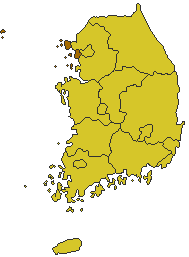
The Ganghwa massacre was a massacre conducted by the South Korean forces, South Korean Police forces and pro-South Korean militiamen, between 6 and 9 January 1951, of 212 to 1,300 unarmed civilians in the Ganghwa county of the Incheon metropolitan city in South Korea. The victims were collaborators with the Korean People's Army during North Korean rule. Before this massacre, 140 people were executed in Ganghwa as part of the Bodo League massacre in 1950.
The United Kingdom recognizes the People's Republic of China. The Republic of China severs diplomatic relations with the UK in response.

China, officially the People's Republic of China (PRC), is a country in East Asia. It is the world's most populous country, with a population exceeding 1.4 billion, slightly ahead of India. China spans the equivalent of five time zones and borders fourteen countries by land, the most of any country in the world, tied with Russia. China also has a narrow maritime boundary with the disputed Taiwan. Covering an area of approximately 9.6 million square kilometers (3,700,000 sq mi), it is the world's third largest country by total land area. The country consists of 22 provinces, five autonomous regions, four municipalities, and two Special Administrative Regions. The national capital is Beijing, and the most populous city and financial center is Shanghai.

Taiwan, officially the Republic of China (ROC), is a country in East Asia, at the junction of the East and South China Seas in the northwestern Pacific Ocean, with the People's Republic of China (PRC) to the northwest, Japan to the northeast, and the Philippines to the south. The territories controlled by the ROC consist of 168 islands, with a combined area of 36,193 square kilometres (13,974 sq mi). The main island of Taiwan, also known as Formosa, has an area of 35,808 square kilometres (13,826 sq mi), with mountain ranges dominating the eastern two-thirds and plains in the western third, where its highly urbanised population is concentrated. The capital, Taipei, forms along with New Taipei City and Keelung the largest metropolitan area of Taiwan. Other major cities include Taoyuan, Taichung, Tainan, and Kaohsiung. With around 23.9 million inhabitants, Taiwan is among the most densely populated countries in the world.
Pan American Airlines becomes the first commercial airline to offer a round-the-world ticket.

Pan American World Airways, originally founded as Pan American Airways and commonly known as Pan Am, was an American airline that was the principal and largest international air carrier and unofficial overseas flag carrier of the United States for much of the 20th century. It was the first airline to fly worldwide and pioneered numerous innovations of the modern airline industry such as jumbo jets, and computerized reservation systems. Until its dissolution in 1991, Pan Am "epitomized the luxury and glamour of intercontinental travel", and it remains a cultural icon of the 20th century, identified by its blue globe logo, the use of the word "Clipper" in its aircraft names and call signs, and the white uniform caps of its pilots.

A round-the-world ticket is a product that enables travellers to fly around the world for a relatively low price. RTW tickets in the past were generally offered through marketing agreements between airlines on several continents. Now, they are almost universally offered by airline alliances such as SkyTeam, Star Alliance and Oneworld, or by specialist travel agencies that will spend time customizing a trip for the consumer. Prices vary but are generally in the range of 2,500–6,000 USD for an economy class ticket and 5,000–14,000 USD for business class. Sometimes, depending on airline and stops, it can be as low as 1171 GBP. An alternative for a round-the-world ticket is a continent pass.
The first general election ever in Vietnam is held.

National Assembly elections were held in areas controlled by North Vietnam on 6 January 1946. Held under the 1946 constitution, they resulted in a victory for the Communist-led Việt Minh, which won 182 of the 302 seats, although the distribution of seats between parties had been decided before the elections. The ballot was not secret, and ballot papers were filled out in the presence of aides who were "to help comrades who had difficulty in making out their ballots."

Vietnam or Viet Nam, officially the Socialist Republic of Vietnam, is a country in Southeast Asia, at the eastern edge of mainland Southeast Asia, with an area of 311,699 square kilometres (120,348 sq mi) and population of 96 million, making it the world's fifteenth-most populous country. Vietnam borders China to the north, and Laos and Cambodia to the west. It shares maritime borders with Thailand through the Gulf of Thailand, and the Philippines, Indonesia, and Malaysia through the South China Sea. Its capital is Hanoi and largest city Ho Chi Minh City
During his State of the Union address, U.S. president Franklin D. Roosevelt presented his Four Freedoms as fundamental freedoms that all people ought to enjoy.

The State of the Union Address is an annual message delivered by the president of the United States to a joint session of the United States Congress near the beginning of each calendar year on the current condition of the nation. The State of the Union Address generally includes reports on the nation's budget, economy, news, agenda, achievements and the president's priorities and legislative proposals.
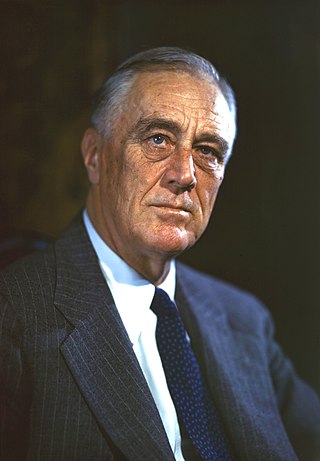
Franklin Delano Roosevelt, often referred to by his initials FDR, was an American politician and attorney who served as the 32nd president of the United States from 1933 until his death in 1945. As the leader of the Democratic Party, he won a record four presidential elections and became a central figure in world events during the first half of the 20th century. Roosevelt directed the federal government during most of the Great Depression, implementing his New Deal domestic agenda in response to the worst economic crisis in U.S. history. He built the New Deal Coalition, which defined modern liberalism in the United States throughout the middle third of the 20th century. His third and fourth terms were dominated by World War II, which ended in victory shortly after he died in office.

The Four Freedoms were goals articulated by U.S. President Franklin D. Roosevelt on Monday, January 6, 1941. In an address known as the Four Freedoms speech, he proposed four fundamental freedoms that people "everywhere in the world" ought to enjoy:Freedom of speech Freedom of worship Freedom from want Freedom from fear
Political freedom is a central concept in history and political thought and one of the most important features of democratic societies. Political freedom was described as freedom from oppression or coercion, the absence of disabling conditions for an individual and the fulfillment of enabling conditions, or the absence of life conditions of compulsion, e.g. economic compulsion, in a society. Although political freedom is often interpreted negatively as the freedom from unreasonable external constraints on action, it can also refer to the positive exercise of rights, capacities and possibilities for action and the exercise of social or group rights. The concept can also include freedom from internal constraints on political action or speech. The concept of political freedom is closely connected with the concepts of civil liberties and human rights, which in democratic societies are usually afforded legal protection from the state.
United States President Franklin D. Roosevelt delivers his Four Freedoms speech in the State of the Union address.

Franklin Delano Roosevelt, often referred to by his initials FDR, was an American politician and attorney who served as the 32nd president of the United States from 1933 until his death in 1945. As the leader of the Democratic Party, he won a record four presidential elections and became a central figure in world events during the first half of the 20th century. Roosevelt directed the federal government during most of the Great Depression, implementing his New Deal domestic agenda in response to the worst economic crisis in U.S. history. He built the New Deal Coalition, which defined modern liberalism in the United States throughout the middle third of the 20th century. His third and fourth terms were dominated by World War II, which ended in victory shortly after he died in office.

The Four Freedoms were goals articulated by U.S. President Franklin D. Roosevelt on Monday, January 6, 1941. In an address known as the Four Freedoms speech, he proposed four fundamental freedoms that people "everywhere in the world" ought to enjoy:Freedom of speech Freedom of worship Freedom from want Freedom from fear

The State of the Union Address is an annual message delivered by the president of the United States to a joint session of the United States Congress near the beginning of each calendar year on the current condition of the nation. The State of the Union Address generally includes reports on the nation's budget, economy, news, agenda, achievements and the president's priorities and legislative proposals.
Clessie Cummins arrives at the National Automobile Show in New York City, having driven a car powered by one of his diesel engines from Indianapolis.
Clessie Lyle Cummins was the founder of the Cummins Engine Co. He was an entrepreneur who improved on existing diesel engines, created new diesel engine designs, was awarded 33 United States patents for his inventions, and set five world records for endurance and speed for trucks, buses and race cars.
King Alexander of the Serbs, Croats and Slovenes suspends his country's constitution (the January 6th Dictatorship).
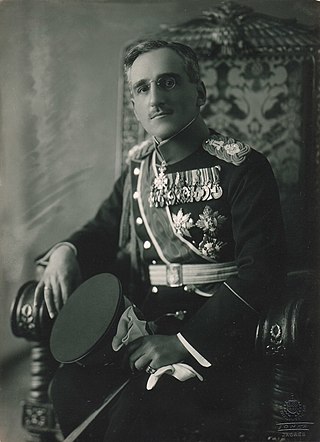
Alexander I, also known as Alexander the Unifier, was the prince regent of the Kingdom of Serbia from 1914 and later the King of Yugoslavia from 1921 to 1934. He was assassinated by the Bulgarian Vlado Chernozemski of the Internal Macedonian Revolutionary Organization, during a 1934 state visit to France. Having sat on the throne for 13 years, he is the longest-reigning monarch of the Kingdom of Yugoslavia.

The Kingdom of Yugoslavia was a state in Southeast and Central Europe that existed from 1918 until 1941. From 1918 to 1929, it was officially called the Kingdom of Serbs, Croats and Slovenes, but the term "Yugoslavia" was its colloquial name due to its origins. The official name of the state was changed to "Kingdom of Yugoslavia" by King Alexander I on 3 October 1929.

The 6 January Dictatorship was a royal dictatorship established in the Kingdom of Serbs, Croats and Slovenes by King Alexander I with the ultimate goal to create a Yugoslav ideology and a single Yugoslav nation. It lasted from 6 January 1929, when the king prorogued parliament and assumed control of the state, and ended with the 1931 Yugoslav Constitution.
Mother Teresa arrives by sea in Calcutta, India, to begin her work among India's poorest and sick people.

Mary Teresa Bojaxhiu, MC, better known as Mother Teresa, was an Indian-Albanian Catholic nun who, in 1950, founded the Missionaries of Charity. Anjezë Gonxhe Bojaxhiu was born in Skopje—at the time, part of the Ottoman Empire. After eighteen years, she moved to Ireland and then to India, where she lived most of her life. Saint Teresa of Calcutta was canonised on 4 September 2016. The anniversary of her death is her feast day.

Kolkata is the capital of the Indian state of West Bengal, on the eastern bank of the Hooghly River 80 km (50 mi) west of the border with Bangladesh. It is the primary business, commercial, and financial hub of Eastern India and the main port of communication for North-East India. According to the 2011 Indian census, Kolkata is the seventh-most populous city in India, with a population of 45 lakh (4.5 million) residents within the city limits, and a population of over 1.41 crore (14.1 million) residents in the Kolkata Metropolitan Area. It is the third-most populous metropolitan area in India. In 2021, the Kolkata metropolitan area crossed 1.5 crore (15 million) registered voters. The Port of Kolkata is India's oldest operating port and its sole major riverine port. Kolkata is regarded as the cultural capital of India. Kolkata is the second largest Bengali-speaking city after Dhaka. It has the highest number of nobel laureates among all cities in India.
German geophysicist Alfred Wegener first presented his theory of continental drift, the precursor of plate tectonics.

Alfred Lothar Wegener was a German climatologist, geologist, geophysicist, meteorologist, and polar researcher.
Continental drift is the hypothesis that the Earth's continents have moved over geologic time relative to each other, thus appearing to have "drifted" across the ocean bed. The idea of continental drift has been subsumed into the science of plate tectonics, which studies the movement of the continents as they ride on plates of the Earth's lithosphere.
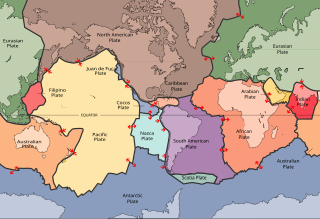
Plate tectonics is the generally accepted scientific theory that considers the Earth's lithosphere to comprise a number of large tectonic plates which have been slowly moving since about 3.4 billion years ago. The model builds on the concept of continental drift, an idea developed during the first decades of the 20th century. Plate tectonics came to be generally accepted by geoscientists after seafloor spreading was validated in the mid to late 1960s.
New Mexico is admitted to the Union as the 47th U.S. state.

New Mexico is a state in the Southwestern United States. It is one of the Mountain States of the southern Rocky Mountains, sharing the Four Corners region of the western U.S. with Utah, Colorado, and Arizona, and bordering Texas to the east and southeast, Oklahoma to the northeast, and the Mexican states of Chihuahua and Sonora to the south. The state capital is Santa Fe, which is the oldest capital in the U.S., founded in 1610 as the government seat of Nuevo México in New Spain; the largest city is Albuquerque (1706).

In the United States, a state is a constituent political entity, of which there are 50. Bound together in a political union, each state holds governmental jurisdiction over a separate and defined geographic territory where it shares its sovereignty with the federal government. Due to this shared sovereignty, Americans are citizens both of the federal republic and of the state in which they reside. State citizenship and residency are flexible, and no government approval is required to move between states, except for persons restricted by certain types of court orders.
German geophysicist Alfred Wegener first presents his theory of continental drift.

Geophysics is a subject of natural science concerned with the physical processes and physical properties of the Earth and its surrounding space environment, and the use of quantitative methods for their analysis. The term geophysics sometimes refers only to solid earth applications: Earth's shape; its gravitational and magnetic fields; its internal structure and composition; its dynamics and their surface expression in plate tectonics, the generation of magmas, volcanism and rock formation. However, modern geophysics organizations and pure scientists use a broader definition that includes the water cycle including snow and ice; fluid dynamics of the oceans and the atmosphere; electricity and magnetism in the ionosphere and magnetosphere and solar-terrestrial physics; and analogous problems associated with the Moon and other planets.

Alfred Lothar Wegener was a German climatologist, geologist, geophysicist, meteorologist, and polar researcher.
Continental drift is the hypothesis that the Earth's continents have moved over geologic time relative to each other, thus appearing to have "drifted" across the ocean bed. The idea of continental drift has been subsumed into the science of plate tectonics, which studies the movement of the continents as they ride on plates of the Earth's lithosphere.
Italian educator Maria Montessori (pictured) opened her first school and day-care centre for working-class children in Rome, employing the philosophy of education that now bears her name.

Maria Tecla Artemisia Montessori was an Italian physician and educator best known for the philosophy of education that bears her name, and her writing on scientific pedagogy. At an early age, Montessori enrolled in classes at an all-boys technical school, with hopes of becoming an engineer. She soon had a change of heart and began medical school at the Sapienza University of Rome, becoming one of the first women to attend medical school in Italy; she graduated with honors in 1896. Her educational method is in use today in many public and private schools globally.

The Montessori method of education involves children's natural interests and activities rather than formal teaching methods. A Montessori classroom places an emphasis on hands-on learning and developing real-world skills. It emphasizes independence and it views children as naturally eager for knowledge and capable of initiating learning in a sufficiently supportive and well-prepared learning environment. The underlying philosophy can be viewed as stemming from Unfoldment Theory. It discourages some conventional measures of achievement, such as grades and tests.
Maria Montessori opens her first school and daycare center for working class children in Rome, Italy.

Maria Tecla Artemisia Montessori was an Italian physician and educator best known for the philosophy of education that bears her name, and her writing on scientific pedagogy. At an early age, Montessori enrolled in classes at an all-boys technical school, with hopes of becoming an engineer. She soon had a change of heart and began medical school at the Sapienza University of Rome, becoming one of the first women to attend medical school in Italy; she graduated with honors in 1896. Her educational method is in use today in many public and private schools globally.

The working class comprises those engaged in manual-labour occupations or industrial work, who are remunerated via waged or salaried contracts. Working-class occupations include blue-collar jobs, and most pink-collar jobs. Members of the working class rely exclusively upon earnings from wage labour; thus, according to more inclusive definitions, the category can include almost all of the working population of industrialized economies, as well as those employed in the urban areas of non-industrialized economies or in the rural workforce.

Rome is the capital city of Italy. It is also the capital of the Lazio region, the centre of the Metropolitan City of Rome, and a special comune named Comune di Roma Capitale. With 2,860,009 residents in 1,285 km2 (496.1 sq mi), Rome is the country's most populated comune and the third most populous city in the European Union by population within city limits. The Metropolitan City of Rome, with a population of 4,355,725 residents, is the most populous metropolitan city in Italy. Its metropolitan area is the third-most populous within Italy. Rome is located in the central-western portion of the Italian Peninsula, within Lazio (Latium), along the shores of the Tiber. Vatican City is an independent country inside the city boundaries of Rome, the only existing example of a country within a city. Rome is often referred to as the City of Seven Hills due to its geographic location, and also as the "Eternal City". Rome is generally considered to be the "cradle of Western civilization and Christian culture", and the centre of the Catholic Church.
Second Boer War: Having already besieged the fortress at Ladysmith, Boer forces attack it, but are driven back by British defenders.

The Second Boer War, also known as the Boer War, the Anglo–Boer War, or the South African War, was a conflict fought between the British Empire and the two Boer Republics over the Empire's influence in Southern Africa from 1899 to 1902. Following the discovery of gold deposits in the Boer republics, there was a large influx of "foreigners", mostly British from the Cape Colony. They were not permitted to have a vote, and were regarded as "unwelcome visitors", invaders, and they protested to the British authorities in the Cape. Negotiations failed and, in the opening stages of the war, the Boers launched successful attacks against British outposts before being pushed back by imperial reinforcements. Though the British swiftly occupied the Boer republics, numerous Boers refused to accept defeat and engaged in guerrilla warfare. Eventually, British scorched earth policies, and the poor conditions suffered in concentration camps by Boer women and children who had been displaced by these policies, brought the remaining Boer guerillas to the negotiating table, ending the war.

The siege of Ladysmith was a protracted engagement in the Second Boer War, taking place between 2 November 1899 and 28 February 1900 at Ladysmith, Natal.

Ladysmith is a city in the Uthukela District of KwaZulu-Natal, South Africa. It lies 230 kilometres (140 mi) north-west of Durban and 365 kilometres (227 mi) south-east of Johannesburg. Important industries in the area include food processing, textiles, and tyre production.
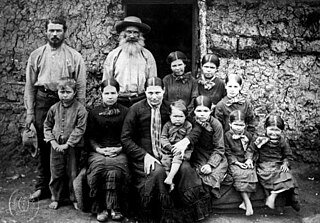
Boers are the descendants of the Dutch-speaking Free Burghers of the eastern Cape frontier in Southern Africa during the 17th, 18th, and 19th centuries. From 1652 to 1795, the Dutch East India Company controlled this area, but the United Kingdom incorporated it into the British Empire in 1806. The name of the group is derived from "boer", which means "farmer" in Dutch and Afrikaans.

The United Kingdom of Great Britain and Ireland was a sovereign state in the British Isles that existed between 1801 and 1922, when it included all of Ireland. It was established by the Acts of Union 1800, which merged the Kingdom of Great Britain and the Kingdom of Ireland into a unified state. The establishment of the Irish Free State in 1922 led to the remainder later being renamed the United Kingdom of Great Britain and Northern Ireland in 1927.
The Washington National Cathedral is chartered by Congress. The charter is signed by President Benjamin Harrison.

The Cathedral Church of Saint Peter and Saint Paul in the City and Diocese of Washington, commonly known as Washington National Cathedral, is an American cathedral of the Episcopal Church. The cathedral is located in Washington, D.C., the capital of the United States. The structure is of Neo-Gothic design closely modeled on English Gothic style of the late fourteenth century. It is the second-largest church building in the United States, and the third-tallest building in Washington, D.C. The cathedral is the seat of both the Presiding Bishop of the Episcopal Church, Michael Bruce Curry, and the bishop of the Diocese of Washington, Mariann Edgar Budde. Over 270,000 people visit the structure annually.

The United States Congress is the legislature of the federal government of the United States. It is bicameral, composed of a lower body, the House of Representatives, and an upper body, the Senate. It meets in the United States Capitol in Washington, D.C. Senators and representatives are chosen through direct election, though vacancies in the Senate may be filled by a governor's appointment. Congress has 535 voting members: 100 senators and 435 representatives. The vice president of the United States has a vote in the Senate only when senators are evenly divided. The House of Representatives has six non-voting members.

The president of the United States (POTUS) is the head of state and head of government of the United States of America. The president directs the executive branch of the federal government and is the commander-in-chief of the United States Armed Forces.

Benjamin Harrison was an American lawyer and politician who served as the 23rd president of the United States from 1889 to 1893. He was a member of the Harrison family of Virginia–a grandson of the ninth president, William Henry Harrison, and a great-grandson of Benjamin Harrison V, a founding father.
The inauguration of the Musikverein in Vienna, Austria.

The Wiener Musikverein, commonly shortened to Musikverein, is a concert hall in Vienna, Austria, which is located in the Innere Stadt district. The building opened in 1870 and is the home of the Vienna Philharmonic orchestra.

Vienna is the capital, largest city, and one of nine states of Austria. Vienna is Austria's most populous city and its primate city, with about two million inhabitants, and its cultural, economic, and political center. It is the 6th-largest city proper by population in the European Union and the largest of all cities on the Danube river.
Samuel Colt obtains his first contract for the sale of revolver pistols to the United States government.

Samuel Colt was an American inventor, industrialist, and businessman who established Colt's Patent Fire-Arms Manufacturing Company and made the mass production of revolvers commercially viable.

A revolver is a repeating handgun that has at least one barrel and uses a revolving cylinder containing multiple chambers for firing. Because most revolver models hold up to six rounds of cartridge before needing to reload, revolvers are also commonly called six shooters.
The worst storm to hit Ireland in 300 years damaged or destroyed more than 20 per cent of houses in Dublin with 100-knot (190 km/h) winds.
The Night of the Big Wind was a powerful European windstorm that swept across what was then the United Kingdom of Great Britain and Ireland, beginning on the afternoon of 6 January 1839, causing severe damage to property and several hundred deaths. 20 to 25% of houses in north Dublin were damaged or destroyed, and 42 ships were wrecked. The storm attained a very low barometric pressure of 918 hPa (27.1 inHg) and tracked eastwards to the north of Ireland, with gusts of over 100 knots before moving across the north of England to continental Europe, where it eventually dissipated. At the time, it was the worst storm to hit Ireland for 300 years. Liverpool also suffered severely, with many shipwrecks and much structural damage. 120 people died as a result of such accidents in the city alone. Two major shipwrecks resulted in damage of at least £500,000, equivalent to £52.2 million in 2020.

Dublin is the capital and largest city of Ireland. On a bay at the mouth of the River Liffey, it is in the province of Leinster, bordered on the south by the Dublin Mountains, a part of the Wicklow Mountains range. At the 2016 census, it had a population of 1,173,179, while the population of County Dublin as a whole was 1,347,359, and the Greater Dublin Area was 1,904,806.
The Night of the Big Wind, the most damaging storm in 300 years, sweeps across Ireland, damaging or destroying more than 20% of the houses in Dublin.
The Night of the Big Wind was a powerful European windstorm that swept across what was then the United Kingdom of Great Britain and Ireland, beginning on the afternoon of 6 January 1839, causing severe damage to property and several hundred deaths. 20 to 25% of houses in north Dublin were damaged or destroyed, and 42 ships were wrecked. The storm attained a very low barometric pressure of 918 hPa (27.1 inHg) and tracked eastwards to the north of Ireland, with gusts of over 100 knots before moving across the north of England to continental Europe, where it eventually dissipated. At the time, it was the worst storm to hit Ireland for 300 years. Liverpool also suffered severely, with many shipwrecks and much structural damage. 120 people died as a result of such accidents in the city alone. Two major shipwrecks resulted in damage of at least £500,000, equivalent to £52.2 million in 2020.

Dublin is the capital and largest city of Ireland. On a bay at the mouth of the River Liffey, it is in the province of Leinster, bordered on the south by the Dublin Mountains, a part of the Wicklow Mountains range. At the 2016 census, it had a population of 1,173,179, while the population of County Dublin as a whole was 1,347,359, and the Greater Dublin Area was 1,904,806.
Alfred Vail and colleagues demonstrate a telegraph system using dots and dashes (this is the forerunner of Morse code).
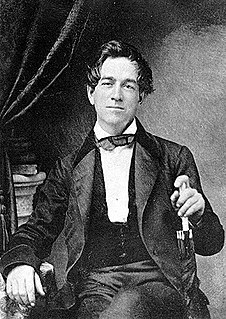
Alfred Lewis Vail was an American machinist and inventor. Along with Samuel Morse, Vail was central in developing and commercializing American telegraphy between 1837 and 1844.

Telegraphy is the long-distance transmission of messages where the sender uses symbolic codes, known to the recipient, rather than a physical exchange of an object bearing the message. Thus flag semaphore is a method of telegraphy, whereas pigeon post is not. Ancient signalling systems, although sometimes quite extensive and sophisticated as in China, were generally not capable of transmitting arbitrary text messages. Possible messages were fixed and predetermined and such systems are thus not true telegraphs.

Morse code is a method used in telecommunication to encode text characters as standardized sequences of two different signal durations, called dots and dashes, or dits and dahs. Morse code is named after Samuel Morse, one of the inventors of the telegraph.
Combined British, Portuguese and colonial Brazilian forces begin the Invasion of Cayenne during the Napoleonic Wars.
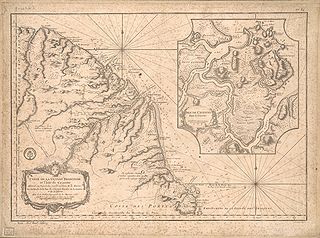
The Portuguese conquest of French Guiana, also known as Conquest of Cayenne, was a military operation against Cayenne, capital of the South American colony of French Guiana, launched in January 1809 in the context of the Napoleonic Wars. The invasion was undertaken by a combined expeditionary force that included Portuguese and British military contingents.

The Napoleonic Wars (1803–1815) were a series of major global conflicts pitting the French Empire and its allies, led by Napoleon I, against a fluctuating array of European states formed into various coalitions. It produced a period of French domination over most of continental Europe. The wars stemmed from the unresolved disputes associated with the French Revolution and the French Revolutionary Wars consisting of the War of the First Coalition (1792–1797) and the War of the Second Coalition (1798–1802). The Napoleonic Wars are often described as five conflicts, each termed after the coalition that fought Napoleon: the Third Coalition (1803–1806), the Fourth (1806–1807), the Fifth (1809), the Sixth (1813–1814), and the Seventh (1815) plus the Peninsular War (1807–1814) and the French invasion of Russia (1812).
In the Battle of Jersey, the British defeat the last attempt by France to invade Jersey in the Channel Islands.

The Battle of Jersey took place on 6 January 1781 when French forces during the American Revolutionary War unsuccessfully invaded the British-ruled island of Jersey to remove the threat it posed to French and American shipping. Jersey provided a base for British privateers, and France was engaged in the war as an ally of the newly created United States.

The Channel Islands are an archipelago in the English Channel, off the French coast of Normandy. They include two Crown Dependencies: the Bailiwick of Jersey, which is the largest of the islands; and the Bailiwick of Guernsey, consisting of Guernsey, Alderney, Sark, Herm and some smaller islands. They are considered the remnants of the Duchy of Normandy and, although they are not part of the United Kingdom, the UK is responsible for the defence and international relations of the islands. The Crown dependencies are not members of the Commonwealth of Nations, nor have they ever been in the European Union. They have a total population of about 171,916, and the bailiwicks' capitals, Saint Helier and Saint Peter Port, have populations of 33,500 and 18,207, respectively.
The Committee of Inquiry on the South Sea Bubble publishes its findings, revealing details of fraud among company directors and corrupt politicians.

The South Sea Company was a British joint-stock company founded in January 1711, created as a public-private partnership to consolidate and reduce the cost of the national debt. To generate income, in 1713 the company was granted a monopoly to supply African slaves to the islands in the "South Seas" and South America. When the company was created, Britain was involved in the War of the Spanish Succession and Spain and Portugal controlled most of South America. There was thus no realistic prospect that trade would take place, and as it turned out, the Company never realised any significant profit from its monopoly. However, Company stock rose greatly in value as it expanded its operations dealing in government debt, and peaked in 1720 before suddenly collapsing to little above its original flotation price. The notorious economic bubble thus created, which ruined thousands of investors, became known as the South Sea Bubble.
English Restoration: The Fifth Monarchists unsuccessfully attempt to seize control of London, England. The revolt is suppressed after a few days.

The Restoration of the Stuart monarchy in the kingdoms of England, Scotland and Ireland took place in 1660 when King Charles II returned from exile in continental Europe. The preceding period of the Protectorate and the civil wars came to be known as the Interregnum (1649–1660).
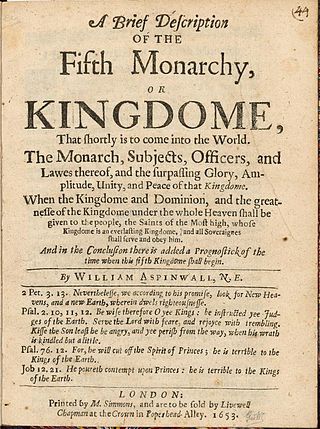
The Fifth Monarchists, or Fifth Monarchy Men, were a Protestant sect which advocated Millennialist views, active during the 1649 to 1660 Commonwealth. Named after a prophecy in the Book of Daniel that Four Monarchies would precede the Fifth or establishment of the Kingdom of God on earth, the group was one of a number of Nonconformist sects that emerged during the Wars of the Three Kingdoms. Perhaps its best known member was Major-General Thomas Harrison, executed in October 1660 as a regicide, while Oliver Cromwell was a sympathiser until 1653.

London is the capital and largest city of England and the United Kingdom, with a population of just under 9 million. It stands on the River Thames in south-east England at the head of a 50-mile (80 km) estuary down to the North Sea, and has been a major settlement for two millennia. The City of London, its ancient core and financial centre, was founded by the Romans as Londinium and retains its medieval boundaries. The City of Westminster, to the west of the City of London, has for centuries hosted the national government and parliament. Since the 19th century, the name "London" has also referred to the metropolis around this core, historically split between the counties of Middlesex, Essex, Surrey, Kent, and Hertfordshire, which largely comprises Greater London, governed by the Greater London Authority.
Arauco War: The first Parliament of Quillín is celebrated, putting a temporary hold on hostilities between Mapuches and Spanish in Chile.
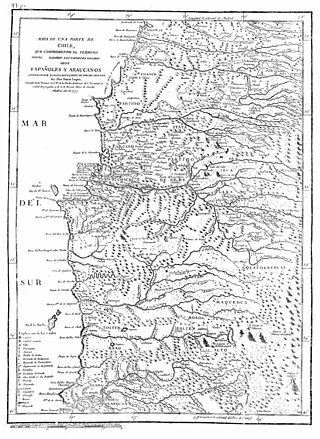
The Arauco War was a long-running conflict between colonial Spaniards and the Mapuche people, mostly fought in the Araucanía. The conflict began at first as a reaction to the Spanish conquerors attempting to establish cities and force Mapuches into servitude. It subsequently evolved over time into phases comprising drawn-out sieges, slave-hunting expeditions, pillaging raids, punitive expeditions, and renewed Spanish attempts to secure lost territories. Abduction of women and war rape was common on both sides.

The Parliament of Quillín (Killen) was a diplomatic meeting held in 1641 between various Mapuche groups and Spanish authorities held in the fields of Quillín. With the ensuing treaty the Spanish sought an end to the hostilities of the Arauco War in order to concentrate the empire's resources in fighting the Catalans in Europe. This way the Mapuche obtained a peace treaty and a recognition on behalf of the crown in a case unique for any indigenous group in the Americas. Another contributing factor for parties to wanting to end warfare may have been the 1640 eruption of Llaima volcano in the middle of the conflict zone. Possibly Mapuches interpreted the eruption as a signal sent from the pillanes.

The Mapuche are a group of indigenous inhabitants of present-day south-central Chile and southwestern Argentina, including parts of present-day Patagonia. The collective term refers to a wide-ranging ethnicity composed of various groups who shared a common social, religious, and economic structure, as well as a common linguistic heritage as Mapudungun speakers. Their influence once extended from Aconcagua Valley to Chiloé Archipelago and later spread eastward to Puelmapu, a land comprising part of the Argentine pampa and Patagonia. Today the collective group makes up over 80% of the indigenous peoples in Chile, and about 9% of the total Chilean population. The Mapuche are particularly concentrated in the Araucanía region. Many have migrated from rural areas to the cities of Santiago and Buenos Aires for economic opportunities.
The Union of Arras unites the southern Netherlands under the Duke of Parma (Ottavio Farnese), governor in the name of King Philip II of Spain.
The Union of Arras was an alliance between the County of Artois, the County of Hainaut and the city of Douai in the Habsburg Netherlands in early 1579 during the Eighty Years' War. Dissatisfied with the religious policies of rebel leader Prince of Orange and the States General of the Netherlands, and especially the rise of the radical Calvinist Republic of Ghent since October 1577, they signed a declaration on 6 January 1579 about their intent to offer a vigorous defense of the Roman Catholic religion against what they saw as encroachments by Calvinists in other provinces. These signatories would begin negotiations for a separate peace with the Spanish Crown, which resulted in the Peace Treaty of Arras of 17 May 1579.
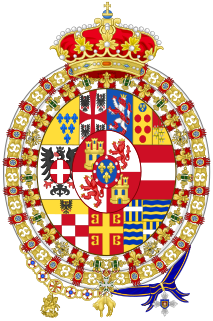
The Duke of Parma and Piacenza was the ruler of the Duchy of Parma and Piacenza, a historical state of Northern Italy, which existed between 1545 and 1802, and again from 1814 to 1859.

Ottavio Farnese reigned as Duke of Parma and Piacenza from 1547 until his death and Duke of Castro from 1545 to 1547 and from 1553 until his death.
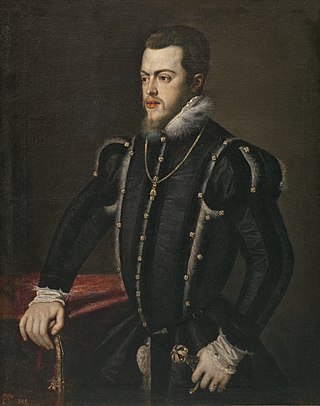
Philip II, also known as Philip the Prudent, was King of Spain from 1556, King of Portugal from 1580, and King of Naples and Sicily from 1554 until his death in 1598. He was also jure uxoris King of England and Ireland from his marriage to Queen Mary I in 1554 until her death in 1558. He was also Duke of Milan from 1540. From 1555, he was Lord of the Seventeen Provinces of the Netherlands.
King Henry VIII of England married his fourth wife, Anne of Cleves; the marriage was annulled six months later.

Henry VIII was King of England from 22 April 1509 until his death in 1547. Henry is best known for his six marriages, and for his efforts to have his first marriage annulled. His disagreement with Pope Clement VII about such an annulment led Henry to initiate the English Reformation, separating the Church of England from papal authority. He appointed himself Supreme Head of the Church of England and dissolved convents and monasteries, for which he was excommunicated by the pope. Henry is also known as "the father of the Royal Navy" as he invested heavily in the navy and increased its size from a few to more than 50 ships, and established the Navy Board.

In common parlance, the wives of Henry VIII were the six queens consort of King Henry VIII of England between 1509 and his death in 1547. In legal terms, Henry had only three wives, because three of his marriages were annulled by the Church of England. However, he was never granted an annulment by the Pope, as he desired, for Catherine of Aragon, his first wife. Annulments declare that a true marriage never took place, unlike a divorce, in which a married couple end their union. Along with his six wives, Henry took several mistresses.

Anne of Cleves was Queen of England from 6 January to 12 July 1540 as the fourth wife of King Henry VIII. Not much is known about Anne before 1527, when she became betrothed to Francis, Duke of Bar, son and heir of Antoine, Duke of Lorraine, although their marriage did not proceed. In March 1539, negotiations for Anne's marriage to Henry began, as Henry believed that he needed to form a political alliance with her brother, William, who was a leader of the Protestants of western Germany, to strengthen his position against potential attacks from Catholic France and the Holy Roman Empire.
Annulment is a legal procedure within secular and religious legal systems for declaring a marriage null and void. Unlike divorce, it is usually retroactive, meaning that an annulled marriage is considered to be invalid from the beginning almost as if it had never taken place. In legal terminology, an annulment makes a void marriage or a voidable marriage null.
King Henry VIII of England marries Anne of Cleves.

Henry VIII was King of England from 22 April 1509 until his death in 1547. Henry is best known for his six marriages, and for his efforts to have his first marriage annulled. His disagreement with Pope Clement VII about such an annulment led Henry to initiate the English Reformation, separating the Church of England from papal authority. He appointed himself Supreme Head of the Church of England and dissolved convents and monasteries, for which he was excommunicated by the pope. Henry is also known as "the father of the Royal Navy" as he invested heavily in the navy and increased its size from a few to more than 50 ships, and established the Navy Board.

Anne of Cleves was Queen of England from 6 January to 12 July 1540 as the fourth wife of King Henry VIII. Not much is known about Anne before 1527, when she became betrothed to Francis, Duke of Bar, son and heir of Antoine, Duke of Lorraine, although their marriage did not proceed. In March 1539, negotiations for Anne's marriage to Henry began, as Henry believed that he needed to form a political alliance with her brother, William, who was a leader of the Protestants of western Germany, to strengthen his position against potential attacks from Catholic France and the Holy Roman Empire.
The oldest European school of higher learning in the Americas, the Colegio de Santa Cruz, was founded in Tlatelolco, Mexico City.

The Colegio de Santa Cruz in Tlatelolco, Mexico City, is the first and oldest European school of higher learning in the Americas and the first major school of interpreters and translators in the New World. It was established by the Franciscans on January 6, 1536 with the intention, as is generally accepted, of preparing Native American boys for eventual ordination to the Catholic priesthood. Students trained in the Colegio were important contributors to the work of Franciscan Bernardino de Sahagún in the creation of his monumental twelve-volume General History of the Things of New Spain, often referred to as the Florentine Codex. The failure of the Colegio had long-lasting consequences, with scholar Robert Ricard saying that "[h]ad the College of Tlatelolco given the country even one [native] bishop, the history of the Mexican Church might have been profoundly changed."

Tlatelolco is an area now within the Cuauhtémoc borough of Mexico City, centered on the Plaza de las Tres Culturas. Its archeological history extends to remains from the 15th and 16th centuries, as well as more recent colonial structures.
The first European school of higher learning in the Americas, Colegio de Santa Cruz de Tlatelolco, is founded by Viceroy Antonio de Mendoza and Bishop Juan de Zumárraga in Mexico City.

The Colegio de Santa Cruz in Tlatelolco, Mexico City, is the first and oldest European school of higher learning in the Americas and the first major school of interpreters and translators in the New World. It was established by the Franciscans on January 6, 1536 with the intention, as is generally accepted, of preparing Native American boys for eventual ordination to the Catholic priesthood. Students trained in the Colegio were important contributors to the work of Franciscan Bernardino de Sahagún in the creation of his monumental twelve-volume General History of the Things of New Spain, often referred to as the Florentine Codex. The failure of the Colegio had long-lasting consequences, with scholar Robert Ricard saying that "[h]ad the College of Tlatelolco given the country even one [native] bishop, the history of the Mexican Church might have been profoundly changed."

Antonio de Mendoza y Pacheco was a Spanish colonial administrator who was the first Viceroy of New Spain, serving from 14 November 1535 to 25 November 1550, and the third Viceroy of Peru, from 23 September 1551, until his death on 21 July 1552.
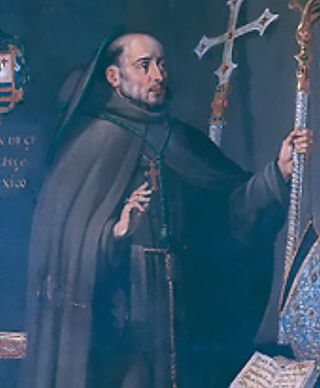
Juan de Zumárraga was a Spanish Basque Franciscan prelate and first bishop and Inquisitor of Mexico. He wrote Doctrina breve, the first book published in the Western hemisphere by a European, printed in Mexico City in 1539.
The Catholic Monarchs Ferdinand and Isabella enter Granada at the conclusion of the Granada War.

The Catholic Monarchs were Queen Isabella I of Castile and King Ferdinand II of Aragon, whose marriage and joint rule marked the de facto unification of Spain. They were both from the House of Trastámara and were second cousins, being both descended from John I of Castile; to remove the obstacle that this consanguinity would otherwise have posed to their marriage under canon law, they were given a papal dispensation by Sixtus IV. They married on October 19, 1469, in the city of Valladolid; Isabella was eighteen years old and Ferdinand a year younger. It is generally accepted by most scholars that the unification of Spain can essentially be traced back to the marriage of Ferdinand and Isabella.

The Granada War was a series of military campaigns between 1482 and 1491 during the reign of the Catholic Monarchs, Isabella I of Castile and Ferdinand II of Aragon, against the Nasrid dynasty's Emirate of Granada. It ended with the defeat of Granada and its annexation by Castile, ending the last remnant of Islamic rule on the Iberian peninsula.
Four years before the Fall of Constantinople, Constantine XI Palaiologos, the last Byzantine emperor, assumed the throne.

The Fall of Constantinople, also known as the Conquest of Constantinople, was the capture of the capital of the Byzantine Empire by the Ottoman Empire. The city fell on 29 May 1453 as part of the culmination of a 53-day siege which had begun on 6 April. The city's collapse marked the end of the Middle Ages.

Constantine XI Dragases Palaiologos or Dragaš Palaeologus was the last Roman emperor, reigning from 1449 until his death in battle at the Fall of Constantinople in 1453. Constantine's death marked the definitive end of the Eastern Roman Empire, which traced its origin to Constantine the Great's foundation of Constantinople as the Roman Empire's new capital in 330. Given that the Eastern Roman Empire was the Roman Empire's medieval continuation, with its citizens continuing to refer to themselves as Romans, Constantine XI's death and Constantinople's fall also marked the definitive end of the Roman Empire, founded by Augustus almost 1,500 years earlier.
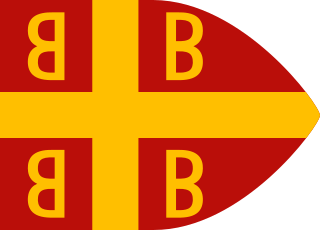
The Byzantine Empire, also referred to as the Eastern Roman Empire or Byzantium, was the continuation of the Roman Empire in its eastern provinces during Late Antiquity and the Middle Ages, when its capital city was Constantinople. It survived the fragmentation and fall of the Western Roman Empire in the 5th century AD and continued to exist for an additional thousand years until the fall of Constantinople to the Ottoman Empire in 1453. During most of its existence, the empire remained the most powerful economic, cultural, and military force in Europe. The terms "Byzantine Empire" and "Eastern Roman Empire" were coined after the end of the realm; its citizens continued to refer to their empire as the Roman Empire, and to themselves as Romans—a term which Greeks continued to use for themselves into Ottoman times. Although the Roman state continued and its traditions were maintained, modern historians distinguish Byzantium from its earlier incarnation because it was centered on Constantinople, oriented towards Greek rather than Latin culture, and characterised by Eastern Orthodox Christianity.
Constantine XI is crowned Byzantine Emperor at Mystras.

Constantine XI Dragases Palaiologos or Dragaš Palaeologus was the last Roman emperor, reigning from 1449 until his death in battle at the Fall of Constantinople in 1453. Constantine's death marked the definitive end of the Eastern Roman Empire, which traced its origin to Constantine the Great's foundation of Constantinople as the Roman Empire's new capital in 330. Given that the Eastern Roman Empire was the Roman Empire's medieval continuation, with its citizens continuing to refer to themselves as Romans, Constantine XI's death and Constantinople's fall also marked the definitive end of the Roman Empire, founded by Augustus almost 1,500 years earlier.

This is a list of the Byzantine emperors from the foundation of Constantinople in 330 AD, which marks the conventional start of the Eastern Roman Empire, to its fall to the Ottoman Empire in 1453 AD. Only the emperors who were recognized as legitimate rulers and exercised sovereign authority are included, to the exclusion of junior co-emperors (symbasileis) who never attained the status of sole or senior ruler, as well as of the various usurpers or rebels who claimed the imperial title.

Mystras or Mistras, also known in the Chronicle of the Morea as Myzithras (Μυζηθρᾶς), is a fortified town and a former municipality in Laconia, Peloponnese, Greece. Situated on Mt. Taygetus, near ancient Sparta, it served as the capital of the Byzantine Despotate of the Morea in the 14th and 15th centuries, experiencing a period of prosperity and cultural flowering during the Palaeologan Renaissance, including the teachings of Gemistos Plethon. The city also attracted artists and architects of the highest quality. The site remained inhabited throughout the Ottoman period, when Western travellers mistook it for ancient Sparta. In the 1830s, it was abandoned and the new town of Sparti was built, approximately eight kilometres to the east. Since the 2011 local government reform it is part of the Sparti municipality. As an exceptionally well-preserved example of a Byzantine city and because of its testimony to the development of Late Byzantine and Post-byzantine art, Mystras was inscribed on the UNESCO World Heritage List in 1989.
Charles IV of Bohemia is crowned with the Iron Crown of Lombardy as King of Italy in Milan.

Charles IV, also known as Charles of Luxembourg, born Wenceslaus, was the first King of Bohemia to become Holy Roman Emperor. He was a member of the House of Luxembourg from his father's side and the Bohemian House of Přemyslid from his mother's side; he emphasized the latter due to his lifelong affinity for the Bohemian side of his inheritance, and also because his direct ancestors in the Přemyslid line included two saints.

The Iron Crown is a relic and may be one of the oldest royal insignia of Christendom. It was made in the Early Middle Ages, consisting of a circlet of gold and jewels fitted around a central silver band, which tradition held to be made of iron beaten out of a nail of the True Cross. In the medieval Kingdom of Italy, the crown came to be seen as a relic from the Kingdom of the Lombards and was used as regalia for the coronation of the Holy Roman Emperors as kings of Italy. It is kept in the Cathedral of Monza.

King of Italy was the title given to the ruler of the Kingdom of Italy after the fall of the Western Roman Empire. The first to take the title was Odoacer, a barbarian military leader, in the late 5th century, followed by the Ostrogothic kings up to the mid-6th century. With the Frankish conquest of Italy in the 8th century, the Carolingians assumed the title, which was maintained by subsequent Holy Roman Emperors throughout the Middle Ages. The last Emperor to claim the title was Charles V in the 16th century. During this period, the holders of the title were crowned with the Iron Crown of Lombardy.

Milan is a city in northern Italy, capital of Lombardy, and the second-most populous city proper in Italy after Rome. The city proper has a population of about 1.4 million, while its metropolitan city has 3.26 million inhabitants. Its continuously built-up urban area is the fourth largest in the EU with 5.27 million inhabitants. According to national sources, the population within the wider Milan metropolitan area, is estimated between 8.2 million and 12.5 million making it by far the largest metropolitan area in Italy and one of the largest in the EU.
Stefan Dečanski became King of Serbia, succeeding his half-brother Stefan Konstantin, whom he later defeated in battle.
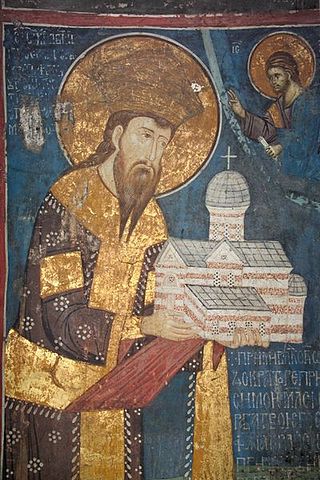
Stefan Uroš III, known as Stefan Dečanski, was the King of Serbia from 6 January 1322 to 8 September 1331. Dečanski was the son of King Stefan Milutin. He defeated two other pretenders to the Serbian throne. Stefan is known as Dečanski after the great Monastery of Visoki Dečani he built.
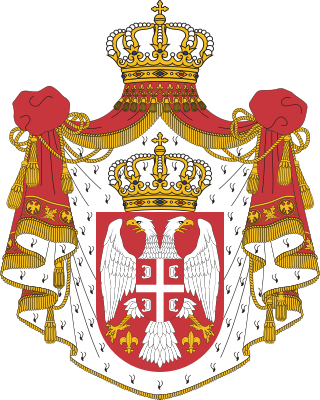
This is an archontological list of Serbian monarchs, containing monarchs of the medieval principalities, to heads of state of modern Serbia.

Stefan Konstantin was the King of Serbia from 29 October 1321 to the spring of 1322. The younger son of King Stefan Milutin (1282-1321), he initially held the appanage of Zeta, and was the heir to the Serbian throne after his father had exiled his elder brother Stefan. After his father's death, a throne struggle broke out between Konstantin, Stefan and their cousin Vladislav II, evolving into the two years long civil war. He was killed in the battle fighting his brother, who went on to defeat Vladislav, too, and gained the Serbian throne as Stefan Uroš III, better known as Stefan Dečanski.
Stephen Uroš III is crowned King of Serbia, having defeated his half-brother Stefan Konstantin in battle. His son is crowned "young king" in the same ceremony.

Stefan Uroš III, known as Stefan Dečanski, was the King of Serbia from 6 January 1322 to 8 September 1331. Dečanski was the son of King Stefan Milutin. He defeated two other pretenders to the Serbian throne. Stefan is known as Dečanski after the great Monastery of Visoki Dečani he built.

The Kingdom of Serbia, or the Serbian Kingdom, was a medieval Serbian state that existed from 1217 to 1346 and was ruled by the Nemanjić dynasty. The Grand Principality of Serbia was elevated with the regal coronation of Stefan Nemanjić as king, after the reunification of Serbian lands. In 1219, Serbian Orthodox Church was reorganized as an autocephalous archbishopric, headed by Saint Sava. The kingdom was proclaimed an empire in 1346, but kingship was not abolished as an institution, since the title of a king was used as an official designation for a co-ruler of the emperor.

Stefan Konstantin was the King of Serbia from 29 October 1321 to the spring of 1322. The younger son of King Stefan Milutin (1282-1321), he initially held the appanage of Zeta, and was the heir to the Serbian throne after his father had exiled his elder brother Stefan. After his father's death, a throne struggle broke out between Konstantin, Stefan and their cousin Vladislav II, evolving into the two years long civil war. He was killed in the battle fighting his brother, who went on to defeat Vladislav, too, and gained the Serbian throne as Stefan Uroš III, better known as Stefan Dečanski.
Philip of Swabia undergoes a second coronation as King of the Romans.
Philip of Swabia was a member of the House of Hohenstaufen and King of Germany from 1198 until his assassination.

King of the Romans was the title used by the king of Germany following his election by the princes from the reign of Henry II (1002–1024) onward.
Harold Godwinson, the last Anglo-Saxon monarch before the Norman Conquest, was crowned King of England.

Harold Godwinson, also called Harold II, was the last crowned Anglo-Saxon English king. Harold reigned from 6 January 1066 until his death at the Battle of Hastings, fighting the Norman invaders led by William the Conqueror during the Norman conquest of England. His death marked the end of Anglo-Saxon rule over England.
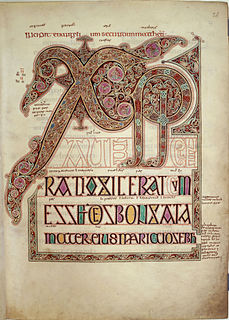
The Anglo-Saxons were a cultural group who inhabited England in the Early Middle Ages. They traced their origins to settlers who came to Britain from mainland Europe in the 5th century. However, the ethnogenesis of the Anglo-Saxons happened within Britain, and the identity was not merely imported. Anglo-Saxon identity arose from interaction between incoming groups from several Germanic tribes, both amongst themselves, and with indigenous Britons. Many of the natives, over time, adopted Anglo-Saxon culture and language and were assimilated. The Anglo-Saxons established the concept, and the Kingdom, of England, and though the modern English language owes somewhat less than 26% of its words to their language, this includes the vast majority of words used in everyday speech.
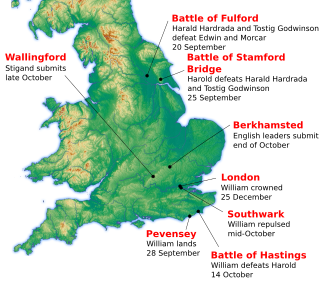
The Norman Conquest was the 11th-century invasion and occupation of England by an army made up of thousands of Norman, Breton, Flemish, and French troops, all led by the Duke of Normandy, later styled William the Conqueror.

This list of kings and reigning queens of the Kingdom of England begins with Alfred the Great, who initially ruled Wessex, one of the seven Anglo-Saxon kingdoms which later made up modern England. Alfred styled himself King of the Anglo-Saxons from about 886, and while he was not the first king to claim to rule all of the English, his rule represents the start of the first unbroken line of kings to rule the whole of England, the House of Wessex.
Following the death of Edward the Confessor on the previous day, the Witan meets to confirm Harold Godwinson as the new King of England; Harold is crowned the same day, sparking a succession crisis that will eventually lead to the Norman conquest of England.

Edward the Confessor was one of the last Anglo-Saxon English kings. Usually considered the last king of the House of Wessex, he ruled from 1042 to 1066.

The Witan was the king's council in Anglo-Saxon England from before the seventh century until the 11th century. It was composed of the leading magnates, both ecclesiastic and secular, and meetings of the council were sometimes called the Witenagemot. Its primary function was to advise the king on subjects such as promulgation of laws, judicial judgments, approval of charters transferring land, settlement of disputes, election of archbishops and bishops and other matters of major national importance. The witan also had to elect and approve the appointment of a new king. Its membership was composed of the most important noblemen, including ealdormen, thegns, and senior clergy.

Harold Godwinson, also called Harold II, was the last crowned Anglo-Saxon English king. Harold reigned from 6 January 1066 until his death at the Battle of Hastings, fighting the Norman invaders led by William the Conqueror during the Norman conquest of England. His death marked the end of Anglo-Saxon rule over England.

The Norman Conquest was the 11th-century invasion and occupation of England by an army made up of thousands of Norman, Breton, Flemish, and French troops, all led by the Duke of Normandy, later styled William the Conqueror.
Peter Bogdanovich, American actor, director, producer, and screenwriter (b. 1939) deaths
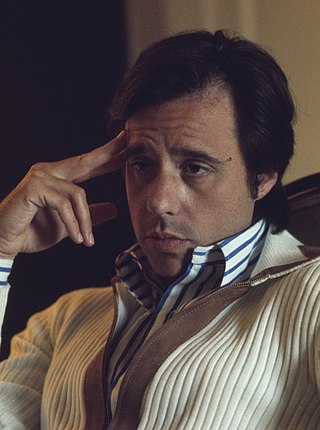
Peter Bogdanovich was an American director, writer, actor, producer, critic, and film historian.
Sidney Poitier, Bahamian-American actor, director, and diplomat (b. 1927) deaths

Sidney Poitier was a Bahamian and American actor, film director, and diplomat. In 1964, he was the first black actor and first Bahamian to win the Academy Award for Best Actor. He received two competitive Golden Globe Awards, a competitive British Academy of Film and Television Arts award (BAFTA), and a Grammy Award for Best Spoken Word Album. Poitier was one of the last major stars from the Golden Age of Hollywood cinema.
Francisco Sionil Jose, Philippine novelist (b.1924) deaths
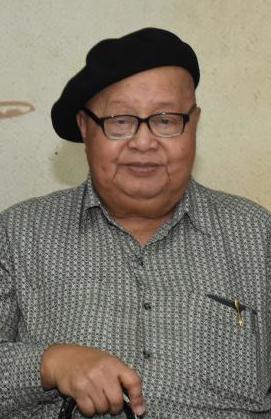
Francisco Sionil José was a Filipino writer who was one of the most widely read in the English language. A National Artist of the Philippines for Literature, which was bestowed upon him in 2001, José's novels and short stories depict the social underpinnings of class struggles and colonialism in Filipino society. His works—written in English—have been translated into 28 languages, including Korean, Indonesian, Czech, Russian, Latvian, Ukrainian and Dutch.
James Cross, British diplomat kidnapped during the 1970 October crisis in Québec (b. 1921) deaths
James Richard Cross was an Irish-born British diplomat who served in India, Malaysia and Canada. While posted in Canada, Cross was kidnapped by members of the Front de libération du Québec (FLQ) during the October Crisis of October 1970. He was ultimately released almost two months later, and subsequently returned to the United Kingdom.

The October Crisis refers to a chain of events that started in October 1970 when members of the Front de libération du Québec (FLQ) kidnapped the provincial Labour Minister Pierre Laporte and British diplomat James Cross from his Montreal residence. These events saw the Prime Minister Pierre Trudeau invoking the War Measures Act for the first time in Canadian history during peacetime.
Richard Maponya, South African businessman (b. 1920) deaths
Richard John Pelwana Maponya, GCOB, was a South African entrepreneur and property developer best known for building a business empire despite the restrictions of apartheid and his determination to see the Soweto township develop economically.
Gordon Renwick, Canadian ice hockey administrator and businessman (b. 1935) deaths
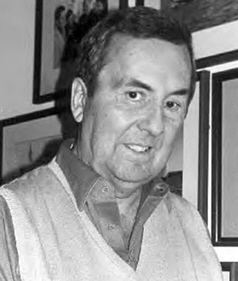
Gordon Ralph Renwick was a Canadian ice hockey administrator, who served as president of the Canadian Amateur Hockey Association (CAHA), vice-president of the International Ice Hockey Federation (IIHF), and was the team president of the Galt Hornets.
José Ramón Fernández, Cuban revolution leader (b. 1923) deaths

José Ramón Fernández Álvarez was a Cuban Communist leader who was a vice-president of the Council of Ministers.
Lamin Sanneh, Gambian-born American professor (b. 1942) deaths
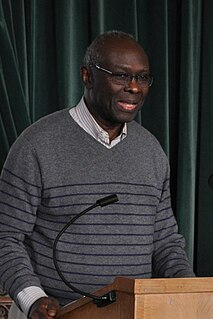
Lamin Sanneh was the D. Willis James Professor of Missions and World Christianity at Yale Divinity School and Professor of History at Yale University.
W. Morgan Sheppard, British actor (b. 1932) deaths

William Morgan Sheppard was an English actor who appeared in over 100 films and television programmes, in a career that spanned over 50 years.
Paul Streeten, Austrian-born British economics professor (b. 1917) deaths
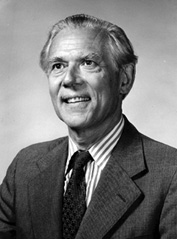
Paul Patrick Streeten was an Austrian-born British economics professor. He was a professor at Boston University, US until his retirement. He has been a distinguished academic working on development economics since the 1950s.
Octavio Lepage, Venezuelan politician, President of Venezuela (b. 1923) deaths

Octavio Lepage Barreto was a Venezuelan politician who served as acting president of Venezuela from 21 May 1993 to 5 June 1993.
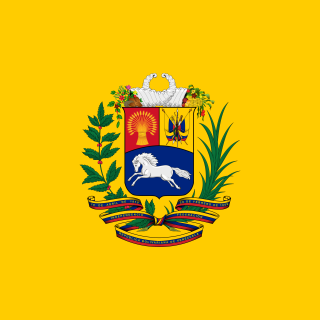
The president of Venezuela, officially known as the President of the Bolivarian Republic of Venezuela, is the head of state and head of government in Venezuela. The president leads the National Executive of the Venezuelan government and is the commander-in-chief of the National Bolivarian Armed Forces. Presidential terms were set at six years with the adoption of the 1999 Constitution of Venezuela, and presidential term limits were removed in 2009.
Om Puri, Indian actor (b. 1950) deaths

Om Prakash Puri was an Indian actor who appeared in mainstream commercial Hindi films, as well as independent and art films and also starred in several international cinema. He is widely regarded as one of the finest actors in the Indian cinema. He won two National Film Awards for Best Actor, two Filmfare Awards and India's fourth highest civilian award Padma Shri in 1990. In 2004, he was made an honorary Officer of the Order of the British Empire.
Pat Harrington, Jr., American actor and screenwriter (b. 1929) deaths

Daniel Patrick Harrington Jr. was an American Emmy Award-winning stage and television actor, best known for his role as building superintendent Dwayne Schneider on the sitcom One Day at a Time (1975–1984). His father Pat Harrington Sr. was also an actor.
Florence King, American journalist and author (b. 1936) deaths

Florence Virginia King was an American novelist, essayist and columnist.
Christy O'Connor Jnr, Irish golfer and architect (b. 1948) deaths

Christy O'Connor Jnr was an Irish professional golfer. He is best known for defeating American Fred Couples at the 1989 Ryder Cup, helping Europe secure the trophy.
Silvana Pampanini, Italian model, actress, and director, Miss Italy 1946 (b. 1925) deaths

Silvana Pampanini was an Italian film actress, director and singer. She was also the niece of the well-known soprano of the golden era of opera, Dame Rosetta Pampanini. Silvana Pampanini caused a sensation when she took part in the 1946 Miss Italy contest and the following year she started her movie career. Madame Pampanini was born into a well-off family, she was educated, and studied opera and ballet since her childhood. According to interviews, Pampanini was a contralto with notable voice extension. However, she also said many times over the years that she preferred to pursue a career in cinema as it required less training and it was much less demanding than a career as an opera singer.
Miss Italia is a beauty pageant awarding prizes every year to young, female contestants from Italy. Since the first edition of the contest in 1939 many of the contestants have gone on to notable careers in television and film.
Arthur Jackson, American lieutenant and target shooter (b. 1918) deaths

Lieutenant Colonel Arthur Charles Jackson was an American competitive sport shooter. In his international career, he captured numerous medals across three Summer Olympic Games, three ISSF World Shooting Championships, and two editions of the Pan American Games. He began shooting in the seventh grade and joined the rifle team at Brooklyn Technical High School in 1934. He competed in local and regional tournaments prior to World War II, during which he worked at the Sperry Corporation and later served as a bombardier in the Pacific Theater of Operations. His first international tournament was the 1948 Summer Olympics and his last was the 1956 edition, at which point he began a career in public service with the Central Intelligence Agency in Europe, Asia, and Latin America. He stopped competing at the international level in 1957 and retired from the CIA at the end of 1974. After several years as an instructor and coach, he continued participating in smaller tournaments through the 1990s.
Basil John Mason, English meteorologist and academic (b. 1923) deaths
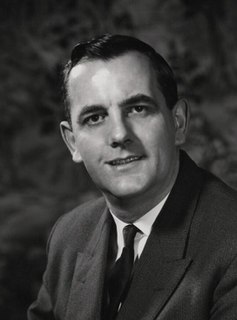
Sir Basil John Mason was an expert on cloud physics and former Director-General of the Meteorological Office from 1965 to 1983 and Chancellor of the University of Manchester Institute of Science and Technology (UMIST) from 1994 to 1996.
Marina Ginestà, French Resistance soldier and photographer (b. 1919) deaths

Marina Ginestà i Coloma was a French-born Spanish communist, a member of the Unified Socialist Youth, and an iconic figure of the Spanish Civil War. She became famous due to the photo taken by Juan Guzmán on the rooftop of the Hotel Colón, Plaça de Catalunya 9, Barcelona during the July 1936 military uprising in Barcelona. It is one of the most iconic photographs of the Spanish Civil War.
Nelson Ned, Brazilian singer-songwriter (b. 1947) deaths

Nelson Ned d'Ávila Pinto was a Brazilian singer-songwriter. He built a solid career as a singer and composer of sentimental, suffering songs, rising to popularity in Brazil and Latin America in 1969 and becoming known internationally, especially in Portugal, France and Spain. In 1971 he released his first Spanish album, "Canción Popular" and performed in the US, Latin America, Europe, and Africa.
Julian Rotter, American psychologist and academic (b. 1916) deaths
Julian B. Rotter was an American psychologist known for developing social learning theory and research into locus of control. He was a faculty member at Ohio State University and then the University of Connecticut. A Review of General Psychology survey, published in 2002, ranked Rotter as the 64th most eminent and 18th most widely cited psychologist of the 20th century. A 2014 study published in 2014 placed at #54 among psychologists whose careers spanned the post-World War II era.
Ruth Carter Stevenson, American art collector, founded the Amon Carter Museum of American Art (b. 1923) deaths
Ruth Carter Stevenson was an American patron of the arts and founder of the Amon Carter Museum of American Art, which opened in Fort Worth, Texas, in January 1961.

The Amon Carter Museum of American Art (ACMAA) is located in Fort Worth, Texas, in the city's cultural district. The museum's permanent collection features paintings, photography, sculpture, and works on paper by leading artists working in the United States and its North American territories in the nineteenth and twentieth centuries. The greatest concentration of works falls into the period from the 1820s through the 1940s. Photographs, prints, and other works on paper produced up to the present day are also an area of strength in the museum's holdings.
Gerard Helders, Dutch jurist and politician (b. 1905) deaths

Gerardus Philippus "Gerard" Helders was a Dutch politician and diplomat of the defunct Christian Historical Union (CHU) party now merged into the Christian Democratic Appeal (CDA) party and jurist.
Cho Sung-min, South Korean baseball player (b. 1973) deaths
Cho Sung-min was a South Korean professional baseball player with the Yomiuri Giants of Japan and the Hanwha Eagles of the KBO League. He also received media attention for his much-publicized marriage and divorce from actress Choi Jin-sil.
Bob Holness, South African-English radio and television host (b. 1928) deaths

Robert Wentworth John Holness was a British-South African radio and television presenter and occasional actor. He presented the British version of Blockbusters.
Spike Pola, Australian footballer and soldier (b. 1914) deaths

Jack Stephen "Spike" Pola was an Australian rules footballer who played for the West Perth Football Club in the Western Australian National Football League (WANFL).
Uche Okafor, Nigerian footballer, coach, and sportscaster (b. 1967) deaths
Uchenna Kizito Okafor, often shortened to Uche Okafor was a Nigerian former professional footballer who played as a defender. He made 34 international appearances for the Nigeria national team.
Ron Asheton, American guitarist, songwriter, and actor (probable; b. 1948) deaths

Ronald Franklin Asheton was an American musician, who was best known as the guitarist, bassist, and co-songwriter for the rock band the Stooges. He formed the Stooges along with Iggy Pop and his brother, drummer Scott Asheton, and bassist Dave Alexander. Asheton, once ranked as number 29 on Rolling Stone's list of 100 Greatest Guitarists of All Time is currently ranked at number 60.
Shmuel Berenbaum, Rabbi of Mir Yeshiva (Brooklyn) (b. 1920) deaths

Shmuel Berenbaum was an Orthodox rabbi and rosh yeshiva of the Mir yeshiva in Brooklyn, New York.

The Mirrer Yeshiva Central Institute, commonly known as the Mir Yeshiva or the Mirrer Yeshiva, is a prominent, Haredi yeshiva located in Brooklyn, New York known for talmudic studies.
Roberta Wohlstetter, American political scientist, historian, and academic (b. 1912) deaths
Roberta Mary Morgan was one of a historian of American military intelligence. She authored Pearl Harbor: Warning and Decision, which former Secretary of Defense Donald Rumsfeld is said to have required his aides read. Indeed, it was brought up during discussions of intelligence failures leading to the successful Al-Qaeda attack on the World Trade Center and Pentagon.
Lou Rawls, American singer-songwriter (b. 1933) deaths

Louis Allen Rawls was an American record producer, singer, composer and actor. Rawls released more than 60 albums, sold more than 40 million records, and had numerous charting singles, most notably his song "You'll Never Find Another Love like Mine". He worked as a film, television, and voice actor. He was also a three-time Grammy-winner, all for Best Male R&B Vocal Performance.
Eileen Desmond, Irish civil servant and politician, 12th Irish Minister for Health (b. 1932) deaths

Eileen Christine Desmond was an Irish Labour Party politician who served as Minister for Health and Minister for Social Welfare from 1981 to 1982. She served as a Teachta Dála (TD) from 1965 to 1969, 1973 to 1981 and 1981 to 1987. She served as a Member of the European Parliament (MEP) for the Munster constituency from 1979 to 1984. She was a Senator for the Industrial and Commercial Panel from 1969 to 1973.

The Minister for Health is a senior minister in the Government of Ireland and leads the Department of Health. The Minister for Health is responsible for healthcare in the Republic of Ireland and related services.
Lois Hole, Canadian academic and politician, 15th Lieutenant Governor of Alberta (b. 1929) deaths
Lois Elsa Hole, CM, AOE was a Canadian politician, businesswoman, academician, professional gardener and best-selling author. She was the 15th Lieutenant Governor of Alberta from 10 February 2000 until her death on 6 January 2005. She was known as the "Queen of Hugs" for breaking with protocol and hugging almost everyone she met, including journalists, diplomats and other politicians.

The lieutenant governor of Alberta is the viceregal representative in Alberta of the Canadian monarch, King Charles III. The lieutenant governor is appointed in the same manner as the other provincial viceroys in Canada and is similarly tasked with carrying out most of the monarch's constitutional and ceremonial duties.
Tarquinio Provini, Italian motorcycle racer (b. 1933) deaths

Tarquinio Provini was an Italian professional Grand Prix motorcycle road racer. He was a two-time world champion in road racing. Provini was also a four-time Isle of Man TT winner and won 13 Italian national championships.
Pierre Charles, Dominican educator and politician, 5th Prime Minister of Dominica (b. 1954) deaths

Pierre Charles was Prime Minister of Dominica from 2000 to 2004 as well as Member of Parliament for Grand Bay, Dominica, from 1985 until his death.

The prime minister of Dominica is the head of government in the Commonwealth of Dominica. Nominally, the position was created on November 3, 1978 when Dominica gained independence from the United Kingdom. Hitherto, the position existed de facto as Premier. Roosevelt Skerrit is the incumbent prime minister. He took office on 8 January 2004
Michel Petrucciani, French-American pianist (b. 1962) deaths

Michel Petrucciani was a French jazz pianist. From birth he had osteogenesis imperfecta, a genetic disease that causes brittle bones and, in his case, short stature. He became one of the most accomplished jazz pianists of his generation despite his health condition and very short life span.
Joe Slovo, Lithuanian-South African lawyer and politician (b. 1926) deaths
Joe Slovo was a South African politician, and an opponent of the apartheid system. A Marxist-Leninist, he was a long-time leader and theorist in the South African Communist Party (SACP), a leading member of the African National Congress (ANC), and a commander of the ANC's military wing Umkhonto we Sizwe (MK).
Catriona Gray, Filipino-Australian model, singer and beauty queen, Miss Universe 2018 births
Catriona Elisa Magnayon Gray is a Filipino-Australian model, singer, beauty queen, television personality, youth advocate and arts ambassador best known for having been crowned Miss Universe 2018. She is the fourth Filipina to win the Miss Universe competition. Previously, Gray was crowned Miss Universe Philippines 2018 and Miss World Philippines 2016.

Miss Universe 2018 was the 67th Miss Universe pageant, held at the IMPACT Arena, Muang Thong Thani, Nonthaburi Province, Thailand on December 17, 2018.
Dizzy Gillespie, American singer-songwriter and trumpet player (b. 1917) deaths

John Birks "Dizzy" Gillespie was an American jazz trumpeter, bandleader, composer, educator and singer. He was a trumpet virtuoso and improviser, building on the virtuosic style of Roy Eldridge but adding layers of harmonic and rhythmic complexity previously unheard in jazz. His combination of musicianship, showmanship, and wit made him a leading popularizer of the new music called bebop. His beret and horn-rimmed spectacles, scat singing, bent horn, pouched cheeks, and light-hearted personality provided one of bebop's most prominent symbols.
Rudolf Nureyev, Russian-French dancer and choreographer (b. 1938) deaths
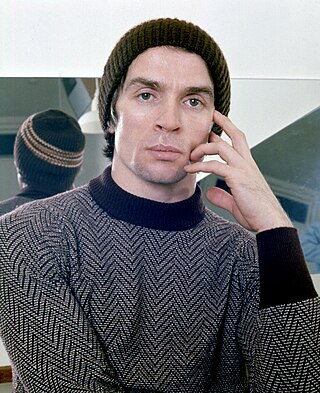
Rudolf Khametovich Nureyev was a Soviet-born ballet dancer and choreographer. Nureyev is regarded by some as the greatest male ballet dancer of his generation.
Steve Gilpin, New Zealand vocalist and songwriter (b. 1949) deaths
Stephen Ellis Gilpin was a New Zealand singer and a founder of new wave band Mi-Sex.
Will Barton, American basketball player births

William Denard Barton III is an American professional basketball player for the Washington Wizards of the National Basketball Association (NBA). He played college basketball for Memphis, where he was named the Conference USA Men's Basketball Player of the Year in 2012. He was selected 40th overall in the 2012 NBA draft by the Portland Trail Blazers and played for the Idaho Stampede of the NBA G League before being traded to the Denver Nuggets in 2015, where he eventually became their franchise leader in three-pointers made. He was traded to the Washington Wizards in 2022.
Alan Wiggins, American baseball player (b. 1958) deaths

Alan Anthony Wiggins was an American professional baseball player. He was a second baseman and outfielder in Major League Baseball (MLB) for the San Diego Padres and Baltimore Orioles between 1981 and 1987. A speedy leadoff hitter, Wiggins had his best season with the pennant-winning Padres in 1984. He batted one slot in the lineup ahead of Tony Gwynn that year, and the pair's offensive production helped the Padres win the National League Championship Series (NLCS) and advance to the World Series.
Ian Charleson, Scottish-English actor (b. 1949) deaths

Ian Charleson was a Scottish stage and film actor. He is best known internationally for his starring role as Olympic athlete and missionary Eric Liddell in the Oscar-winning 1981 film Chariots of Fire. He is also well known for his portrayal of Rev. Charlie Andrews in the 1982 Oscar-winning film Gandhi.
Pavel Cherenkov, Russian physicist and academic, Nobel Prize laureate (b. 1904) deaths

Pavel Alekseyevich Cherenkov was a Soviet physicist who shared the Nobel Prize in physics in 1958 with Ilya Frank and Igor Tamm for the discovery of Cherenkov radiation, made in 1934.

The Nobel Prize in Physics is a yearly award given by the Royal Swedish Academy of Sciences for those who have made the most outstanding contributions for humankind in the field of physics. It is one of the five Nobel Prizes established by the will of Alfred Nobel in 1895 and awarded since 1901, the others being the Nobel Prize in Chemistry, Nobel Prize in Literature, Nobel Peace Prize, and Nobel Prize in Physiology or Medicine. Physics is traditionally the first award presented in the Nobel Prize ceremony.
Andy Carroll, English footballer births

Andrew Thomas Carroll is an English professional footballer who plays as a striker for Championship side Reading. He has played in the Premier League and English Football League for Newcastle United, Preston North End, Liverpool, West Ham United, and West Bromwich Albion, and has nine caps for the England national team, scoring two goals.
Derrick Morgan, American football player births

Derrick Lee Morgan is a former American football linebacker who spent his entire nine-year pro career playing for the Tennessee Titans of the National Football League (NFL). He was selected 16th overall by the Titans in the 2010 NFL Draft after playing college football at Georgia Tech.
Bongani Khumalo, South African footballer births
Bongani Sandile Khumalo is a Liswati-born retired South African footballer who last played as a centre-back for SuperSport United and the South Africa national team.
Paul McShane, Irish footballer births

Paul David McShane is an Irish professional football coach and former player who is currently the Professional Development Phase coach at Premier League side Manchester United.
Petter Northug, Norwegian skier births
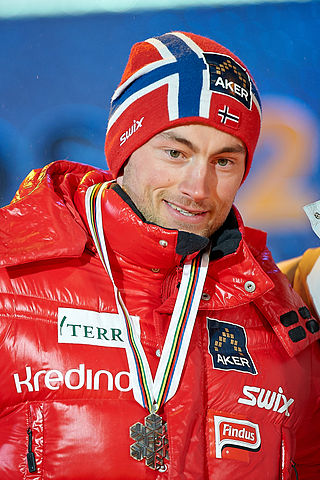
Petter Northug Jr. is a Norwegian former cross-country skier and double Olympic champion. He won a total of 13 World Championship and two Winter Olympic gold medals with 20 medals overall, and 18 individual FIS Cross-Country World Cup wins with 13 podium places. He is also the record holder for most stage wins (13) in Tour de Ski. By winning his ninth gold medal in the Nordic World Ski Championships in 4 × 10 km relay in Val di Fiemme 2013 he leveled the achievement of Bjørn Dæhlie who had been the most successful World Champion male skier up to that point. He is considered by many as the greatest cross country skier of all time.
Kate McKinnon, American actress and comedian births

Kate McKinnon Berthold is an American actress, comedian, and writer. She is known for her character work and celebrity impressions on the sketch comedy series Saturday Night Live (2012–2022), of which she was a cast member for eleven seasons, and formerly The Big Gay Sketch Show (2007–2010). She has appeared in films such as Balls Out (2014), Ghostbusters (2016), Office Christmas Party (2016), Rough Night (2017), The Spy Who Dumped Me (2018), Yesterday (2019), and Bombshell (2019). In 2022, she played the role of Tiger King subject Carole Baskin in the miniseries Joe vs. Carole.
Ernest Laszlo, Hungarian-American cinematographer (b. 1898) deaths
Ernest Laszlo, A.S.C. was a Hungarian-American cinematographer for over 60 films, and was known for his frequent collaborations with directors Robert Aldrich and Stanley Kramer. He was a member of the American Society of Cinematographers, and was its president from 1972 to 1974. He was an active member of the International Alliance of Theatrical Stage Employees.
Adam Burish, American ice hockey player births

Adam Mark Burish is an American former professional ice hockey winger who played in the National Hockey League (NHL) with the Chicago Blackhawks, Dallas Stars and San Jose Sharks. He is currently an analyst covering Blackhawks games on NBC Sports Chicago.
Gilbert Arenas, American basketball player births

Gilbert Jay Arenas Jr. is an American former professional basketball player. Arenas attended Grant High School in the Valley Glen district of Los Angeles, and accepted a scholarship offer to the University of Arizona late in his junior year. He was drafted by the Golden State Warriors with the 31st overall pick in the 2001 NBA draft.
Roy Asotasi, New Zealand rugby league player births

Roy Asotasi is a former professional rugby league footballer who played as a prop in the 2000s and 2010s. A New Zealand international captain, he also played for Samoa. Asotasi played in the NRL for Australian clubs Canterbury-Bankstown and the South Sydney Rabbitohs from 2007 to 2013. He then played in the Super League for the Warrington Wolves.
Tiffany Pollard, American television personality births

Tiffany Pollard is an American television personality. She came to public prominence for her participation on the first two seasons of VH1's Flavor of Love (2006–2007). Pollard was given the nickname "New York" by rapper Flavor Flav. She is also known colloquially by her self-proclaimed nickname "HBIC", which she exclaimed in the Flavor of Love series to taunt her competitors. Her temperamental nature often led to tension with the other women on the show.
Eddie Redmayne, English actor and model births

Edward John David Redmayne is an English actor. Known for his roles in biopics and blockbusters, he has received various accolades, including an Academy Award, a Tony Award, a BAFTA Award, and two Olivier Awards.
Asante Samuel, American football player births
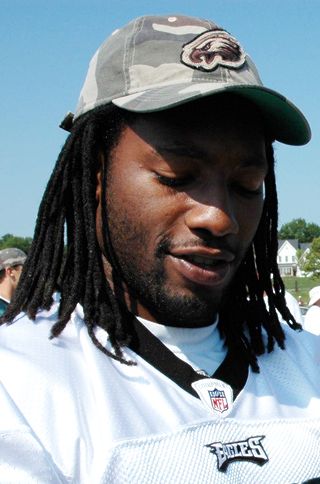
Asante T. Samuel Sr. is an American former professional football player who was a cornerback in the National Football League (NFL). He was born in Accra, Ghana and raised in Fort Lauderdale, Florida. He played college football for the UCF Knights and was drafted by the New England Patriots in the fourth round of the 2003 NFL Draft. Samuel also played for the Philadelphia Eagles and Atlanta Falcons. He is the father of Asante Samuel Jr., a cornerback who was drafted by the Los Angeles Chargers.
A. J. Cronin, Scottish physician and author (b. 1896) deaths
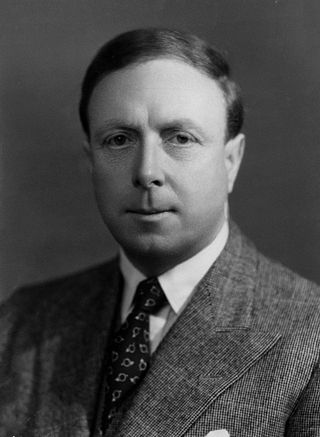
Archibald Joseph Cronin, known as A. J. Cronin, was a Scottish physician and novelist. His best-known novel is The Citadel (1937), about a Scottish doctor who serves in a Welsh mining village before achieving success in London, where he becomes disillusioned about the venality and incompetence of some doctors. Cronin knew both areas, as a medical inspector of mines and as a doctor in Harley Street. The book exposed unfairness and malpractice in British medicine and helped to inspire the National Health Service. The Stars Look Down, set in the North East of England, is another of his best-selling novels inspired by his work among miners. Both novels have been filmed, as have Hatter's Castle, The Keys of the Kingdom and The Green Years. His 1935 novella Country Doctor inspired a long-running BBC radio and TV series, Dr. Finlay's Casebook (1962–1971), set in the 1920s. There was a follow-up series in 1993–1996.
Casey Fossum, American baseball player births
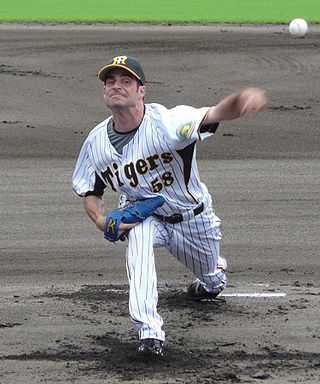
Casey Paul Fossum is a former professional pitcher. Previously, he played for the Boston Red Sox (2001–2003), Arizona Diamondbacks (2004), Tampa Bay Devil Rays (2005–2007), Detroit Tigers (2008), and New York Mets (2009) of Major League Baseball, and the Hanshin Tigers (2010) of Nippon Professional Baseball. He bats and throws left-handed.
Bubba Franks, American football player births
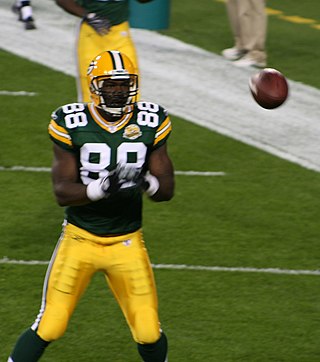
Daniel Lamont "Bubba" Franks is a former American football tight end who played nine seasons in the National Football League (NFL). He played college football for the University of Miami. He was drafted by the Green Bay Packers 14th overall in the 2000 NFL Draft.
Burt Munro, New Zealand motorcycle racer (b. 1899) deaths

Herbert James "Burt" Munro was a motorcycle racer from New Zealand, famous for setting an under-1,000 cc world record, at Bonneville, on the 26th of August 1967. This record still stands; Munro was 68 and was riding a 47-year-old machine when he set his last record.
Richard Zedník, Slovak ice hockey player births

Richard Zedník is a Slovak former professional ice hockey winger. He had a 15-year career in the National Hockey League (NHL), playing for the Washington Capitals, Montreal Canadiens, New York Islanders and Florida Panthers.
James Farrior, American football player births

James Alfred Farrior is a former American football linebacker who played fifteen seasons in the National Football League (NFL). He played college football for the University of Virginia. He played with the New York Jets and the Pittsburgh Steelers, and earned two Super Bowl rings with the Steelers.
Marlon Anderson, American baseball player and sportscaster births

Marlon Ordell Anderson is an American former professional baseball second baseman and outfielder who played in Major League Baseball (MLB) for six teams, over 12 seasons. He was widely known for his clutch hits, and writers for publications including The New York Times and Newsday had referred to him as one of the best pinch-hitters in the game. Anderson was the hitting coach for the Brooklyn Cyclones in 2018.
Daniel Cordone, Argentinian footballer births
Carlos Daniel "Lobo" Cordone, is a former Argentine professional football player who played as a striker.
Paul Grant, American basketball player and coach births
Paul Edward Grant is a retired American professional basketball player. He was born in Pittsburgh, Pennsylvania.
David Alfaro Siqueiros, Mexican painter (b. 1896) deaths

David Alfaro Siqueiros was a Mexican social realist painter, best known for his large public murals using the latest in equipment, materials and technique. Along with Diego Rivera and José Clemente Orozco, he was one of the most famous of the "Mexican muralists". He was a member of the Mexican Communist Party, and a Stalinist and supporter of the Soviet Union who led an unsuccessful attempt to assassinate Leon Trotsky in May 1940.
Vasso Karantasiou, Greek beach volleyball player births

Vasiliki "Vasso" Karantasiou is a female beach volleyball player from Greece, who won the gold medal at the 2005 European Championships in Moscow, Russia, partnering Vassiliki Arvaniti.
Chen Yi, Chinese general and politician, 2nd Foreign Minister of the People's Republic of China (b. 1901) deaths
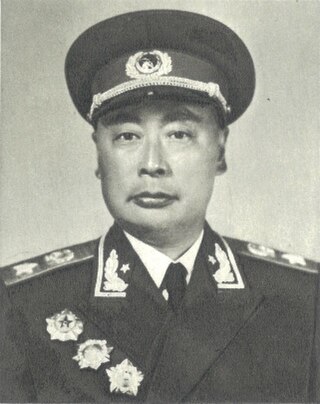
Chen Yi was a Chinese communist military commander and politician. He served as Mayor of Shanghai from 1949 to 1958 and as Foreign Minister of China from 1958 to 1972.

The Minister of Foreign Affairs of the People's Republic of China is the head of the Ministry of Foreign Affairs of the People's Republic of China and one of the country's most important cabinet posts. The Minister usually is also a member of the Central Committee of the Chinese Communist Party.
Irwin Thomas, American-Australian singer-songwriter and guitarist births
Irwin Thomas is an American-born Australian singer-songwriter and guitarist. He performs professionally using the stage name Jack Jones from when he was the lead vocalist-guitarist in the band Southern Sons (1990–1996).
Julie Chen, American television journalist, presenter, and producer births

Julie Suzanne Chen Moonves is an American television personality, news anchor, and producer for CBS. She has been the host of the American version of the CBS reality-television program Big Brother since its debut in July 2000.
Radoslav Látal, Czech footballer and manager births
Radoslav Látal is a Czech football coach and former player who played as a midfielder. Látal is currently in charge of I liga side Bruk-Bet Termalica Nieciecza.
Gabrielle Reece, American volleyball player, sportscaster, and actress births

Gabrielle Allyse Reece is an American professional volleyball player, sports announcer, fashion model and actress.
Norman Reedus, American actor and model births

Norman Mark Reedus is an American actor and model best known for starring as Daryl Dixon in the AMC horror drama series The Walking Dead (2010–2022). He also starred as Murphy MacManus in the film The Boondock Saints (1999) and its sequel The Boondock Saints II: All Saints Day (2009), Scud in Marvel's Blade II (2002), Marco in Deuces Wild (2002), and himself in his AMC TV show Ride with Norman Reedus (2016–2021). He has acted in numerous films and television series, and modeled for various fashion designers. Reedus also provided motion capture and voice acting for the lead character Sam Porter in the video game Death Stranding (2019).
John Singleton, American director, producer, and screenwriter (d. 2019) births

John Daniel Singleton was an American director, screenwriter, and producer. He made his cinematic debut by writing and directing Boyz n the Hood in 1991, for which he was nominated for the Academy Award for Best Director, becoming, at age 24, the first African American and youngest person to have ever been nominated for that award.
A. R. Rahman, Indian composer, singer-songwriter, music producer, musician, and philanthropist births

Allah Rakha Rahman is an Indian music composer, record producer, singer and songwriter, popular for his works in Indian cinema; predominantly in Tamil and Hindi films, with occasional forays in international cinema. He is a winner of six National Film Awards, two Academy Awards, two Grammy Awards, a BAFTA Award, a Golden Globe Award, fifteen Filmfare Awards and seventeen Filmfare Awards South. In 2010, the Indian government conferred him with the Padma Bhushan, the nation's third-highest civilian award.
Sharon Cuneta, Filipino singer and actress births
Sharon Gamboa Cuneta-Pangilinan is a Filipino actress, singer, television host, and socialite. Regarded as one of the most successful and highest-earning individuals in the Philippine entertainment industry, she has grown into a household name and has been referred to as the "Megastar". Cuneta has starred in over 60 films, hosted over 10 television shows, and recorded over 40 albums. She has held numerous accolades as an actress, host, and recording artist, including multiple FAMAS, MMFF, and Awit Awards.
Attilio Lombardo, Italian footballer and manager births

Attilio Lombardo is an Italian retired football player turned manager; he is currently the assistant manager for the Italy national team.
Jean Lurçat, French painter (b. 1892) deaths

Jean Lurçat was a French artist noted for his role in the revival of contemporary tapestry.
Bjørn Lomborg, Danish author and academic births

Bjørn Lomborg is a Danish author and president of the think tank Copenhagen Consensus Center. He is former director of the Danish government's Environmental Assessment Institute (EAI) in Copenhagen. He became internationally known for his best-selling and controversial book The Skeptical Environmentalist (2001).
Jacqueline Moore, American wrestler and manager births

Jacqueline DeLois Moore is an American professional wrestler and professional wrestling manager. She is best known for her time in WWE from 1998 to 2004, where she became the first African American WWE Cruiserweight champion as well as being the first and only woman to hold the belt, as well as working for World Championship Wrestling in 1997–98 and later Total Nonstop Action Wrestling as a wrestler, manager and road agent.
Jyrki Kasvi, Finnish journalist and politician (d. 2021) births

Jyrki Jouko Juhani Kasvi was a Finnish politician, and a member of the Finnish Parliament, representing the Green League.
Norm Charlton, American baseball player and coach births

Norman Wood Charlton III, nicknamed "The Sheriff", is an American former professional baseball relief pitcher, who played in Major League Baseball (MLB) for the Cincinnati Reds, Seattle Mariners, Philadelphia Phillies, Baltimore Orioles, Atlanta Braves, and Tampa Bay Devil Rays.
Paul Kipkoech, Kenyan runner (d. 1995) births
Paul Kipkoech was a Kenyan long-distance runner who specialized in the 10,000 metres and cross-country running. He became world champion over 10,000 m in 1987.
Georges Jobé, Belgian motocross racer (d. 2012) births

Georges Jobé was a Belgian professional motocross racer. He competed in the Motocross World Championships from 1979 to 1992. Jobé is notable for being a five-time FIM motocross world champion and a nine-time Belgian motocross national champion. He was named Belgian Sportsman of the year in 1987 and 1992.
Nigel Melville, English rugby player births
Nigel David Melville is a former England national rugby union team scrum half and captain and currently serves as Director of Professional Rugby for Rugby Football Union.
Peter Whittle, British politician, author, journalist, and broadcaster births

Peter Robin Whittle is a British politician, author, journalist and broadcaster who served as a Member of the London Assembly from 2016 to 2021. He is the founder and director of the New Culture Forum think tank and host of So What You're Saying Is..., a weekly cultural and political interview show on YouTube.
Paul Azinger, American golfer and sportscaster births

Paul William Azinger is an American professional golfer and TV golf analyst. He won twelve times on the PGA Tour, including one major championship, the 1993 PGA Championship. He spent almost 300 weeks in the top-10 of the Official World Golf Ranking between 1988 and 1994.
Kari Jalonen, Finnish ice hockey player and coach births

Kari Jalonen is a Finnish professional ice hockey coach and former player. Currently he is the head coach of Czech national team. He is not related to Finnish ice hockey coach Jukka Jalonen.
Nigella Lawson, English chef and author births

Nigella Lucy Lawson is an English food writer and television cook.
Howie Long, American football player and sports commentator births

Howard Matthew Moses Long is an American sports analyst and former professional football player. He played in the National Football League (NFL) for 13 seasons as a defensive end, spending his entire career with the Raiders franchise in Oakland and Los Angeles. Selected by the Raiders in the second round of the 1981 NFL Draft, Long received eight Pro Bowl and three first-team All-Pro selections while helping the team win a Super Bowl title in Super Bowl XVIII over the Washington Redskins. He was inducted into the Pro Football Hall of Fame in 2000.
Kapil Dev, Indian cricketer births

Kapil Dev Ramlal Nikhanj is an Indian former cricketer. He was a fast-medium bowler and a hard-hitting middle-order batsman, and was named by Wisden as the Indian Cricketer of the Century in 2002.
Shlomo Glickstein, Israeli tennis player births

Shlomo Glickstein is an Israeli former professional tennis player.
Michael Foale, British-American astrophysicist and astronaut births

Colin Michael Foale is a British-American astrophysicist and former NASA astronaut. He is a veteran of six space missions, and is the only NASA astronaut to have flown extended missions aboard both Mir and the International Space Station. He was the second Briton in space and the first to perform a space walk. Until 17 April 2008 he held the record for most time spent in space by a US citizen: 374 days, 11 hours, 19 minutes, and he still holds the cumulative-time-in-space record for a UK citizen.
Nancy Lopez, American golfer and sportscaster births
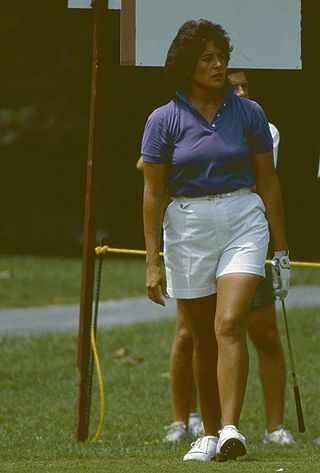
Nancy Marie Lopez is an American former professional golfer. She became a member of the LPGA Tour in 1977 and won 48 LPGA Tour events, including three major championships.
Elizabeth Strout, American novelist and short story writer births

Elizabeth Strout is an American novelist and author. She is widely known for her works in literary fiction and her descriptive characterization. She was born and raised in Portland, Maine, and her experiences in her youth served as inspiration for her novels–the fictional "Shirley Falls, Maine" is the setting of four of her seven novels.
Justin Welby, English archbishop births

Justin Portal Welby is a British bishop who is the 105th Archbishop of Canterbury. He has served in that role since 2013. Welby was previously the vicar of Southam, Warwickshire, and then Bishop of Durham, serving for just over a year. Ex officio, he is the Primate of All England and the symbolic head primus inter pares of the worldwide Anglican Communion.
Clive Woodward, English rugby player and coach births

Sir Clive Ronald Woodward is an English former rugby union player and coach. He was coach of the England team from 1997 to 2004, managing them to victory in the 2003 Rugby World Cup. He also coached the 2005 British & Irish Lions tour to New Zealand, losing the test series 3-0. He is currently a pundit for ITV Sport, working on their coverage of the Six Nations and Rugby World Cup.
Rowan Atkinson, English actor, producer, and screenwriter births

Rowan Sebastian Atkinson is an English actor, comedian and writer. He played the title roles on the sitcoms Blackadder (1983–1989) and Mr. Bean (1990–1995), and the film series Johnny English (2003–2018). Atkinson first came to prominence in the BBC sketch comedy show Not the Nine O'Clock News (1979–1982), receiving the 1981 British Academy Television Award for Best Entertainment Performance, and The Secret Policeman's Ball (1979) where he performed a skit. Subsequent skits on stage have featured solo performances as well as collaborations.
Anthony Minghella, English director and screenwriter (d. 2008) births

Anthony Minghella, was a British film director, playwright and screenwriter. He was chairman of the board of Governors at the British Film Institute between 2003 and 2007.
Malcolm Young, Scottish-Australian singer-songwriter, guitarist, and producer (d. 2017) births

Malcolm Mitchell Young was an Australian musician who was the co-founder, rhythm guitarist, backing vocalist and songwriter of AC/DC. Except for a brief absence in 1988, he was with the band from its beginning in 1973 until retiring in 2014 due to health reasons. As a member of AC/DC, he was inducted into the Rock and Roll Hall of Fame in 2003.
Don Gullett, American baseball player and coach births

Donald Edward Gullett is an American former professional baseball player and coach. He played in Major League Baseball as a left-handed pitcher from 1970 through 1978, most notably as a member of the Cincinnati Reds dynasty that won four National League pennants and two World Series championships between 1970 and 1976. Gullett was also a member of the New York Yankees teams that won two consecutive World Series championships in 1977 and 1978. After his playing career, he served as pitching coach for the Cincinnati Reds from 1993 to 2005. In 2002, he was inducted into the Cincinnati Reds Hall of Fame.
Kim Wilson, American singer-songwriter and harmonica player births
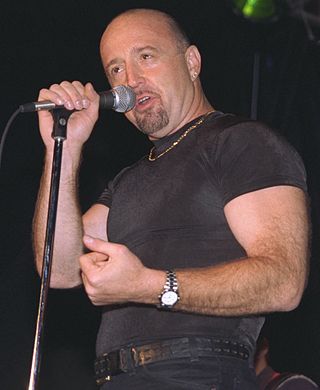
Kim Wilson is an American blues singer and harmonica player. He is best known as the lead vocalist and frontman for the Fabulous Thunderbirds on two hit songs of the 1980s, "Tuff Enuff" and "Wrap It Up."
Louis Freeh, American lawyer and jurist, 10th Director of the Federal Bureau of Investigation births
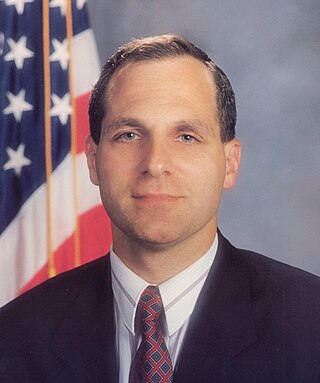
Louis Joseph Freeh is an American attorney and former judge who served as the fifth Director of the Federal Bureau of Investigation from September 1993 to June 2001.

The director of the Federal Bureau of Investigation is the head of the Federal Bureau of Investigation, a United States' federal law enforcement agency, and is responsible for its day-to-day operations. The FBI Director is appointed for a single 10-year term by the President of the United States and confirmed by the Senate. The FBI is an agency within the Department of Justice (DOJ), and thus the Director reports to the Attorney General of the United States.
Mike Boit, Kenyan runner and academic (estimated date) births

Michael (Mike) Kipsugut Boit is a Kenyan former professional middle-distance athlete whose career spanned fifteen years. He is a professor at Kenyatta University in the Department of Exercise and Sports Science. He is an uncle to Philip Boit, who became the first Kenyan athlete to compete in the Winter Olympics.
Carolyn D. Wright, American poet and academic (d. 2016) births

Carolyn D. Wright was an American poet. She was a MacArthur Fellow, a Guggenheim Fellow, and the Poet Laureate of Rhode Island.
Victor Fleming, American director, producer, and cinematographer (b. 1883) deaths

Victor Lonzo Fleming was an American film director, cinematographer, and producer. His most popular films were Gone with the Wind, for which he won an Academy Award for Best Director, and The Wizard of Oz. Fleming has those same two films listed in the top 10 of the American Film Institute's 2007 AFI's 100 Years...100 Movies list.
Guy Gardner, American colonel and astronaut births

Guy Spence Gardner is a United States Air Force officer and a former astronaut. He holds the rank of colonel. He flew as pilot on two Space Shuttle missions, STS-27 and STS-35. Gardner was also the 12th president of the Williamson College of the Trades.
Dayle Hadlee, New Zealand cricketer births
Dayle Robert Hadlee is a New Zealand former cricketer who played in 26 Tests and 11 ODIs from 1969 to 1978. He is the son of Walter Hadlee, the older brother of Sir Richard Hadlee and the younger brother of Barry Hadlee.
Sandy Denny, English folk-rock singer-songwriter (d 1978) births

Alexandra Elene MacLean Denny was an English singer who was lead singer of the British folk rock band Fairport Convention. She has been described as "the pre-eminent British folk rock singer".
Syd Barrett, English singer-songwriter and guitarist (d. 2006) births

Roger Keith "Syd" Barrett was an English singer, songwriter, and musician who co-founded the rock band Pink Floyd in 1965. Barrett was their original frontman and primary songwriter, becoming known for his whimsical style of psychedelia, English-accented singing, and stream-of-consciousness writing style. As a guitarist, he was influential for his free-form playing and for employing effects such as dissonance, distortion, echo and feedback.
Barry John, Welsh rugby player births
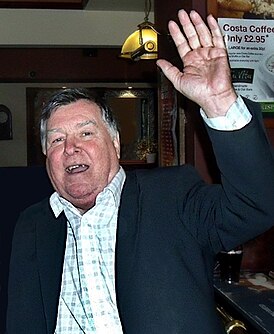
Barry John is a former Welsh rugby union fly-half who played, during the amateur era of the sport, in the 1960s, and early 1970s. John began his rugby career as a schoolboy playing for his local team Cefneithin RFC before switching to first-class west Wales team Llanelli RFC in 1964. It was while at Llanelli that John was first selected for the Wales national team, a shock selection as a replacement for David Watkins to face a touring Australian team.
Vladimir Vernadsky, Russian mineralogist and chemist (b. 1863) deaths

Vladimir Ivanovich Vernadsky or Volodymyr Ivanovych Vernadsky was a Russian, Ukrainian and Soviet mineralogist and geochemist who is considered one of the founders of geochemistry, biogeochemistry, and radiogeology. He was one of the founders and the first president of the Ukrainian Academy of Sciences. Vladimir Vernadsky is most noted for his 1926 book The Biosphere in which he inadvertently worked to popularize Eduard Suess' 1885 term biosphere, by hypothesizing that life is the geological force that shapes the earth. In 1943 he was awarded the Stalin Prize. Vernadsky's portrait is depicted on the Ukrainian ₴1,000 hryvnia banknote.
Bonnie Franklin, American actress and singer (d. 2013) births
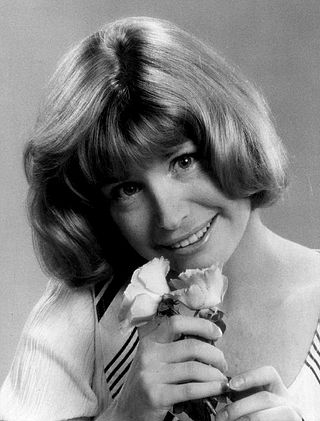
Bonnie Gail Franklin was an American actress, known for her leading role as Ann Romano in the television series One Day at a Time (1975–1984). She was nominated for Emmy, Tony, and Golden Globe Awards.
Alan Stivell, French singer-songwriter and harp player births
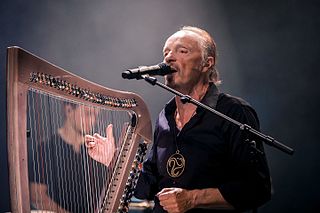
Alan Stivell is a French, Breton and Celtic musician and singer, songwriter, recording artist, and master of the Celtic harp. From the early 1970s, he revived global interest in the Celtic harp and Celtic music as part of world music. As a bagpiper and bombard player, he modernized traditional Breton music and singing in the Breton language. A precursor of Celtic rock, he is inspired by the union of the Celtic cultures and is a keeper of the Breton culture.
Rolf M. Zinkernagel, Swiss immunologist and academic, Nobel Prize laureate births

Rolf Martin Zinkernagel is Professor of Experimental Immunology at the University of Zurich. He was awarded the Nobel Prize in Physiology or Medicine in 1996 for the discovery of how the immune system recognizes virus-infected cells.

The Nobel Prize in Physiology or Medicine is awarded yearly by the Nobel Assembly at the Karolinska Institute for outstanding discoveries in physiology or medicine. The Nobel Prize is not a single prize, but five separate prizes that, according to Alfred Nobel's 1895 will, are awarded "to those who, during the preceding year, have conferred the greatest benefit to humankind". Nobel Prizes are awarded in the fields of Physics, Chemistry, Physiology or Medicine, Literature, and Peace.
Jacques Rosenbaum, Estonian-German architect (b. 1878) deaths
Jacques Rosenbaum was an Estonian architect of Baltic German descent. Between 1904–07 he served as municipal architect of Tartu, Estonia, and is best known for his Art Nouveau buildings in Tallinn.
Ida Tarbell, American journalist, reformer, and educator (b. 1857) deaths

Ida Minerva Tarbell was an American writer, investigative journalist, biographer and lecturer. She was one of the leading muckrakers of the Progressive Era of the late 19th and early 20th centuries and pioneered investigative journalism.
Terry Venables, English footballer and manager births
Terence Frederick Venables, often referred to as El Tel, is an English former football player and manager, and an author. During the 1960s and '70s, he played for various clubs including Chelsea, Tottenham Hotspur and Queens Park Rangers, and gained two caps for England.
Emma Calvé, French soprano and actress (b. 1858) deaths

Emma Calvé, born Rosa Emma Calvet was a French operatic soprano.
Henri de Baillet-Latour, Belgian businessman, 3rd President of the International Olympic Committee (b. 1876) deaths

Henri de Baillet-Latour, Count of Baillet-Latour was a Belgian aristocrat and the third president of the International Olympic Committee (IOC).
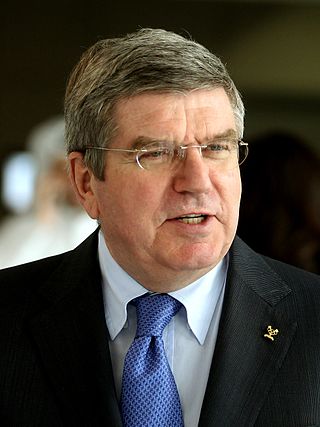
The president of the International Olympic Committee is head of the executive board that assumes the general overall responsibility for the administration of the International Olympic Committee (IOC) and the management of its affairs. The IOC Executive Board consists of the president, four vice-presidents and ten other IOC members; all of the board members are elected by the IOC Session, using a secret ballot, by a majority vote.
Charley O'Leary, American baseball player and coach (b. 1882) deaths

Charles Timothy O'Leary was an American professional baseball shortstop who played eleven seasons with the Detroit Tigers (1904–1912), St. Louis Cardinals (1913), and St. Louis Browns (1934) of Major League Baseball (MLB).
Van McCoy, American singer-songwriter and producer (d. 1979) births
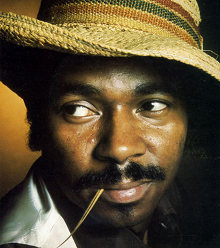
Van Allen Clinton McCoy was an American musician, record producer, arranger, songwriter, singer and orchestra conductor. He is known for his 1975 internationally successful song "The Hustle". He has approximately 700 song copyrights to his credit, and for producing songs by such recording artists as Gladys Knight & the Pips, The Stylistics, Aretha Franklin, Brenda & the Tabulations, David Ruffin, Peaches & Herb, Lesley Gore and Stacy Lattisaw.
Valeriy Lobanovskyi, Ukrainian footballer and manager (d. 2002) births
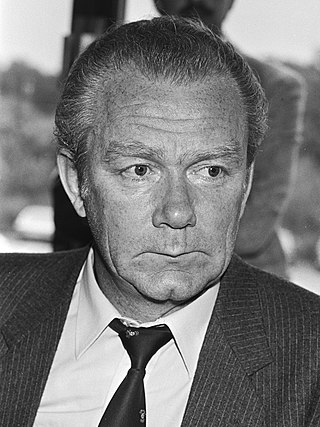
Valeriy Vasylyovych Lobanovskyi was а Soviet football player and manager. He was Master of Sports of the USSR, Distinguished Coach of the USSR, and a laureate of the UEFA Order of Merit in Ruby (2002) and FIFA Order of Merit, the highest honour awarded by FIFA. In 2002 he was awarded the Hero of Ukraine award (posthumously), his nation's highest honour, for his contribution to Ukrainian football. In 2008, Lobanovskyi was ranked 6th in Inter's list of the 100 Greatest Ukrainians following a nationwide poll that saw around 2.5 million people casting their votes.
Murray Rose, English-Australian swimmer and sportscaster (d. 2012) births

Iain Murray Rose, was an Australian swimmer, actor, sports commentator and marketing executive. He was a six-time Olympic medalist, and at one time held the world records in the 400-metre, 800-metre, and 1500-metre freestyle. He made his Olympic debut at the 1956 Summer Olympics as a 17-year-old and won three Olympic medals, all gold. Four years later, as a 21-year-old, he won three Olympic medals at the 1960 Summer Olympics.
Gustavs Zemgals, Latvian journalist and politician, 2nd President of Latvia (b. 1871) deaths
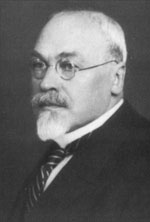
Gustavs Zemgals was a Latvian politician and the second President of Latvia. He also was twice the mayor of Riga.

The president of Latvia is head of state and commander-in-chief of the National Armed Forces of the Republic of Latvia.
Adriano Celentano, Italian singer-songwriter, actor, and director births
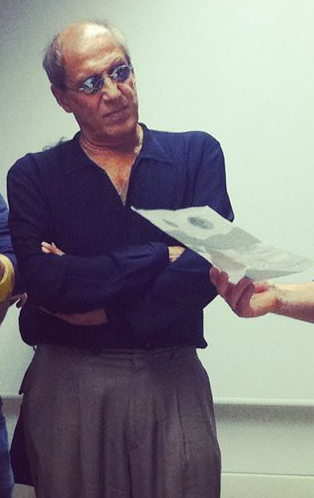
Adriano Celentano is an Italian musician, singer, composer, actor, and filmmaker. He is dubbed "il Molleggiato" because of his dancing.
Adrienne Clarke, Australian botanist and academic births
Adrienne Elizabeth Clarke is Professor Emeritus of Botany at the University of Melbourne, where she ran the Plant Cell Biology Research Centre from 1982–1999. She is a former chairman of the Commonwealth Scientific and Industrial Research Organisation, former Lieutenant Governor of Victoria (1997–2000) and former Chancellor of La Trobe University (2011–2017).
Larisa Shepitko, Soviet film director, screenwriter, and actress (d. 1979) births
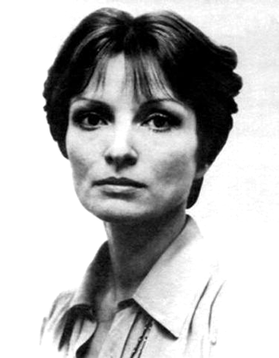
Larisa Yefimovna Shepitko was a Ukrainian Soviet film director, screenwriter and actress. She is considered one of the best female directors of all time, with her film The Ascent being the second film directed by a woman to win a Golden Bear and the third film directed by a woman to win a top award at a major European film festival.
Ludvík Daněk, Czech discus thrower (d. 1998) births

Ludvík Daněk was a Czechoslovak discus thrower, who won the gold medal at the 1972 Olympic Games with a throw of 64.40 m (211'3").
Lou Holtz, American football player, coach, and sportscaster births
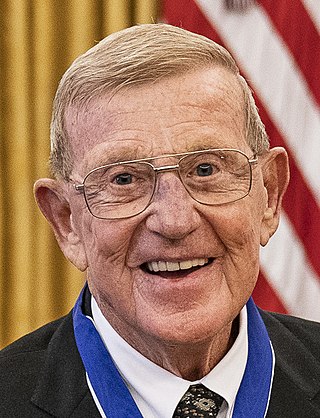
Louis Leo Holtz is a former American football player, coach, and analyst. He served as the head football coach at The College of William & Mary (1969–1971), North Carolina State University (1972–1975), the New York Jets (1976), the University of Arkansas (1977–1983), the University of Minnesota (1984–1985), the University of Notre Dame (1986–1996), and the University of South Carolina (1999–2004), compiling a career record of 249–132–7. Holtz's 1988 Notre Dame team went 12–0 with a victory in the Fiesta Bowl and was the consensus national champion. Holtz is the only college football coach to lead six different programs to bowl games and the only coach to guide four different programs to the final top 20 rankings.
Doris Troy, American singer-songwriter (d. 2004) births
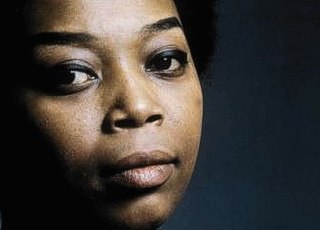
Doris Troy was an American R&B singer and songwriter, known to her many fans as "Mama Soul". Her biggest hit was "Just One Look", a top 10 hit in 1963.
André Bessette, Canadian saint (b. 1845) deaths

André Bessette, C.S.C., more commonly known as Brother André, and since his canonization as Saint André of Montreal, was a lay brother of the Congregation of Holy Cross and a significant figure of the Catholic Church among French-Canadians, credited with thousands of reported miraculous oil healings associated with his pious devotion to Saint Joseph.
Darlene Hard, American tennis player births

Darlene Ruth Hard was an American professional tennis player, known for her aggressive volleying ability and strong serves. She captured singles titles at the French Championships in 1960 and the U.S. Championships in 1960 and 1961.
Julio María Sanguinetti, Uruguayan journalist, lawyer, and politician, 29th President of Uruguay births

Julio María Sanguinetti Coirolo is a Uruguayan politician, lawyer and journalist, who twice served as President of Uruguay for the Partido Colorado.

The president of Uruguay, officially known as the president of the Oriental Republic of Uruguay, is the head of state and head of government of Uruguay. Their rights are determined in the Constitution of Uruguay. Along with the Secretariat of the Presidency, the Council of Ministers and the director of the Office of Planning and Budget, the President is part of the executive branch. In case of absence, their office is exercised by the vice president. In turn, the president of the republic is the commander in chief of the Armed Forces.
Ian Meckiff, Australian cricketer births
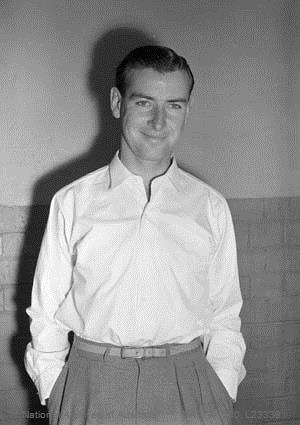
Ian Meckiff is a former cricketer who represented Australia in 18 Test matches between 1957 and 1963. A left-arm fast bowler, he is best known for two matters that were unrelated to his skill as a player: he was the batsman run out by Joe Solomon in 1960, causing the first Tied Test in cricket history; and in December 1963, his career was sensationally ended when he was called for throwing in the First Test against South Africa by Australian umpire Col Egar. During the late 1950s and early 1960s, there had been a media frenzy about the perceived prevalence of illegal bowling actions in world cricket. The controversy and speculation that dogged Meckiff in the years preceding his final match caused sections of the cricket community to believe that he had been made a scapegoat by the Australian cricket authorities to prove their intent to stamp out throwing.
Nino Tempo, American musician, singer, and actor births
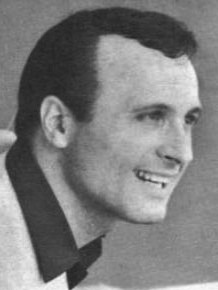
Nino Tempo is an American musician, singer, and actor. He was a duet partner with his older sister April Stevens as well as the frontman for a 1970s funk band, 5th Ave. Sax.
Harry M. Miller, New Zealand-Australian talent agent and publicist (d. 2018) births
Harry Maurice Miller was a New Zealand Australian promoter, publicist and media agent.
Sylvia Syms, English actress births
Sylvia May Laura Syms is an English actress, best known for her roles in the films Woman in a Dressing Gown (1957), Ice Cold in Alex (1958), No Trees in the Street (1959), Victim (1961), and The Tamarind Seed (1974). In 2006 she portrayed The Queen Mother in the Stephen Frears movie The Queen, about the death of Diana, Princess of Wales, and days leading up to Diana's funeral. She remains active in films, television and theatre.
Herbert Chapman, English footballer and manager (b. 1878) deaths

Herbert Chapman was an English football player and manager. Though he had an undistinguished playing career, he went on to become one of the most influential and successful managers in the early 20th century, before his sudden death in 1934. He is regarded as one of the game's greatest innovators.
Oleg Grigoryevich Makarov, Russian engineer and astronaut (d. 2003) births

Oleg Grigoryevich Makarov was a Soviet cosmonaut.
Vladimir de Pachmann, Ukrainian-German pianist (b. 1848) deaths

Vladimir de Pachmann or Pachman was a pianist of Russian-German ethnicity, especially noted for performing the works of Chopin and for his eccentric performing style.
Stuart A. Rice, American chemist and academic births
Stuart Alan Rice is an American theoretical chemist and physical chemist. He is well known as a theoretical chemist who also does experimental research, having spent much of his career working in multiple areas of physical chemistry. He is currently the Frank P. Hixon Distinguished Service Professor Emeritus at the University of Chicago. During his tenure at the University of Chicago, Rice has trained more than 100 Ph.D. students and postdoctoral researchers. He received the National Medal of Science in 1999.
E. L. Doctorow, American novelist, playwright, and short story writer (d. 2015) births

Edgar Lawrence Doctorow was an American novelist, editor, and professor, best known for his works of historical fiction.
Graeme Hole, Australian cricketer (d. 1990) births
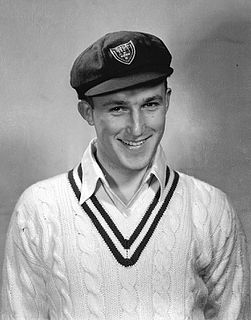
Graeme Blake Hole was an Australian cricketer who played 18 Test matches between 1951 and 1955.
Dickie Moore, Canadian ice hockey player and businessman (d. 2015) births
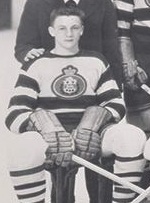
Richard Winston "Dickie" Moore was a Canadian professional hockey player, successful businessman and community philanthropist. He twice won the Art Ross Trophy as the National Hockey League's leading scorer and was inducted into the Hockey Hall of Fame. Moore spent much of his career with the Montreal Canadiens, but also played briefly with the Toronto Maple Leafs and St. Louis Blues. In 2017 Moore was named one of the '100 Greatest NHL Players' in history.
Vic Tayback, American actor (d. 1990) births

Victor E. Tayback was an American actor. He is known for his role as Mel Sharples in the film Alice Doesn't Live Here Anymore (1974) and the television series Alice (1976–1985). The latter earned him two consecutive Golden Globe Awards and a Primetime Emmy Award nomination.
Capucine, French actress and model (d. 1990) births

Capucine was a French fashion model and actress known for her comedic roles in The Pink Panther (1963) and What's New Pussycat? (1965). She appeared in 36 films and 17 television productions between 1948 and 1990.
Alvin Kraenzlein, American hurdler and long jumper (b. 1876) deaths

Alvin Christian "Al" Kraenzlein was an American track-and-field athlete known as "the father of the modern hurdling technique". He was the first sportsman in the history of the Olympic games to win four individual gold medals in a single discipline at the 1900 Summer Olympics in Paris. As of 2016, Alvin Kraenzlein is the only track-and-field athlete who has won four individual titles at one Olympics. Kraenzlein is also known for developing a pioneering technique of straight-leg hurdling, which allowed him to set two world hurdle records. He is an Olympic Hall of Fame (1984) and National Track and Field Hall of Fame (1974) inductee.
Wilhelm Ramsay, Finnish geologist and professor (b. 1865) deaths

Wilhelm Ramsay was a Finland Swede geologist. He became a member of the Royal Swedish Academy of Sciences in 1914 and in 1915 was accepted into the Royal Physiographic Society in Lund. He coined the terms Fennoscandia (1900) and Postjotnian (1909). Ramsay also coined the term ijolite.
Jesse Leonard Steinfeld, American physician and academic, 11th Surgeon General of the United States (d. 2014) births

Jesse Leonard Steinfeld was an American physician and public health official. He was appointed the eleventh surgeon general of the United States from 1969 to 1973.

The surgeon general of the United States is the operational head of the United States Public Health Service Commissioned Corps (PHSCC) and thus the leading spokesperson on matters of public health in the federal government of the United States. The Surgeon General's office and staff are known as the Office of the Surgeon General (OSG), which is housed within the Office of the Assistant Secretary for Health.
Ralph Branca, American baseball player (d. 2016) births
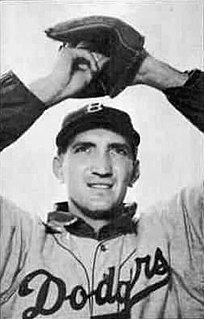
Ralph Theodore Joseph "Hawk" Branca was an American professional baseball pitcher who played 12 seasons in Major League Baseball (MLB), from 1944 through 1956. Branca played for the Brooklyn Dodgers, Detroit Tigers (1953–1954), and New York Yankees (1954). He was a three-time All-Star. In a 1951 playoff, Branca surrendered a walk-off home run to Bobby Thomson of the New York Giants; the game-winning hit was known as the "Shot Heard 'Round the World".
Pat Flaherty, American race car driver (d. 2002) births

George Francis Flaherty, Jr., known professionally as Pat Flaherty, was an American racecar driver who won the Indianapolis 500 in 1956.
Mickey Hargitay, Hungarian-American actor and bodybuilder (d. 2006) births

Mickey Hargitay, born Miklós Karoly Hargitay, was a Hungarian-American actor and the 1955 Mr. Universe.
John DeLorean, American engineer and businessman, founded the DeLorean Motor Company (d. 2005) births

John Zachary DeLorean was an American engineer, inventor, and executive in the U.S. automobile industry, widely known for his work at General Motors and as founder of the DeLorean Motor Company.
The DeLorean Motor Company (DMC) was an American automobile manufacturer formed by automobile industry executive John DeLorean in 1975. It is remembered for the one model it produced—the stainless steel DeLorean sports car featuring gull-wing doors—and for its brief and turbulent history, ending in receivership and bankruptcy in 1982. In October 1982, John DeLorean was videotaped in a sting operation agreeing to bankroll drug trafficking, but was acquitted in the subsequent trial on the basis of entrapment.
Kim Dae-jung, South Korean soldier and politician, 8th President of South Korea, Nobel Prize laureate (d. 2009) births

Kim Dae-jung, was a South Korean politician and activist who served as the eighth president of South Korea from 1998 to 2003.

The president of the Republic of Korea, also known as the president of South Korea, is the head of state and head of government of the Republic of Korea. The president leads the State Council, and is the chief of the executive branch of the national government as well as the commander-in-chief of the Republic of Korea Armed Forces.
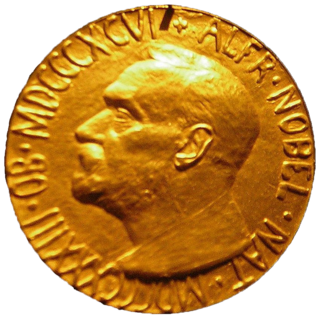
The Nobel Peace Prize is one of the five Nobel Prizes established by the will of Swedish industrialist, inventor and armaments manufacturer Alfred Nobel, along with the prizes in Chemistry, Physics, Physiology or Medicine and Literature. Since March 1901, it has been awarded annually to those who have "done the most or the best work for fraternity between nations, for the abolition or reduction of standing armies and for the holding and promotion of peace congresses".
Earl Scruggs, American banjo player (d. 2012) births

Earl Eugene Scruggs was an American musician noted for popularizing a three-finger banjo picking style, now called "Scruggs style", which is a defining characteristic of bluegrass music. His three-finger style of playing was radically different from the traditional way the five-string banjo had previously been played. This new style of playing became popular and elevated the banjo from its previous role as a background rhythm instrument to featured solo status. He popularized the instrument across several genres of music.
Vladimir Kazantsev, Russian runner (d. 2007) births
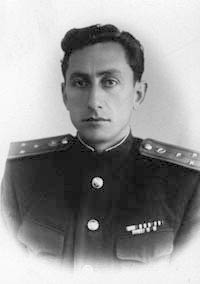
Vladimir Dmitriyevich Kazantsev was a Russian long-distance runner who won a silver medal in the 3000 m steeplechase at the 1952 Olympics. He set world's best times in this event in 1951 and 1952 and won the Soviet title in 1950–53. In the Olympic final he had a 20 m lead with 700 m remaining, but injured a tendon in a bad landing after a water jump, and was overtaken by Horace Ashenfelter.
Norman Kirk, New Zealand engineer and politician, 29th Prime Minister of New Zealand (d. 1974) births
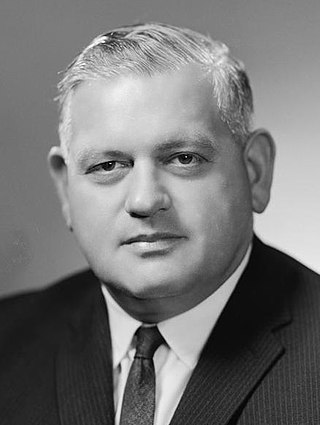
Norman Eric Kirk was a New Zealand politician who served as the 29th prime minister of New Zealand from 1972 until his sudden death in 1974.

The prime minister of New Zealand is the head of government of New Zealand. The incumbent prime minister, Jacinda Ardern, leader of the New Zealand Labour Party, took office on 26 October 2017.
Jacobo Timerman, Argentinian journalist and author (d. 1999) births
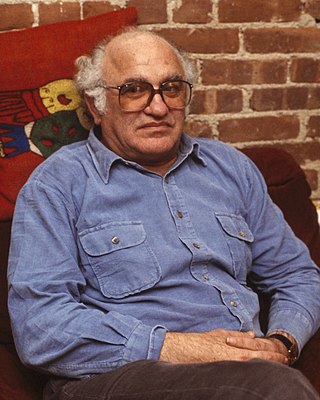
Jacobo Timerman, was a Soviet-born Argentine publisher, journalist, and author, who is most noted for his confronting and reporting the atrocities of the Argentine military regime's Dirty War during a period of widespread repression in which an estimated 30,000 political prisoners were disappeared. He was persecuted, tortured and imprisoned by the Argentine junta in the late 1970s and was exiled in 1979 with his wife to Israel. He was widely honored for his work as a journalist and publisher.
Jakob Rosanes, Ukrainian-German mathematician and chess player (b. 1842) deaths

Jakob Rosanes was a German mathematician who worked on algebraic geometry and invariant theory. He was also a chess master.
Marianne Grunberg-Manago, Russian-French biochemist and academic (d. 2013) births

Marianne Grunberg-Manago was a Soviet-born French biochemist. Her work helped make possible key discoveries about the nature of the genetic code. Grunberg-Manago was the first woman to lead the International Union of Biochemistry and the 400-year-old French Academy of Sciences.
Cary Middlecoff, American golfer and sportscaster (d. 1998) births

Emmett Cary Middlecoff was an American professional golfer on the PGA Tour from 1947 to 1961. His 39 Tour wins place him tied for tenth all-time, and he won three major championships. Middlecoff graduated as a dentist, but gave up his practice at age 26 to become a full-time Tour golfer.
Devil Anse Hatfield, American guerrilla leader (b. 1839) deaths
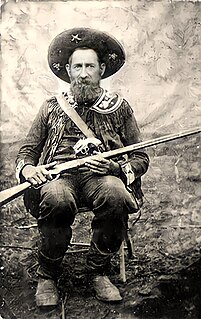
William Anderson Hatfield, better known as Devil Anse, was the patriarch of the Hatfield clan during the infamous Hatfield–McCoy feud which has since formed part of American folklore. Anse survived the feud and agreed to end it in 1891.

Guerrilla warfare is a form of irregular warfare in which small groups of combatants, such as paramilitary personnel, armed civilians, or irregulars, use military tactics including ambushes, sabotage, raids, petty warfare, hit-and-run tactics, and mobility, to fight a larger and less-mobile traditional military.
John Maynard Smith, English biologist and geneticist (d. 2004) births

John Maynard Smith was a British theoretical and mathematical evolutionary biologist and geneticist. Originally an aeronautical engineer during the Second World War, he took a second degree in genetics under the well-known biologist J. B. S. Haldane. Maynard Smith was instrumental in the application of game theory to evolution with George R. Price, and theorised on other problems such as the evolution of sex and signalling theory.
Sun Myung Moon, Korean religious leader; founder of the Unification Church (d. 2012) births

Sun Myung Moon was a Korean religious leader, also known for his business ventures and support for conservative political causes. A messiah claimant, he was the founder of the Unification movement, and of its widely noted "Blessing" or mass wedding ceremonies, and the author of its unique theology the Divine Principle. He was an anti-communist and an advocate for Korean reunification, for which he was recognized by the governments of both North and South Korea. Businesses he promoted included News World Communications, an international news media corporation known for its American subsidiary The Washington Times, and Tongil Group, a South Korean business group (chaebol), as well as other related organizations.

The Family Federation for World Peace and Unification, widely known as the Unification Church, is a new religious movement, whose members are called Unificationists, or "Moonies". It was officially founded on 1 May 1954 under the name Holy Spirit Association for the Unification of World Christianity (HSA-UWC) in Seoul, South Korea, by Sun Myung Moon (1920–2012). Moon and his wife Hak Ja Han were the leaders of the church and are honored by its members as their "True Parents."
Early Wynn, American baseball player, coach, and sportscaster (d. 1999) births

Early Wynn Jr., nicknamed "Gus", was an American professional baseball right-handed pitcher. He played in Major League Baseball (MLB) for the Washington Senators, Cleveland Indians, and Chicago White Sox, during his 23-year MLB career. Wynn was identified as one of the most intimidating pitchers in the game, having combined his powerful fastball with a hard attitude toward batters. He was inducted into the Baseball Hall of Fame in 1972.
Theodore Roosevelt, American colonel and politician, 26th President of the United States (b. 1858) deaths

Theodore Roosevelt Jr., often referred to as Teddy or by his initials, T. R., was an American politician, statesman, soldier, conservationist, naturalist, historian, and writer who served as the 26th president of the United States from 1901 to 1909. He previously served as the 25th vice president under President William McKinley from March to September 1901 and as the 33rd governor of New York from 1899 to 1900. Assuming the presidency after McKinley's assassination, Roosevelt emerged as a leader of the Republican Party and became a driving force for anti-trust and Progressive policies.

The president of the United States (POTUS) is the head of state and head of government of the United States of America. The president directs the executive branch of the federal government and is the commander-in-chief of the United States Armed Forces.
Georg Cantor, German mathematician and philosopher (b. 1845) deaths

Georg Ferdinand Ludwig Philipp Cantor was a German mathematician. He played a pivotal role in the creation of set theory, which has become a fundamental theory in mathematics. Cantor established the importance of one-to-one correspondence between the members of two sets, defined infinite and well-ordered sets, and proved that the real numbers are more numerous than the natural numbers. In fact, Cantor's method of proof of this theorem implies the existence of an infinity of infinities. He defined the cardinal and ordinal numbers and their arithmetic. Cantor's work is of great philosophical interest, a fact he was well aware of.
Koo Chen-fu, Taiwanese businessman and diplomat (d. 2005) births

Koo Chen-fu, also known as C.F. Koo, was a Taiwanese businessman and diplomat. He led the Koos Group of companies from 1940 until his death. As a chairman of the Straits Exchange Foundation (SEF), Koo arranged the first direct talks between Taiwan and mainland China since 1949 and served as Taiwan's negotiator in both the 1993 and 1998 Wang-Koo summit.
Hendrick Peter Godfried Quack, Dutch economist and historian (b. 1834) deaths

Hendrick Peter Godfried Quack was a Dutch legal scholar, economist and historian, who is best known for his work De socialisten: Personen en stelsels.
Park Mok-wol, influential Korean poet and academic (d. 1978) births

Pak Mok-wol was an influential Korean poet and academic.
Don Edwards, American soldier, lawyer, and politician (d. 2015) births

William Donlon Edwards was an American politician of the Democratic Party and a member of the United States House of Representatives from California for 32 years in the late 20th century.
John C. Lilly, American psychoanalyst, physician, and philosopher (d. 2001) births

John Cunningham Lilly was an American physician, neuroscientist, psychoanalyst, psychonaut, philosopher, writer and inventor. He was a member of a generation of counterculture scientists and thinkers that included Timothy Leary, Ram Dass, and Werner Erhard, all frequent visitors to the Lilly home. He often stirred controversy, especially among mainstream scientists.
Alan Watts, English-American philosopher and author (d. 1973) births
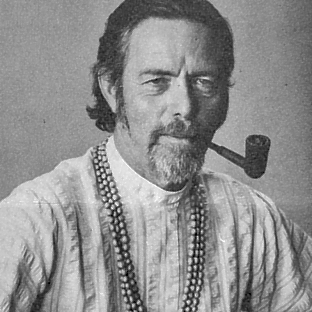
Alan Wilson Watts was an English writer, speaker and self-styled "philosophical entertainer", known for interpreting and popularising Japanese, Chinese and Indian traditions of Buddhist, Taoist, and Hindu philosophy for a Western audience. Born in Chislehurst, England, he moved to the United States in 1938 and began Zen training in New York. He received a master's degree in theology from Seabury-Western Theological Seminary and became an Episcopal priest in 1945. He left the ministry in 1950 and moved to California, where he joined the faculty of the American Academy of Asian Studies.
Godfrey Edward Arnold, Austrian-American physician and academic (d. 1989) births
Godfrey Edward Arnold, born as Gottfried Eduard Arnold, was an Austrian American professor of medicine and researcher. His studies centered on speech, speech disorder and clinical communicology.
Edward Gierek, Polish lawyer and politician (d. 2001) births

Edward Gierek was a Polish Communist politician and de facto leader of Poland between 1970 and 1980. Gierek replaced Władysław Gomułka as First Secretary of the ruling Polish United Workers' Party (PZPR) in the Polish People's Republic in 1970. He is known for opening communist Poland to the Western Bloc and for his economic policies based on foreign loans. He was removed from power after labour strikes led to the Gdańsk Agreement between the communist state and workers of the emerging Solidarity free trade union movement.
Loretta Young, American actress (d. 2000) births

Loretta Young was an American actress. Starting as a child, she had a long and varied career in film from 1917 to 1953. She won the Academy Award for Best Actress for her role in the film The Farmer's Daughter (1947), and received her second Academy Award nomination for her role in Come to the Stable (1949). Young moved to the relatively new medium of television, where she had a dramatic anthology series, The Loretta Young Show, from 1953 to 1961. It earned three Emmy Awards, and was re-run successfully on daytime TV and later in syndication. In the 1980s, Young returned to the small screen and won a Golden Globe for her role in Christmas Eve in 1986.
Frederick Hitch, English soldier, Victoria Cross recipient (b. 1856) deaths

Frederick Hitch, VC was an English recipient of the Victoria Cross for his actions at the Battle of Rorke's Drift, the highest award for gallantry in the face of the enemy that can be awarded to British and Commonwealth forces.
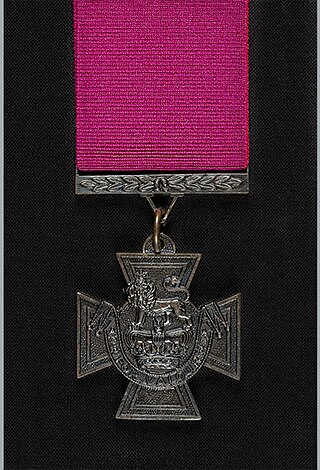
The Victoria Cross (VC) is the highest and most prestigious award of the British honours system. It is awarded for valour "in the presence of the enemy" to members of the British Armed Forces and may be awarded posthumously. It was previously awarded by countries of the Commonwealth of Nations, most of which have established their own honours systems and no longer recommend British honours. It may be awarded to a person of any military rank in any service and to civilians under military command. No civilian has received the award since 1879. Since the first awards were presented by Queen Victoria in 1857, two-thirds of all awards have been personally presented by the British monarch. The investitures are usually held at Buckingham Palace.
Jacques Ellul, French philosopher and critic (d. 1994) births
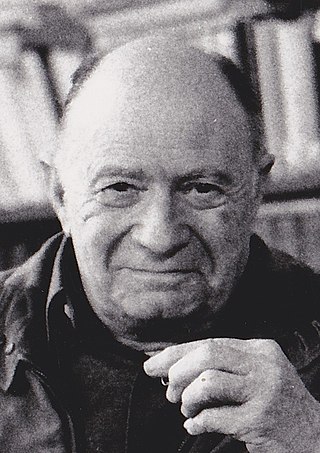
Jacques Ellul was a French philosopher, sociologist, lay theologian, and professor who was a noted Christian anarchist. Ellul was a longtime Professor of History and the Sociology of Institutions on the Faculty of Law and Economic Sciences at the University of Bordeaux. A prolific writer, he authored more than 60 books and more than 600 articles over his lifetime, many of which discussed propaganda, the impact of technology on society, and the interaction between religion and politics.
Danny Thomas, American actor, comedian, producer, and humanitarian (d. 1991) births

Danny Thomas was an American actor, singer, nightclub comedian, producer, and philanthropist. He created and starred in one of the most successful and long-running situation comedies in the history of American network television, the Danny Thomas Show. In addition to guest roles on many of the comedy, talk, and musical variety programs of his time, his legacy includes a lifelong dedication to fundraising for charity. Most notably, he was the founder of St. Jude Children's Research Hospital in Memphis, Tennessee, a leading center in pediatric medicine with a focus on pediatric cancer. St. Jude now has affiliate hospitals in eight other American cities as of early 2020.
Kid Chocolate, Cuban boxer (d. 1988) births

Eligio Sardiñas Montalvo, better known as Kid Chocolate, was a Cuban boxer who enjoyed great success both in the boxing ring and outside it during the 1930s. Chocolate boxed professionally between 1927 and 1938. His record was 136 wins, 10 losses and 6 draws, 51 wins coming by knockout and one no-decision bout, also making Ring magazine's list of boxers with 50 or more career knockout wins. He became a member of the International Boxing Hall Of Fame alongside Bass, Berg and Canzoneri.
Wright Morris, American author and photographer (d. 1998) births

Wright Marion Morris was an American novelist, photographer, and essayist. He is known for his portrayals of the people and artifacts of the Great Plains in words and pictures, as well as for experimenting with narrative forms.
Yiannis Papaioannou, Greek composer and educator (d. 1989) births

Yiannis Papaioannou was a Greek composer and teacher of the Modern Era. He studied piano with Marika Laspopoulou and composition with Alekos Kontis at the Hellenic Conservatory in Athens (1922–34), as well as the piano and orchestration with Emilios Riadis in Thessaloniki (1928–29).
Maurice Abravanel, Greek-American pianist and conductor (d. 1993) births

Maurice Abravanel was an American classical music conductor. He is remembered as the conductor of the Utah Symphony Orchestra for over 30 years.
Lars Hertervig, Norwegian painter (b. 1830) deaths

Lars Hertervig was a Norwegian painter. His semi-fantastical work with motives from the coastal landscape in the traditional district of Ryfylke is regarded as one of the peaks of Norwegian painting.
Maria of Yugoslavia, Queen of Yugoslavia (d. 1961) births

Maria of Yugoslavia, known in Serbian as Marija Karađorđević, was Queen of the Serbs, Croats and Slovenes, later Queen of Yugoslavia, as the wife of King Alexander from 1922 until his assassination in 1934. She was the mother of Peter II, the last reigning Yugoslav monarch. Her citizenship was revoked, and her property was confiscated by the Yugoslav communist regime in 1947, but she was "rehabilitated" in 2014.
Heinrich Nordhoff, German engineer (d. 1968) births

Heinz Heinrich Nordhoff was a German engineer who led the Volkswagen company as it was rebuilt after World War II.
James Fitzmaurice, Irish soldier and pilot (d. 1965) births

James Michael Christopher Fitzmaurice DFC was an Irish aviation pioneer. He was a member of the crew of the Bremen, which made the first successful trans-Atlantic aircraft flight from East to West on 12–13 April 1928.
Thomas W. Knox, American journalist and author (b. 1835) deaths

Thomas Wallace Knox was a journalist, author, and world traveler, known primarily for his work as a New York Herald correspondent during the American Civil War. As an author, Knox wrote over 45 books, including a popular series of travel adventure books for boys.
Ted McDonald, Australian cricketer (d. 1937) births
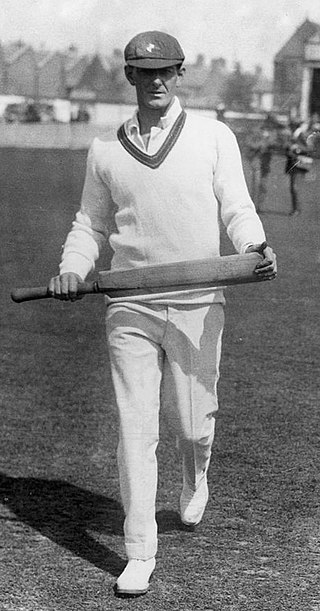
Edgar Arthur "Ted" McDonald was a cricketer who played for Tasmania, Victoria, Lancashire and Australia, as well as being an Australian rules footballer who played with Launceston Football Club, Essendon Football Club, and Fitzroy Football Club.
Bharatendu Harishchandra, Indian author, poet, and playwright (b. 1850) deaths

Bharatendu Harishchandra was an Indian poet, writer and playwright. He authored several dramas, life sketches and travel accounts, using new media such as reports, publications, letters to editors of publications, translations, and literary works to shape public opinion. He has been hailed as a Yug Charan for his writings depicting the exploitative nature of the British Raj.
Gregor Mendel, Czech geneticist and botanist (b. 1822) deaths

Gregor Johann Mendel, OSA was a biologist, meteorologist, mathematician, Augustinian friar and abbot of St. Thomas' Abbey in Brünn (Brno), Margraviate of Moravia. Mendel was born in a German-speaking family in the Silesian part of the Austrian Empire and gained posthumous recognition as the founder of the modern science of genetics. Though farmers had known for millennia that crossbreeding of animals and plants could favor certain desirable traits, Mendel's pea plant experiments conducted between 1856 and 1863 established many of the rules of heredity, now referred to as the laws of Mendelian inheritance.
Kahlil Gibran, Lebanese-American poet, painter, and philosopher (d. 1931) births

Gibran Khalil Gibran, usually referred to in English as Kahlil Gibran, was a Lebanese-American writer, poet and visual artist, also considered a philosopher although he himself rejected the title. He is best known as the author of The Prophet, which was first published in the United States in 1923 and has since become one of the best-selling books of all time, having been translated into more than 100 languages.
Fan S. Noli, Albanian-American bishop and politician, 13th Prime Minister of Albania (d. 1965) births

Theofan Stilian Noli, known as Fan Noli, was an Albanian writer, scholar, diplomat, politician, historian, orator, Archbishop, Metropolitan and founder of the Albanian Orthodox Church and the Albanian Orthodox Archdiocese in America who served as Prime Minister and regent of Albania in 1924 during the June Revolution.

The Prime Minister of Albania, officially styled Prime Minister of the Republic of Albania, is the head of government of the Republic of Albania and the most powerful and influential person in Albanian politics. The prime minister holds the executive power of the nation and represents the Council of Ministers and chairs its meetings.
Sam Rayburn, American lawyer and politician, 48th Speaker of the United States House of Representatives (d. 1961) births

Samuel Taliaferro Rayburn was an American politician who served as the 43rd speaker of the United States House of Representatives. He was a three-time House speaker, former House majority leader, two-time House minority leader, and a 24-term congressman, representing Texas's 4th congressional district as a Democrat from 1913 to 1961. He holds the record for the longest tenure as Speaker of the United States House of Representatives, serving for over 17 years.

The speaker of the United States House of Representatives, commonly known as the speaker of the House, is the presiding officer of the United States House of Representatives. The office was established in 1789 by Article I, Section 2 of the U.S. Constitution. The speaker is the political and parliamentary leader of the House and is simultaneously its presiding officer, de facto leader of the body's majority party, and the institution's administrative head. Speakers also perform various other administrative and procedural functions. Given these several roles and responsibilities, the speaker usually does not personally preside over debates. That duty is instead delegated to members of the House from the majority party. Nor does the speaker regularly participate in floor debates.
Richard Henry Dana Jr., American lawyer and politician (b. 1815) deaths

Richard Henry Dana Jr. was an American lawyer and politician from Massachusetts, a descendant of a colonial family, who gained renown as the author of the classic American memoir Two Years Before the Mast. Both as a writer and as a lawyer, he was a champion of the downtrodden, from seamen to fugitive slaves and freedmen.
Ion Minulescu, Romanian author, poet, and critic (d. 1944) births

Ion Minulescu was a Romanian avant-garde poet, novelist, short story writer, journalist, literary critic, and playwright. Often publishing his works under the pseudonyms I. M. Nirvan and Koh-i-Noor, he journeyed to Paris, where he was heavily influenced by the growing Symbolist movement and Parisian Bohemianism. A herald of Romania's own Symbolist movement, he had a major influence on local modernist literature, and was among the first local poets to use free verse.
Tom Mix, American cowboy and actor (d. 1940) births

Thomas Edwin Mix was an American film actor and the star of many early Western films between 1909 and 1935. He appeared in 291 films, all but nine of which were silent films. He was Hollywood's first Western star and helped define the genre as it emerged in the early days of the cinema.
Adeline Genée, Danish-born British ballerina (d. 1970) births

Dame Adeline Genée DBE was a Danish-British ballet dancer.
Carl Sandburg, American poet and historian (d. 1967) births

Carl August Sandburg was an American poet, biographer, journalist, and editor. He won three Pulitzer Prizes: two for his poetry and one for his biography of Abraham Lincoln. During his lifetime, Sandburg was widely regarded as "a major figure in contemporary literature", especially for volumes of his collected verse, including Chicago Poems (1916), Cornhuskers (1918), and Smoke and Steel (1920). He enjoyed "unrivaled appeal as a poet in his day, perhaps because the breadth of his experiences connected him with so many strands of American life". When he died in 1967, President Lyndon B. Johnson observed that "Carl Sandburg was more than the voice of America, more than the poet of its strength and genius. He was America."
Fred Niblo, American actor, director, and producer (d. 1948) births

Fred Niblo was an American pioneer film actor, director and producer.
Alexander Scriabin, Russian pianist and composer (d. 1915) births

Alexander Nikolayevich Scriabin was a Russian composer and virtuoso pianist. Before 1903, Scriabin was greatly influenced by the music of Frédéric Chopin and composed in a relatively tonal, late Romantic idiom. Later, and independently of his influential contemporary, Arnold Schoenberg, Scriabin developed a much more dissonant musical language that had transcended usual tonality but was not atonal, which accorded with his personal brand of metaphysics. Scriabin found significant appeal in the concept of Gesamtkunstwerk as well as synesthesia, and associated colours with the various harmonic tones of his scale, while his colour-coded circle of fifths was also inspired by theosophy. He is often considered the main Russian Symbolist composer and a major representative of the Russian Silver Age.
Gustav Bauer, German journalist and politician, 11th Chancellor of Germany (d. 1944) births
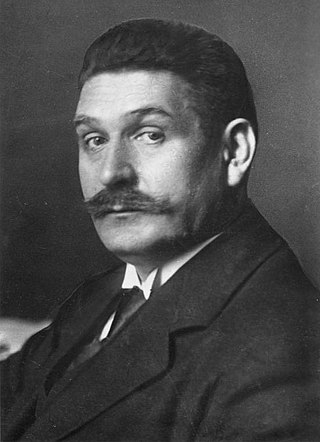
Gustav Adolf Bauer was a German Social Democratic Party leader and the chancellor of Germany from June 1919 to March 1920. He served as head of government for nine months. Prior to becoming head of government, Bauer had been Minister of Labour in the first democratically elected German cabinet. After his cabinet was brought down by the Kapp Putsch in March 1920, Bauer served as vice-chancellor, Minister of the Treasury, and Minister of Transportation in other cabinets of the Weimar Republic from May 1920 to November 1922. In 1924 and 1925 he was involved in the Barmat scandal.

The chancellor of Germany, officially the federal chancellor of the Federal Republic of Germany, is the head of the federal government of Germany and the commander in chief of the German Armed Forces during wartime. The chancellor is the chief executive of the Federal Cabinet and heads the executive branch. The chancellor is elected by the Bundestag on the proposal of the federal president and without debate.
Victor Horta, Belgian architect, designed Hôtel van Eetvelde (d. 1947) births

Victor Pierre Horta was a Belgian architect and designer, and one of the founders of the Art Nouveau movement. His Hôtel Tassel in Brussels, built in 1892–93, is often considered the first Art Nouveau house. The curving stylized vegetal forms that Horta used influenced many others, including architect Hector Guimard, who used it in the first house he designed in Paris and in the entrances he designed for the Paris Metro. He is also considered a precursor of modern architecture for his open floor plans and his innovative use of iron, steel and glass.

The Hôtel van Eetvelde is a town house designed in 1895 by Victor Horta for Edmond van Eetvelde, administrator of Congo Free State. It is located at 4, avenue Palmerston/Palmerstonlaan in Brussels, Belgium.
George Lloyd, English-Canadian bishop and theologian (d. 1940) births
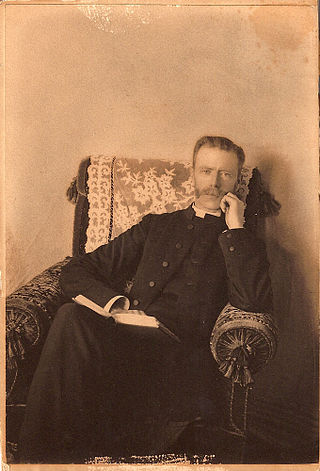
George Exton Lloyd was an Anglican bishop and theologian who helped found Lloydminster, a city on the border of the provinces of Alberta and Saskatchewan in Canada. He served as Bishop of Saskatchewan from 1922 to 1931.
Samuel Alexander, Australian-English philosopher and academic (d. 1938) births

Samuel Alexander was an Australian-born British philosopher. He was the first Jewish fellow of an Oxbridge college.
Hugh Mahon, Irish-Australian publisher and politician, 10th Australian Minister for Foreign Affairs (d. 1931) births

Hugh Mahon was an Australian politician. He was a member of the Australian Labor Party (ALP) and held ministerial office in the party's earliest governments. He served terms as Postmaster-General (1904), Minister for Home Affairs (1908–1909), and Minister for External Affairs (1914–1916). However, Mahon is chiefly known as the only person to be expelled from the Parliament of Australia, for making "seditious and disloyal utterances" about the British Empire. He failed to win his seat back at the by-election.

The Minister for Foreign Affairs is the minister in the Government of Australia who is responsible for overseeing the international diplomacy section of the Department of Foreign Affairs and Trade. Senator Penny Wong was appointed as Foreign Minister in the ministry led by Prime Minister Anthony Albanese in May 2022 following the 2022 Australian federal election. As the first female foreign minister from the Australian Labor Party, Wong also became the third female foreign minister in a row, following Julie Bishop and Marise Payne. The Foreign Minister is one of two cabinet-level portfolio ministers under the Department of Foreign Affairs and Trade, the other being the Minister for Trade and Tourism Senator Don Farrell.
William Russell, American lawyer and politician, 37th Governor of Massachusetts (d. 1896) births

William Eustis Russell was a lawyer and Democratic Party politician from Massachusetts. He served four terms as mayor of Cambridge, and was the 37th governor of Massachusetts, serving from 1891 to 1894. He was the state's youngest-ever chief executive, and was the first Democrat since the American Civil War to serve more than one term in that office.

The governor of the Commonwealth of Massachusetts is the chief executive officer of the government of Massachusetts. The governor is the head of the state cabinet and the commander-in-chief of the commonwealth's military forces.
Giuseppe Martucci, Italian pianist, composer, and conductor (d. 1909) births
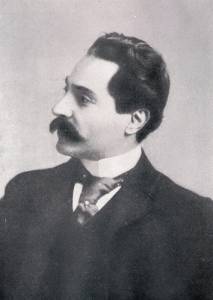
Giuseppe Martucci was an Italian composer, conductor, pianist and teacher. Sometimes called "the Italian Brahms", Martucci was notable among Italian composers of the era in that he dedicated his entire career to absolute music, and wrote no operas. As a composer and teacher he was influential in reviving Italian interest in non-operatic music. Nevertheless, as a conductor, he did help to introduce Wagner's operas to Italy and also gave important early concerts of English music there.
Giacomo Beltrami, Italian jurist, explorer, and author (b. 1779) deaths

Giacomo Costantino Beltrami was an Italian jurist, author, and explorer, known for claiming to have discovered the headwaters of the Mississippi River in 1823 while on a trip through much of the United States. In Minnesota, Beltrami and Beltrami County are named for him. He had an extensive network of notable figures for friends and acquaintances, including members of the powerful Medici family.
Louis Braille, French educator, invented Braille (b. 1809) deaths

Louis Braille was a French educator and the inventor of a reading and writing system, named braille after him, intended for use by visually impaired people. His system is used worldwide and remains virtually unchanged to this day.

Braille is a tactile writing system used by people who are visually impaired, including people who are blind, deafblind or who have low vision. It can be read either on embossed paper or by using refreshable braille displays that connect to computers and smartphone devices. Braille can be written using a slate and stylus, a braille writer, an electronic braille notetaker or with the use of a computer connected to a braille embosser.
Clarence King, American geologist, mountaineer, and critic (d. 1901) births

Clarence Rivers King was an American geologist, mountaineer and author. He was the first director of the United States Geological Survey from 1879 to 1881. Nominated by Republican President Rutherford B. Hayes, King was noted for his exploration of the Sierra Nevada mountain range.
Frances Burney, English author and playwright (b. 1752) deaths

Frances Burney, also known as Fanny Burney and later Madame d'Arblay, was an English satirical novelist, diarist and playwright. In 1786–1790 she held the post as "Keeper of the Robes" to Charlotte of Mecklenburg-Strelitz, George III's queen. In 1793, aged 41, she married a French exile, General Alexandre d'Arblay. After a long writing career and wartime travels that stranded her in France for over a decade, she settled in Bath, England, where she died on 6 January 1840. The first of her four novels, Evelina (1778), was the most successful and remains her most highly regarded. Most of her plays were not performed in her lifetime. She wrote a memoir of her father (1832) and many letters and journals that have been gradually published since 1889.
Max Bruch, German composer and conductor (d. 1920) births
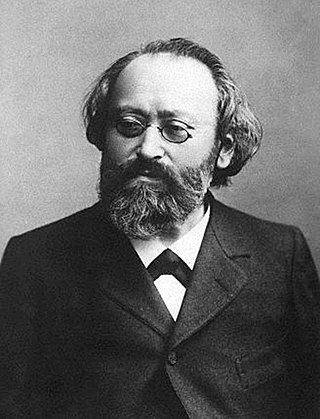
Max Bruch was a German Romantic composer, violinist, teacher, and conductor who wrote more than 200 works, including three violin concertos, the first of which has become a prominent staple of the standard violin repertoire.
Gustave Doré, French painter and sculptor (d. 1883) births

Paul Gustave Louis Christophe Doré was a French artist, as a printmaker, illustrator, painter, comics artist, caricaturist, and sculptor. He is best known for his prolific output of wood-engravings, especially those illustrating classic books, including 241 illustrating the Bible. These achieved great international success, and he is the best-known artist in this printmaking technique, although his role was normally as the designer only; at the height of his career some 40 block-cutters were employed to cut his drawings onto the wooden printing blocks, usually also signing the image.
Rodolphe Kreutzer, French violinist, composer, and conductor (b. 1766) deaths
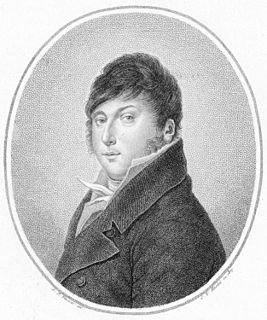
Rodolphe Kreutzer was a French violinist, teacher, conductor, and composer of forty French operas, including La mort d'Abel (1810).
Josef Dobrovský, Czech philologist and historian (b. 1753) deaths
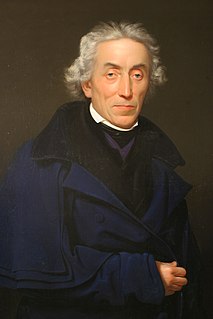
Josef Dobrovský was a Czech philologist and historian, one of the most important figures of the Czech National Revival along with Josef Jungmann.
Heinrich Schliemann, German archaeologist and businessman (d. 1890) births
Johann Ludwig Heinrich Julius Schliemann was a German businessman and pioneer in the field of archaeology. He was an advocate of the historicity of places mentioned in the works of Homer and an archaeological excavator of Hisarlik, now presumed to be the site of Troy, along with the Mycenaean sites Mycenae and Tiryns. His work lent weight to the idea that Homer's Iliad reflects historical events. Schliemann's excavation of nine levels of archaeological remains has been criticized as destructive of significant historical artifacts, including the level that is believed to be the historical Troy.
Louis Baraguey d'Hilliers, French general (b. 1764) deaths

Louis Baraguey d'Hilliers was a French Army general who fought in the French Revolutionary Wars and the Napoleonic Wars. He was the father of Achille Baraguey d'Hilliers, a Marshal of France, and the father-in-law of General Damrémont, governor-general of Algeria.
Charles Sumner, American lawyer and politician (d. 1874) births
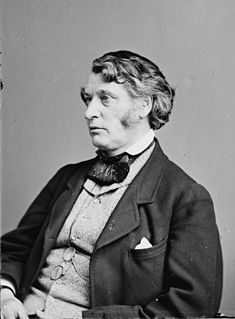
Charles Sumner was an American statesman and United States Senator from Massachusetts. As an academic lawyer and a powerful orator, Sumner was the leader of the anti-slavery forces in the state and a leader of the Radical Republicans in the U.S. Senate during the American Civil War. During Reconstruction, he fought to minimize the power of the ex-Confederates and guarantee equal rights to the freedmen. He fell into a dispute with President Ulysses Grant, a fellow Republican, over the control of Santo Domingo, leading to the stripping of his power in the Senate and his subsequent effort to defeat Grant's re-election.
Joseph Pitty Couthouy, American conchologist and paleontologist (d. 1864) births

Joseph Pitty Couthouy was an American naval officer, conchologist, and invertebrate palaeontologist. Born in Boston, Massachusetts, he entered the Boston Latin School in 1820. He married Mary Greenwood Wild on 9 March 1832.
Joseph Petzval, German-Hungarian mathematician and physicist (d. 1891) births

Joseph Petzval was a mathematician, inventor, and physicist best known for his work in optics. He was born in the town of Szepesbéla in the Kingdom of Hungary.
Henri Herz, Austrian pianist and composer (d. 1888) births

Henri Herz was a virtuoso pianist, composer and piano manufacturer, Austrian by birth and French by nationality and domicile. He was a professor in the Paris Conservatoire for more than thirty years. Among his major works are eight piano concertos, a piano sonata, rondos, nocturnes, waltzes, marches, fantasias, and numerous sets of variations.
Jedediah Smith, American hunter, explorer, and author (d. 1831) births

Jedediah Strong Smith, was an American clerk, transcontinental pioneer, frontiersman, hunter, trapper, author, cartographer, mountain man and explorer of the Rocky Mountains, the Western United States, and the Southwest during the early 19th century. After 75 years of obscurity following his death, Smith was rediscovered as the American whose explorations led to the use of the 20-mile (32 km)-wide South Pass as the dominant point of crossing the Continental Divide for pioneers on the Oregon Trail.
Anselme Payen, French chemist and academic (d. 1871) births

Anselme Payen was a French chemist known for discovering the enzyme diastase, and the carbohydrate cellulose.
James Madison Porter, American lawyer and politician, 18th United States Secretary of War (d. 1862) births
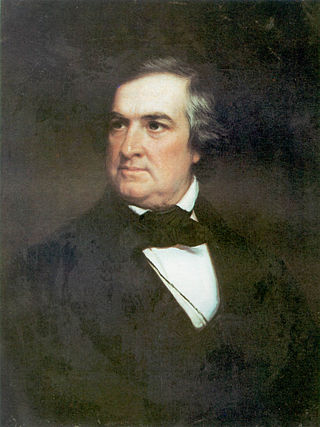
James Madison Porter served as the 18th United States Secretary of War and a founder of Lafayette College.

The secretary of war was a member of the U.S. president's Cabinet, beginning with George Washington's administration. A similar position, called either "Secretary at War" or "Secretary of War", had been appointed to serve the Congress of the Confederation under the Articles of Confederation between 1781 and 1789. Benjamin Lincoln and later Henry Knox held the position. When Washington was inaugurated as the first President under the Constitution, he appointed Knox to continue serving as Secretary of War.
Andreas Moustoxydis, Greek historian and philologist (d. 1860) births

Andreas Moustoxydis, sometimes Latinized as Mustoxydes or in the Italian form Andrea Mustoxidi, was a Greek historian and philologist from Corfu.
José Gaspar Rodríguez de Francia, Paraguayan lawyer and politician, first dictator of Paraguay (d. 1840) births

José Gaspar Rodríguez de Francia y Velasco was a Paraguayan lawyer and politician, and the first dictator (1814–1840) of Paraguay following its 1811 independence from the Spanish Viceroyalty of the Río de la Plata. His official title was "Supreme and Perpetual Dictator of Paraguay", but he was popularly known as El Supremo.
Jacques-Etienne Montgolfier, French co-inventor of the hot air balloon (d. 1799) births
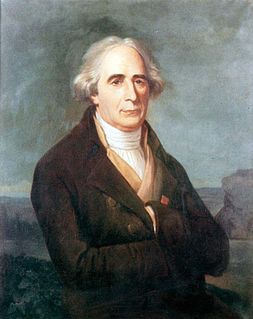
The Montgolfier brothers – Joseph-Michel Montgolfier and Jacques-Étienne Montgolfier – were aviation pioneers, balloonists and paper manufacturers from the commune Annonay in Ardèche, France. They are best known historically as inventors of the Montgolfière-style hot air balloon, globe aérostatique, which launched the first confirmed piloted ascent by man in 1783, carrying Jacques-Étienne. Joseph-Michel also invented the self-acting hydraulic ram (1796) and Jacques-Étienne founded the first paper-making vocational school. Together, the brothers invented a process to manufacture transparent paper.
John Dennis, English playwright and critic (b. 1657) deaths

John Dennis was an English critic and dramatist.
Étienne François Geoffroy, French physician and chemist (b. 1672) deaths

Étienne François Geoffroy was a French physician and chemist, best known for his 1718 affinity tables. He first contemplated a career as an apothecary, but then decided to practice medicine. He is sometimes known as Geoffroy the Elder.
Chikamatsu Monzaemon, Japanese actor and playwright (b. 1653) deaths

Chikamatsu Monzaemon was a Japanese dramatist of jōruri, the form of puppet theater that later came to be known as bunraku, and the live-actor drama, kabuki. The Encyclopædia Britannica has written that he is "widely regarded as the greatest Japanese dramatist". His most famous plays deal with double-suicides of honor bound lovers. Of his puppet plays, around 70 are jidaimono (時代物) and 24 are sewamono (世話物). The domestic plays are today considered the core of his artistic achievement, particularly works such as The Courier for Hell (1711) and The Love Suicides at Amijima (1721). His histories are viewed less positively, though The Battles of Coxinga (1715) remains praised.
Giovanni Vincenzo Gravina, Italian lawyer and jurist (b. 1664) deaths
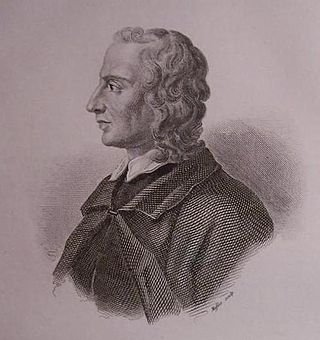
Giovanni Vincenzo Gravina was an Italian man of letters and jurist. He was born at Roggiano Gravina, a small town near Cosenza, in Calabria.
Percivall Pott, English surgeon (d. 1788) births

Percivall Pott was an English surgeon, one of the founders of orthopaedics, and the first scientist to demonstrate that a cancer may be caused by an environmental carcinogen.
Philips van Almonde, Dutch admiral (b. 1646) deaths

Philips van Almonde was a Dutch Lieutenant Admiral, who served in his nation’s maritime conflicts of the 17th and early 18th centuries.
José de Nebra, Spanish composer (d. 1768) births
José Melchor Baltasar Gaspar Nebra Blasco was a Spanish composer. His work combines Spanish traditions with the Italian style of his day.
Giuseppe Sammartini, Italian oboe player and composer (d. 1750) births
Giuseppe Francesco Gaspare Melchiorre Baldassare Sammartini was an Italian composer and oboist during the late Baroque and early Classical era. Although he was from Milan, most of his professional life was spent in London and with Frederick, the Prince of Wales. He also had a younger brother, Giovanni Battista Sammartini, who likewise became a renowned composer.

The oboe is a type of double reed woodwind instrument. Oboes are usually made of wood, but may also be made of synthetic materials, such as plastic, resin, or hybrid composites. The most common oboe plays in the treble or soprano range.
Mehmed IV, Ottoman sultan (b. 1642) deaths

Mehmed IV also known as Mehmed the Hunter was the Sultan of the Ottoman Empire from 1648 to 1687. He came to the throne at the age of six after his father was overthrown in a coup. Mehmed went on to become the second longest reigning sultan in Ottoman history after Suleiman the Magnificent. While the initial and final years of his reign were characterized by military defeat and political instability, during his middle years he oversaw the revival of the empire's fortunes associated with the Köprülü era. Mehmed IV was known by contemporaries as a particularly pious ruler, and was referred to as gazi, or "holy warrior" for his role in the many conquests carried out during his long reign.
Seth Ward, English bishop, mathematician, and astronomer (b. 1617) deaths

Seth Ward was an English mathematician, astronomer, and bishop.
James Brydges, 1st Duke of Chandos, English academic and politician, Lord Lieutenant of Radnorshire (d. 1744) births

James Brydges, 1st Duke of Chandos, was an English landowner and politician who sat in the English and British House of Commons from 1698 until 1714, when he succeeded to the peerage as Baron Chandos, and vacated his seat in the House of Commons to sit in the House of Lords. He was subsequently created Earl of Carnarvon, and then Duke of Chandos in 1719.
This is a list of people who have served as Lord-Lieutenant of Radnorshire. After 1715, all Lord Lieutenants were also Custos Rotulorum of Radnorshire. The office was abolished on 31 March 1974, being replaced by the Lord Lieutenant of Powys, with Deputy Lieutenants for Radnorshire.
Eleonor Magdalene of Neuburg (d. 1720) births
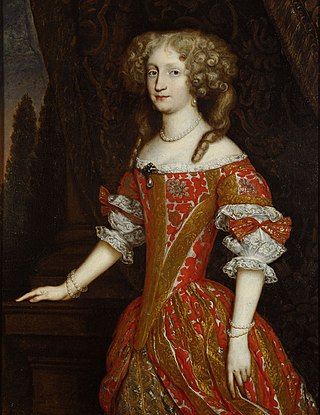
Eleonore Magdalene of Neuburg was a princess of the House of Wittelsbach who became Holy Roman Empress, German Queen, Archduchess of Austria, Queen of Hungary and Bohemia as the third and final wife of Leopold I. Before her marriage and during her widowhood, she led an ascetic and monastic life, translating the Bible from Latin to German and defended the Order of the Discalced Carmelites. Reputed to be one of the most educated and virtuous women of her time, Eleanore took part in the political affairs during the reign of her husband and sons, especially regarding court revenue and foreign relationships. She served as regent for a few months in 1711, period in which she signed the Treaty of Szatmár, which recognized the rights of her descendants to the Hungarian throne.
Elias Holl, German architect, designed the Augsburg Town Hall (b. 1573) deaths

Elias Holl was the most important architect of late German Renaissance architecture.

The Town Hall of Augsburg is the administrative centre of Augsburg, Bavaria, Germany, and one of the most significant secular buildings of the Renaissance style north of the Alps. It was designed and built by Elias Holl, Stadtbaumeister, in 1615–1624. Due to its historic and cultural importance, it is protected by the Hague Convention for the Protection of Cultural Property in the Event of Armed Conflict.
Anne Hamilton, 3rd Duchess of Hamilton, Scottish peeress (d. 1716) births

Anne Hamilton, 3rd Duchess of Hamilton was a Scottish peeress.
Christoffer Gabel, Danish politician (d. 1673) births

Christoffer Gabel was a Danish statesman.
Philip Henslowe, English impresario (b. 1550) deaths
Philip Henslowe was an Elizabethan theatrical entrepreneur and impresario. Henslowe's modern reputation rests on the survival of his diary, a primary source for information about the theatrical world of Renaissance London.
Claude Favre de Vaugelas, French educator and courtier (d. 1650) births
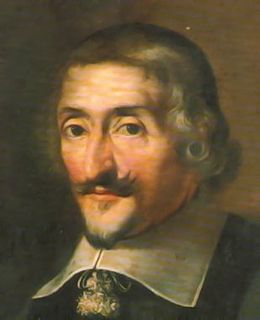
Claude Favre de Vaugelas was a Savoyard grammarian and man of letters. Although a lifelong courtier, Claude Favre was widely known by the name of one of the landed estates he owned as seigneur of Vaugelas and baron of Peroges.
Gaspar de Guzmán, Count-Duke of Olivares (d. 1645) births

Gaspar de Guzmán y Pimentel, 1st Duke of Sanlúcar, 3rd Count of Olivares, GE, known as the Count-Duke of Olivares, was a Spanish royal favourite of Philip IV and minister. Appointed as Grandee on 10 April 1621, a day after the ending of the Twelve Years' Truce to January 1643, he over-exerted Spain in foreign affairs and unsuccessfully attempted domestic reform. His policy of committing Spain to recapture Holland led to a renewal of the Eighty Years' War while Spain was also embroiled in the Thirty Years' War (1618–1648). In addition, his attempts to centralise power and increase wartime taxation led to revolts in Catalonia and in Portugal, which brought about his downfall.
Thomas Fincke, Danish mathematician and physicist (d. 1656) births

Thomas Fincke was a Danish mathematician and physicist, and a professor at the University of Copenhagen for more than 60 years.
Jane Dormer, Duchess of Feria (d. 1612) births

Jane Dormer, Duchess of Feria was an English lady-in-waiting to Mary I who, after the Queen's death, married Gómez Suárez de Figueroa y Córdoba, 1st Duke of Feria and went to live in Spain, where she would become a magnet for exiled English Catholics. She maintained a correspondence with Queen Elizabeth, and also corresponded with contacts sympathetic to the Roman Catholic cause in England. Within Spain she championed the cause of exiled English fallen on hard times. On her husband's death in 1571 she took over the management of his estates. She died in Spain on 13 January 1612 and was buried at the monastery of Santa Clara in Zafra.

Duke of Feria is a hereditary title in the Peerage of Spain accompanied by the dignity of Grandee, granted in 1567 by Philip II to Gómez Suárez de Figueroa, 5th Count of Feria.
Alessandro de' Medici, Duke of Florence (b. 1510) deaths
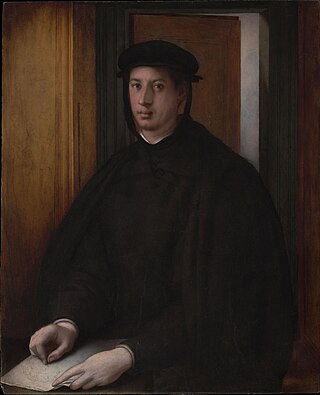
Alessandro de' Medici, nicknamed "il Moro" due to his dark complexion, Duke of Penne and the first Duke of the Florentine Republic, was ruler of Florence from 1530 to his death in 1537. The first Medici to rule Florence as a hereditary monarch, Alessandro was also the last Medici from the senior line of the family to lead the city. His assassination at the hands of distant cousin Lorenzaccio caused the title of Duke to pass to Cosimo I de Medici, from the family's junior branch.
Baldassare Peruzzi, Italian architect and painter, designed the Palazzo Massimo alle Colonne (b. 1481) deaths

Baldassare Tommaso Peruzzi was an Italian architect and painter, born in a small town near Siena and died in Rome. He worked for many years with Bramante, Raphael, and later Sangallo during the erection of the new St. Peter's. He returned to his native Siena after the Sack of Rome (1527) where he was employed as architect to the Republic. For the Sienese he built new fortifications for the city and designed a remarkable dam on the Bruna River near Giuncarico. He seems to have moved back to Rome permanently by 1535. He died there the following year and was buried in the Rotunda of the Pantheon, near Raphael.

The Palazzo Massimo alle Colonne is a Renaissance palace in Rome, Italy.
Caspar Peucer, German physician and scholar (d. 1602) births
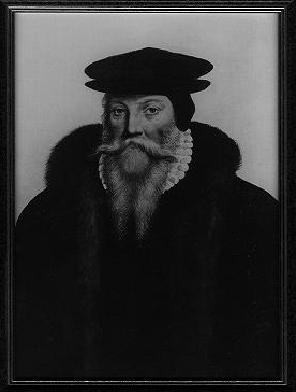
Caspar Peucer was a German reformer, physician, and scholar of Sorbian origin.
John of Ávila, Spanish mystic and saint (d. 1569) births

John of Ávila was a Spanish priest, preacher, scholastic author, and religious mystic, who has been declared a saint and Doctor of the Church by the Catholic Church. He is called the "Apostle of Andalusia", for his extensive ministry in that region.
Olaus Petri, Swedish clergyman (d. 1552) births

Olof Persson, sometimes Petersson, better known under the Latin form of his name, Olaus Petri, was a clergyman, writer, judge, and major contributor to the Protestant Reformation in Sweden. His brother, Laurentius Petri, became the first Evangelical Lutheran Archbishop of Sweden.
Helius Eobanus Hessus, German poet (d. 1540) births
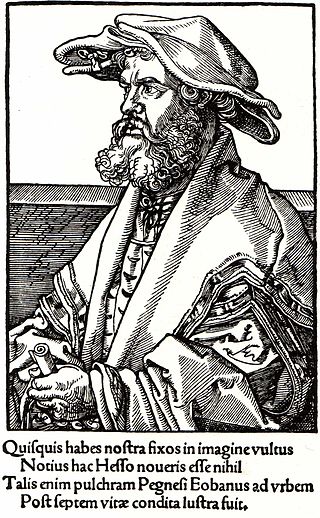
Helius Eobanus Hessus was a German Latin poet and later a Lutheran humanist. He was born at Halgehausen in Hesse-Kassel.
Martin Agricola, German composer and theorist (d. 1556) births
Martin Agricola was a German composer of Renaissance music and a music theorist.
Ahmed Khan bin Küchük, Mongolian ruler deaths

Ahmed Khan bin Küchük was a Khan of the Great Horde between 1465 and 1481.
Uzun Hasan, 9th Shahanshah of the Turkoman Aq Qoyunlu dynasty deaths
Uzun Hasan or Uzun Hassan was a ruler of the Turkoman Aq Qoyunlu state and is generally considered to be its strongest ruler. Hasan ruled between 1452 and 1478, and would preside over the confederation's territorial apex, when it included parts or all of present-day Iraq, Turkey, Azerbaijan, Iran, Transcaucasia and Syria.

The Aq Qoyunlu was a culturally Persianate, Sunni Turkoman tribal confederation founded in the Diyarbakir region by Qara Yuluk Uthman Beg that ruled parts of present-day eastern Turkey from 1378 to 1503, and in their last decades also ruled Armenia, Azerbaijan, much of Iran, Iraq, and Oman where the ruler of Hormuz recognised Aq Qoyunlu suzerainty. The Aq Qoyunlu empire reached its zenith under Uzun Hasan.
Jean VIII, Count of Vendôme deaths

John VIII de Bourbon was Count of Vendôme from 1466 until his death. A member of the House of Bourbon, he was the son and successor of Louis, Count of Vendôme. As a courtier of King Charles VII of France, he fought the English in Normandy and Guyenne. He attached himself to King Louis XI, but was not in royal favor. He withdrew to the Château of Lavardin and completed its construction.
Christopher of Bavaria, King of Denmark, Norway and Sweden (b. 1418) deaths

Christopher of Bavaria was King of Denmark, Sweden (1441–48) and Norway (1442–48) during the era of the Kalmar Union.

The monarchy of Denmark is a constitutional institution and a historic office of the Kingdom of Denmark. The Kingdom includes Denmark proper and the autonomous territories of the Faroe Islands and Greenland. The Kingdom of Denmark was already consolidated in the 8th century, whose rulers are consistently referred to in Frankish sources as "kings". Under the rule of King Gudfred in 804 the Kingdom may have included all the major provinces of medieval Denmark.
Joan of Arc, French martyr and saint (d. 1431) births
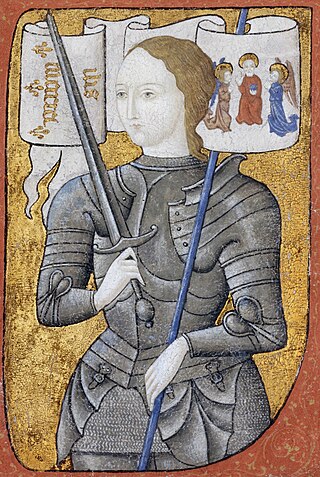
Joan of Arc is a patron saint of France, honored as a defender of the French nation for her role in the siege of Orléans and her insistence on the coronation of Charles VII of France during the Hundred Years' War. Stating that she was acting under divine guidance, she became a military leader who transcended gender roles and gained recognition as a savior of France.
Roger Walden, English bishop deaths
Roger Walden was an English treasurer and Bishop of London.
Edmund Holland, 4th Earl of Kent (d. 1408) births
Edmund Holland, 4th Earl of Kent, 5th Baron Holand, KG was the Earl of Kent from 1400 to 1408. He was the 106th Knight of the Order of the Garter in 1403.
Richard II of England (d. 1400) births

Richard II, also known as Richard of Bordeaux, was King of England from 1377 until he was deposed in 1399. He was the son of Edward the Black Prince, Prince of Wales, and Joan, Countess of Kent. Richard's father died in 1376, leaving Richard as heir apparent to his grandfather, King Edward III; upon the latter's death, the 10-year-old Richard succeeded to the throne.
Gertrude van der Oosten, Beguine mystic deaths

Gertrude van der Oosten was a Dutch Beguine who was considered a mystic and had received the Stigmata.
Giovanni I di Murta, second doge of the Republic of Genoa deaths
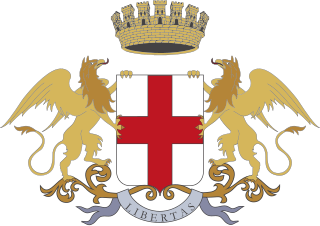
Giovanni di Murta was elected the second Doge of the Republic of Genoa after the resignation of Simone Boccanegra, on 25 December 1345. His dogate was dominated by his attempts to break the circle of political violence which had crippled the city over the past century and to reassert the Genoese domination over the Mediterranean colonies.
Raymond of Penyafort, Catalan archbishop and saint (b. 1175) deaths

Raymond of Penyafort was a Catalan Dominican friar in the 13th century, who compiled the Decretals of Gregory IX, a collection of canonical laws that remained a major part of Church law until the 1917 Code of Canon Law abrogated it. He is honored as a saint in the Catholic Church and is the patron saint of canon lawyers.
Gertrude the Great, German mystic (d. 1302) births

Gertrude the Great, OSB was a German Benedictine nun and mystic. She is recognized as a saint by the Catholic Church and by the Episcopal Church. In addition to being commemorated in the Episcopal Calendar of Saints on November 21, Gertrude is inscribed in the General Roman Calendar for optional celebration throughout the Roman Rite, as a memorial on November 16.

The Friends of God was a medieval mystical group of both ecclesiastical and lay persons within the Catholic Church and a center of German mysticism. It was founded between 1339 and 1343 during the Avignon Papacy of the Western Schism, a time of great turmoil for the Catholic Church. The Friends of God were originally centered in Basel, Switzerland and were also fairly important in Strasbourg and Cologne. Some late-nineteenth century writers made large claims for the movement, seeing it both as influential in fourteenth-century mysticism and as a precursor of the Protestant Reformation. Modern studies of the movement have emphasised the derivative and often second-rate character of its mystical literature, and its limited impact on medieval literature in Germany. Some of the movement's ideas still prefigured the Protestant reformation.
Matilda of Chester, Countess of Huntingdon, Anglo-Norman noblewoman (b. 1171) deaths
Matilda of Chester, Countess of Huntingdon was an Anglo-Norman noblewoman, sometimes known as Maud and sometimes known with the surname de Kevelioc. She was a daughter of Hugh de Kevelioc, 5th Earl of Chester, and the wife of David of Scotland, Earl of Huntingdon.
Gilbert de Clare, 1st Earl of Pembroke (b. 1100) deaths

Gilbert fitz Gilbert de Clare, was created Earl of Pembroke in 1138.
Berengar of Tours, French scholar and theologian (b. 999) deaths
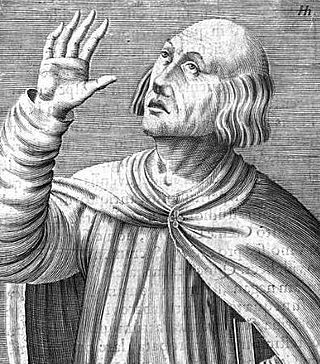
Berengar of Tours, in Latin Berengarius Turonensis, was an 11th-century French Christian theologian and archdeacon of Angers, a scholar whose leadership of the cathedral school at Chartres set an example of intellectual inquiry through the revived tools of dialectic that was soon followed at cathedral schools of Laon and Paris. He came into conflict with Church authorities over the doctrine of transubstantiation of the Eucharist, instead arguing for a more spiritual presence.
Abo of Tiflis, Iraqi martyr and saint (b. 756) deaths

Abo of Tiflis was an early Christian martyr of Arab origin, who went on to practice his faith in what is now Tbilisi, the capital of present-day Georgia.
Armed Forces Day (Iraq)
This is a list of public holidays in Iraq.
Christian Feast day: André Bessette (Roman Catholic Church)

André Bessette, C.S.C., more commonly known as Brother André, and since his canonization as Saint André of Montreal, was a lay brother of the Congregation of Holy Cross and a significant figure of the Catholic Church among French-Canadians, credited with thousands of reported miraculous oil healings associated with his pious devotion to Saint Joseph.

The Catholic Church, also known as the Roman Catholic Church, is the largest Christian church, with 1.3 billion baptized Catholics worldwide as of 2019. As the world's oldest and largest continuously functioning international institution, it has played a prominent role in the history and development of Western civilization. The church consists of 24 sui iuris churches, including the Latin Church and 23 Eastern Catholic Churches, which comprise almost 3,500 dioceses and eparchies located around the world. The pope, who is the bishop of Rome, is the chief pastor of the church. The bishopric of Rome, known as the Holy See, is the central governing authority of the church. The administrative body of the Holy See, the Roman Curia, has its principal offices in Vatican City, a small enclave of the Italian city of Rome, of which the pope is head of state.
Christian Feast day: January 6 (Eastern Orthodox liturgics)

January 5 - Eastern Orthodox liturgical calendar - January 7
Christmas: Christmas (Armenian Apostolic Church)
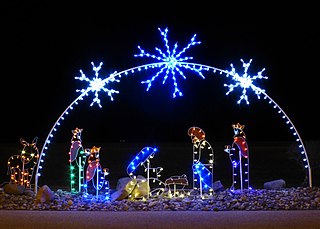
Christmas is an annual festival commemorating the birth of Jesus Christ, observed primarily on December 25 as a religious and cultural celebration among billions of people around the world. A feast central to the Christian liturgical year, it is preceded by the season of Advent or the Nativity Fast and initiates the season of Christmastide, which historically in the West lasts twelve days and culminates on Twelfth Night. Christmas Day is a public holiday in many countries, is celebrated religiously by a majority of Christians, as well as culturally by many non-Christians, and forms an integral part of the holiday season organized around it.

The Armenian Apostolic Church is the national church of the Armenian people. Part of Oriental Orthodoxy, it is one of the most ancient Christian institutions. The Kingdom of Armenia was the first state to adopt Christianity as its official religion under the rule of King Tiridates III of the Arsacid dynasty in the early 4th century. According to tradition, the church originated in the missions of Apostles Bartholomew and Thaddeus of Edessa in the 1st century. St. Gregory the Illuminator was the first official primate of the church.
Christmas: Christmas Eve (Russia)
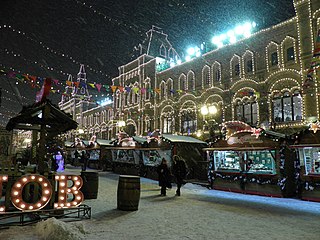
Christmas in Russia, commemorating the birth of Jesus Christ, is celebrated on 25 December in the Julian calendar used by the church, which falls on 7 January in the common Gregorian calendar. Christmas is considered a high holiday by the Russian Orthodox Church, one of the 12 Great Feasts, and one of only four of which are preceded by a period of fasting.

Russia, or the Russian Federation, is a transcontinental country spanning Eastern Europe and Northern Asia. It is the largest country in the world, covering over 17,098,246 square kilometres (6,601,670 sq mi), and encompassing one-eighth of Earth's inhabitable landmass. Russia extends across eleven time zones and shares land boundaries with fourteen countries, more than any other country but China. It is the world's ninth-most populous country and Europe's most populous country, with a population of 146 million people. The country's capital and largest city is Moscow, the largest city entirely within Europe. Saint Petersburg is Russia's cultural centre and second-largest city. Other major urban areas include Novosibirsk, Yekaterinburg, Nizhny Novgorod, and Kazan.
Christmas: Christmas Eve (Ukraine)

Traditional Ukrainian Christmas festivities start on Christmas Eve, which is celebrated on 6 January, as reckoned by the Julian calendar. The Christmas celebrations end on 19 January, the date of the celebration of the Baptism of Jesus, known in Ukraine as Vodokhreschhe or Yordan.

Ukraine is a country in Eastern Europe. It is the second-largest European country after Russia, which it borders to the east and northeast. Ukraine covers approximately 600,000 square kilometres (230,000 sq mi). Prior to the ongoing Russo-Ukrainian War, it was the eighth-most populous country in Europe, with a population of around 41 million people. It is also bordered by Belarus to the north; by Poland, Slovakia, and Hungary to the west; and by Romania and Moldova to the southwest; with a coastline along the Black Sea and the Sea of Azov to the south and southeast. Kyiv is the nation's capital and largest city. Ukraine's official and national language is Ukrainian; most people are also fluent in Russian.
Christmas: Christmas Eve (Bosnia and Herzegovina)
The holidays of Bosnia and Herzegovina include, in various jurisdictions:

Bosnia and Herzegovina, abbreviated BiH or B&H, sometimes called Bosnia–Herzegovina and often known informally as Bosnia, is a country at the crossroads of south and southeast Europe, located in the Balkans. Bosnia and Herzegovina borders Serbia to the east, Montenegro to the southeast, and Croatia to the north and southwest. In the south it has a narrow coast on the Adriatic Sea within the Mediterranean, which is about 20 kilometres long and surrounds the town of Neum. Bosnia, which is the inland region of the country, has a moderate continental climate with hot summers and cold, snowy winters. In the central and eastern regions of the country, the geography is mountainous, in the northwest it is moderately hilly, and in the northeast it is predominantly flat. Herzegovina, which is the smaller, southern region of the country, has a Mediterranean climate and is mostly mountainous. Sarajevo is the capital and the largest city of the country followed by Banja Luka, Tuzla and Zenica.
Christmas: Christmas Eve (North Macedonia)

Public holidays are observed in the Republic of North Macedonia for a number of reasons, including for religious and national significance. They are generally accompanied by celebrations.

North Macedonia, officially the Republic of North Macedonia, is a country in Southeast Europe. It gained independence in 1991 as one of the successor states of Yugoslavia. It is a landlocked country bordering Kosovo to the northwest, Serbia to the north, Bulgaria to the east, Greece to the south, and Albania to the west. It constitutes approximately the northern third of the larger geographical region of Macedonia. Skopje, the capital and largest city, is home to a quarter of the country's 1.83 million people. The majority of the residents are ethnic Macedonians, a South Slavic people. Albanians form a significant minority at around 25%, followed by Turks, Romani, Serbs, Bosniaks, Aromanians and a few other minorities.
Epiphany or Three Kings' Day (Western Christianity) or Theophany (Eastern Christianity), and its related observances: Befana Day (Italy)
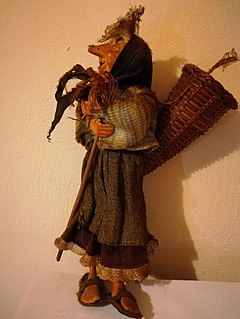
In Italian folklore, the Befana is an old woman who delivers gifts to children throughout Italy on Epiphany Eve in a similar way to Santa Claus or the Three Magi Kings.

Italy, officially the Italian Republic, is a country located in the middle of the Mediterranean Sea, in Southern Europe; its territory largely coincides with the homonymous geographical region. Italy is also considered part of Western Europe. A unitary parliamentary republic with Rome as its capital and largest city, the country covers a total area of 301,230 km2 (116,310 sq mi) and shares land borders with France, Switzerland, Austria, Slovenia and the enclaved microstates of Vatican City and San Marino. Italy has a territorial exclave in Switzerland, Campione. With over 60 million inhabitants, Italy is the third-most populous member state of the European Union.
Epiphany or Three Kings' Day (Western Christianity) or Theophany (Eastern Christianity), and its related observances: Little Christmas (Ireland)
Little Christmas, also known as Old Christmas, Green Christmas, or Twelfth Night, is one of the traditional names among Irish Christians and Amish Christians for 6 January, which is also known more widely as the Feast of the Epiphany, celebrated after the conclusion of the twelve days of Christmastide. It is the traditional end of the Christmas season and until 2013 was the last day of the Christmas holidays for both primary and secondary schools in Ireland.
The Irish calendar is the Gregorian calendar as it is in use in Ireland, but also incorporating Irish cultural festivals and views of the division of the seasons, presumably inherited from earlier Celtic calendar traditions.
Epiphany or Three Kings' Day (Western Christianity) or Theophany (Eastern Christianity), and its related observances: Þrettándinn (Iceland)

Christmas in Iceland (Jól) starts four Weeks before proper Christmas, which begins on December 24 (Aðfangadagur) and ends thirteen days later on January 6 (Epiphany).

Iceland is a Nordic island country in the North Atlantic Ocean and in the Arctic Ocean. Iceland is the most sparsely populated country in Europe. Iceland's capital and largest city is Reykjavík, which is home to over 65% of the population. Iceland is the biggest part of the Mid-Atlantic Ridge that rises above sea level, and its central volcanic plateau is erupting almost constantly. The interior consists of a plateau characterised by sand and lava fields, mountains, and glaciers, and many glacial rivers flow to the sea through the lowlands. Iceland is warmed by the Gulf Stream and has a temperate climate, despite a high latitude just outside the Arctic Circle. Its high latitude and marine influence keep summers chilly, and most of its islands have a polar climate.
Pathet Lao Day (Laos)
Public holidays in Laos are days when workers get the day off work. The Lao word for "holiday" or "festival" is boun.

Laos, officially the Lao People's Democratic Republic, is a socialist state and the only landlocked country in Southeast Asia. At the heart of the Indochinese Peninsula, Laos is bordered by Myanmar and China to the northwest, Vietnam to the east, Cambodia to the southeast, and Thailand to the west and southwest. Its capital and largest city is Vientiane.